Sleep

Charles Bird King: The Vanity of the Artist's Dream
Former Title: The Anatomy of Art Appreciation
Former Title: Poor Artist's Study
Former Title: Still Life, The Vanity of An Artist's Dream
(1830)
" … only then could the aspiring artist ever come out to play."
Sleep certainly heads the list of all the skills that have eluded me in this life, though I should have had adequate practice with it by now. I early on identified Sleep as an enemy—an alien state—and set about trying to eliminate it from my routine as much as possible. It seemed such a sorry waste of time, time I might spend doing whatever else I might please. The wee hours, downplayed by those who've perhaps never intimately engaged with them, seemed the perfect medium for me to practice as an artist, for a budding artist needs plenty of cave time. My earliest performances were barely fit for my own experience, practice far preceding whatever perfection might later emerge. My writing, too, demanded bounded solitude and could not be produced with any audience hovering nearby and certainly not with anyone even distantly inquisitive about how it was going at any time.
So I routinely stayed up way past my designated bedtime, reading with a flashlight beneath covers, hugging my warm bread loaf-sized radio to my chest, master of my wee hours.
CodaMysterious
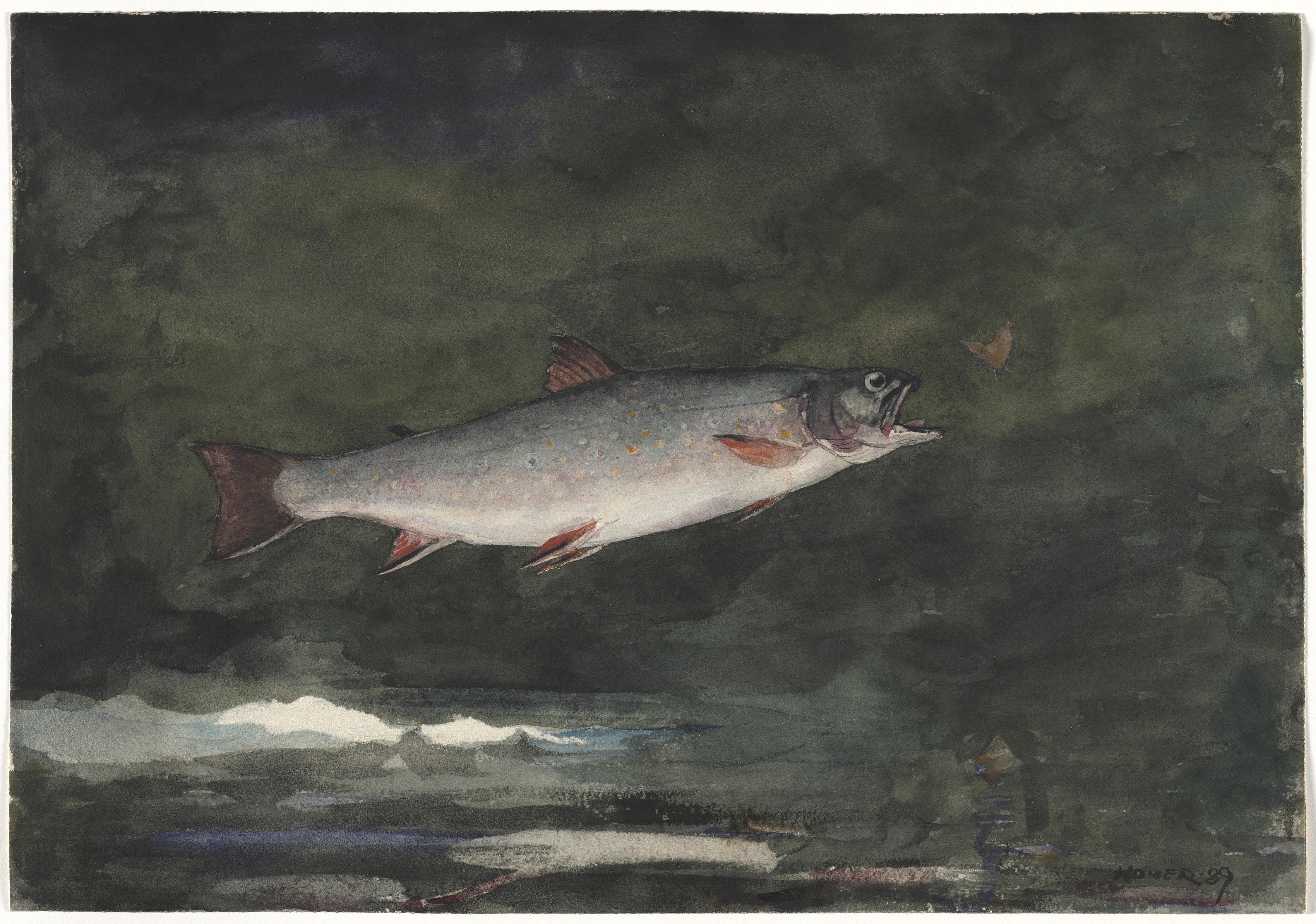
Winslow Homer: Leaping Trout (1889)
" … make way for the next day's fresh blade."
Reviewing my now extensive oeuvre,—an utterly unpronounceable word meaning 'collected works'—I see that I've written this story at least a half dozen times before, probably more. I variously labeled it BegEnding or one of its variants (BegsEnding, etc.), suggesting that an ending often also represents a beginning, perhaps even that endings tend to be infinite rather than definite. They often smear into the next story, to live beyond their pages. This result should not surprise me or my readers, since this operation, my operation, runs on precisely this sort of stuff. Enough never proves to be enough. Doneness doesn't just quit.
It might be that the most valuable element of any of my collections of stories doesn't actually inhabit any individual story or, indeed, any collection, either.
FinalFullDay
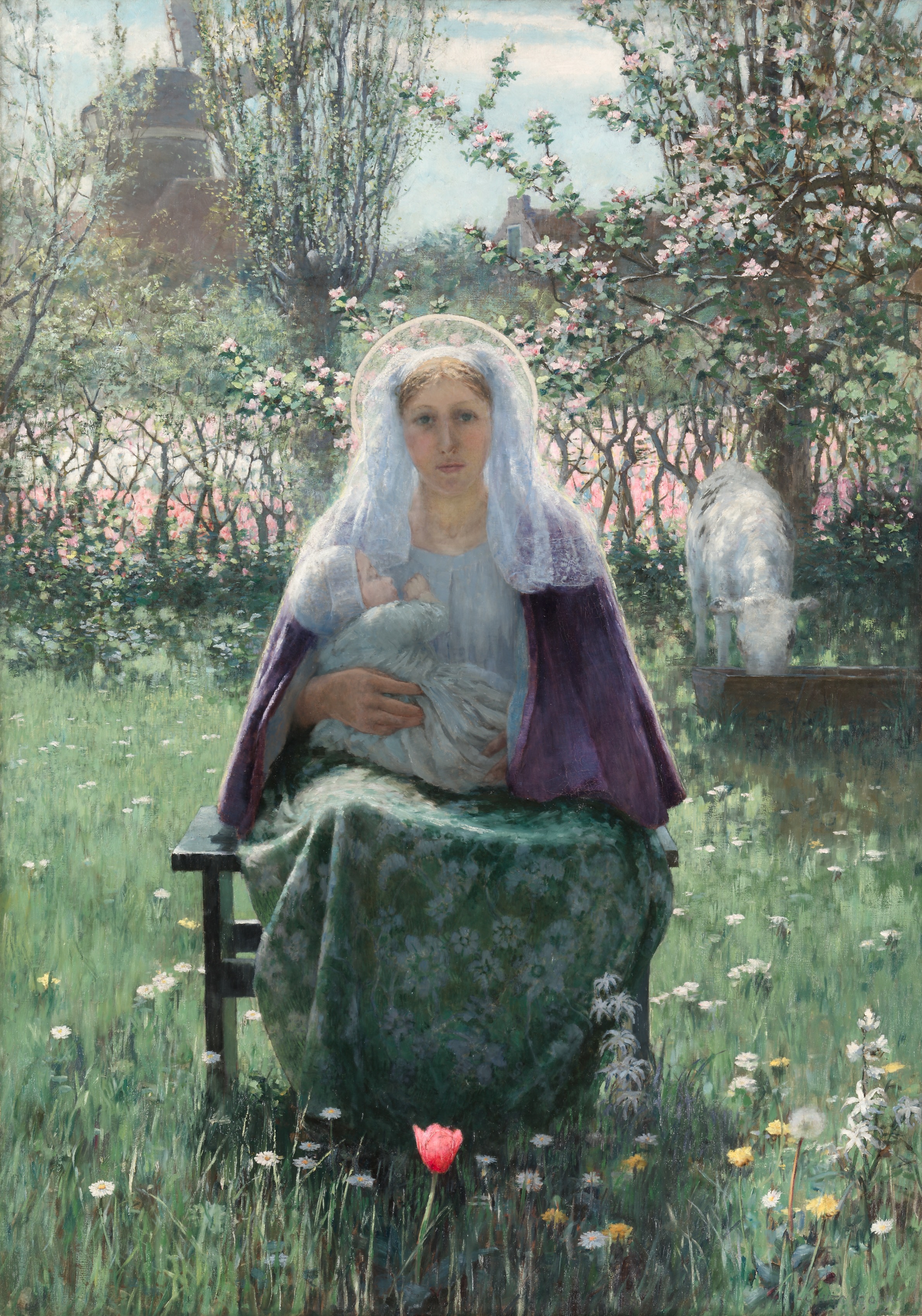
George Hitchcock: The Blessed Mother (1892)
" … trying to find someplace to fit into a finished picture."
What started as an experiment became a practice before changing back into an experiment again: Againing. The once full moon this morning displays only the thinnest sliver of itself, preparing to preside over an equinox, one seemingly delayed a full day beyond its usually 21st of the month appearance, scheduled to show up in this year, 2022, on the twenty-second, thanks, I guess, to the magic of Moon Mathematics. Moon Math can shave as well as add, rendering expected into slightly different forms, recognizable, but never precisely. Expectations come, I suspect, exclusively in regular shapes, while experience tends to slop over edges. We perceive similarities as well as differences, sensing familiar without fully believing when we've found it. Life still seems new, even after so much time spent both on and off the shelf of it. My sense of self still seems unfinished again, Againing.
What did I think I was doing?
ReMounting
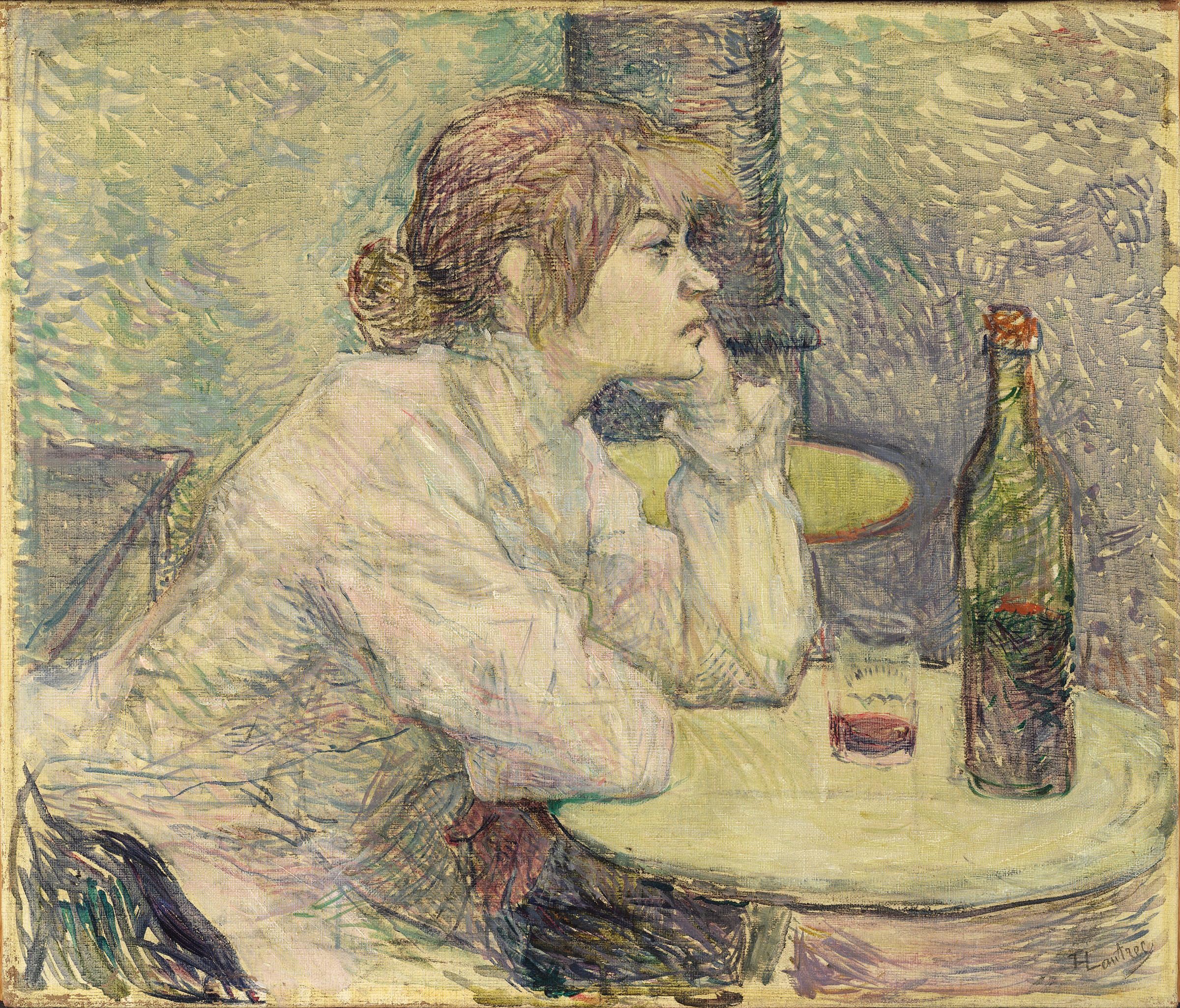
Henri Toulouse-Lautrec:
The Hangover (Suzanne Valadon) (c. 1888)
" … permanently resolve nothing all over again again."
Months later and I still hadn't finished painting that first side of The Villa. I'd innocently believed when I started that I would have completed painting all three sides I'd planned to repaint this year, but I hadn't. I'd become an intermittent in practice. In theory, I almost always work continuously, diligently laboring until I finish a job. In practice, I lose my spot. This year, I could safely blame the weather. Too much rain early, then way too much heat later. Whatever, I could not maintain the natural rhythm of the work, let alone find it. I relegated myself into a odd-lot contractor, unable to reach scale or maintain cadence. My execution was therefore patchy. Oh, the emerging finished product looks fine, as if produced by continuous process, even if it was not. It took more effort as intermittent work than it could have possibly otherwise taken. As I near completion, I watch myself ReMounting that scaffolding one more time.
That first time climbing to the top resolved nothing.
Incompatible
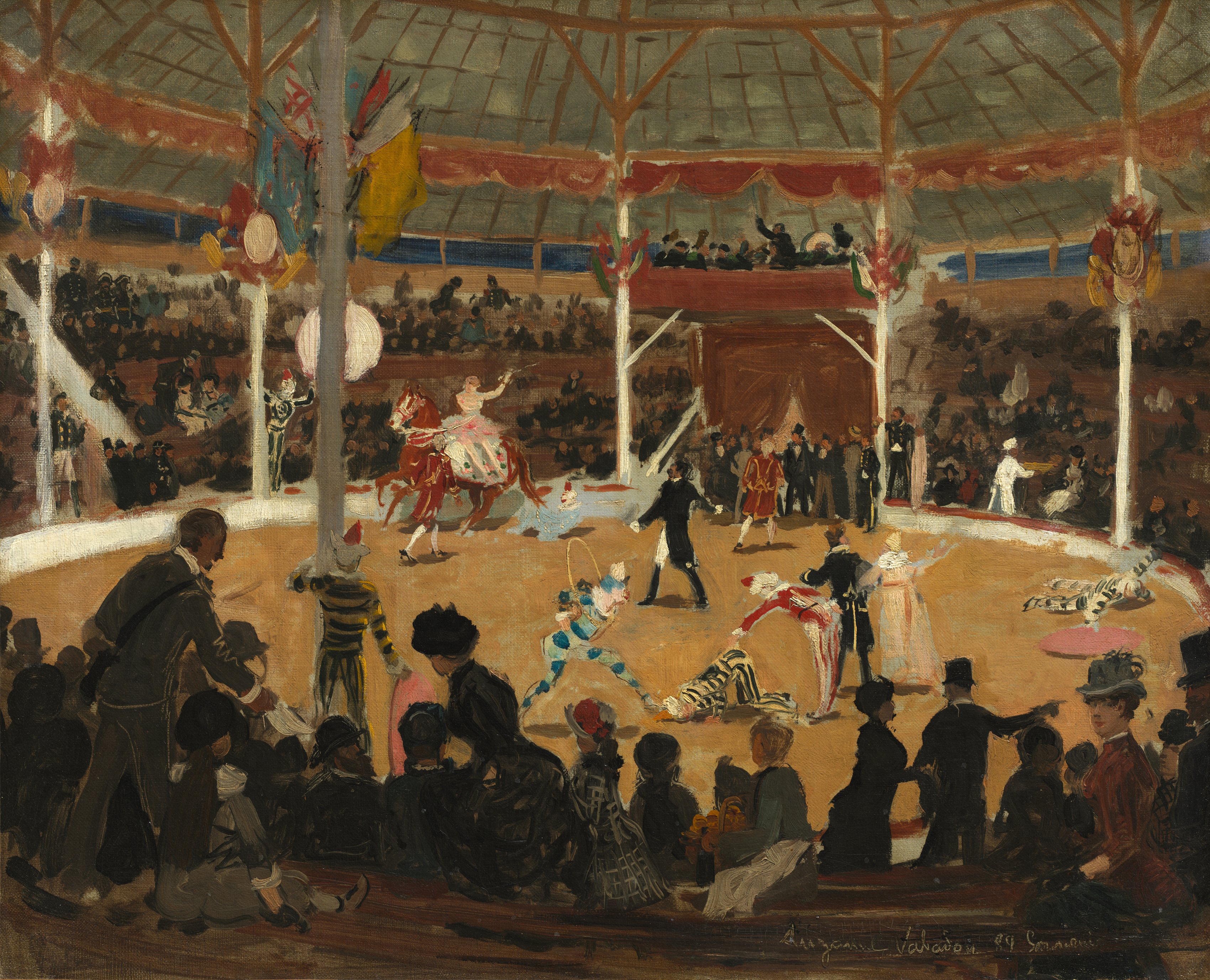
Attributed to Suzanne Valadon: The Circus (1889)
" … our relationship utterly depends upon us making the most generous possible interpretations …"
The Muse and I acknowledged last week that twenty-five years had passed since we met. Anyone might presume, then, that we're a compatible pair, and I suppose we are compatible, but only up to a point. In many ways, we have always been Incompatible. Our stars were never in complete alignment. We each contribute a fair measure of frustration to the relationship. We each have our ways of accomplishing things. Attempts to partner don't always fall apart, but they also don't always work. I've learned to not take these failings very seriously, for that's the point where Incompatibility begins to matter, where it starts breaking down a relationship, tearing asunder. North of serious, things work. South of there, they absolutely don't, and couldn't.
Both The Muse and I were married before, her once and me, twice.
CreatingContext

Hans Sebald Beham:
Adam zittend op boomstronk met appel in zijn hand
[Adam sitting on a tree stump with an apple in his sinning hand] (1519)
" … a seemingly secret path to actually achieving it …"
The Muse had been complaining for months about the trash wood pile on the front porch. The pile, the natural product of last year's Grand Refurbish, needed cleaning up and we both knew that it was my responsibility to clean it up, and yet that job had never risen to the top of my UnfinishedBusiness queue until yesterday. I knew that I'd have to clean up that mess before we could replace the brick pillars around the front porch, but that job had crept into the unlikely category as Summer threatened to turn into Fall. It was supposed to start in Late August. Further, just that morning, Our Carpenter Joel, in his role as prime contractor for the repillering job, had reported that the contractor he'd lined up last Spring had gone incommunicado, apparently communicating by not communicating that he'd decided not to do the job after all. Suddenly, there was even less urgency to clean up that pile.
It's not that I hadn't contributed considerable brain power to considering how to satisfy The Muse's request.
UnfinishedBusiness
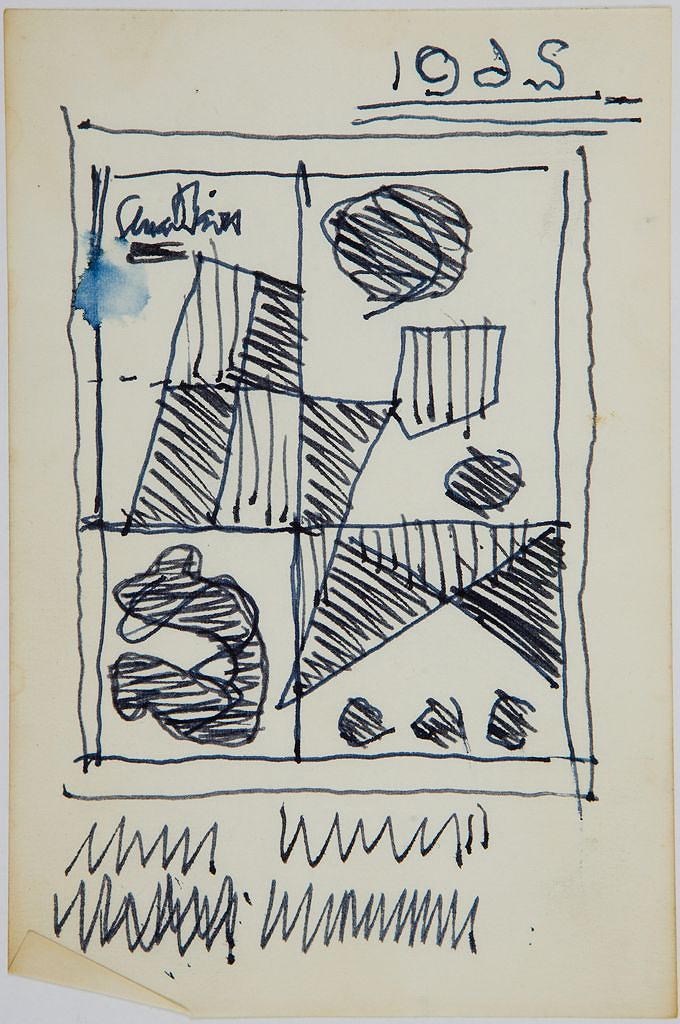
Stuart Davis: Study for “Unfinished Business” (1962)
" … one stumbles back out of what one stumbles into …"
The end of a season invites in the auditors to assess progress made. Nobody wants a disappointing auditor's report, but some seasons, conditions seem to conspire against success, against progress itself. For me, this result typically happens when I've managed to accumulate more obligations than I can successfully juggle. It never takes much, more like it tends to take no more than an ungainly mix of even small stuff. A single procrastinating act might set off a cascade of small avoidances which quickly accumulate into an overwhelming backlog, one which appears beyond anyone's means to dent, let alone to clear. This accumulation becomes my burden, invisible, perhaps, to everyone else, but front row center prominent for me. It weighs extremely heavily upon me, encumbering everything I attempt, dissuading me from even trying to clear the scales.
The Muse notices but wisely mostly declines to mention.
WindingDowner
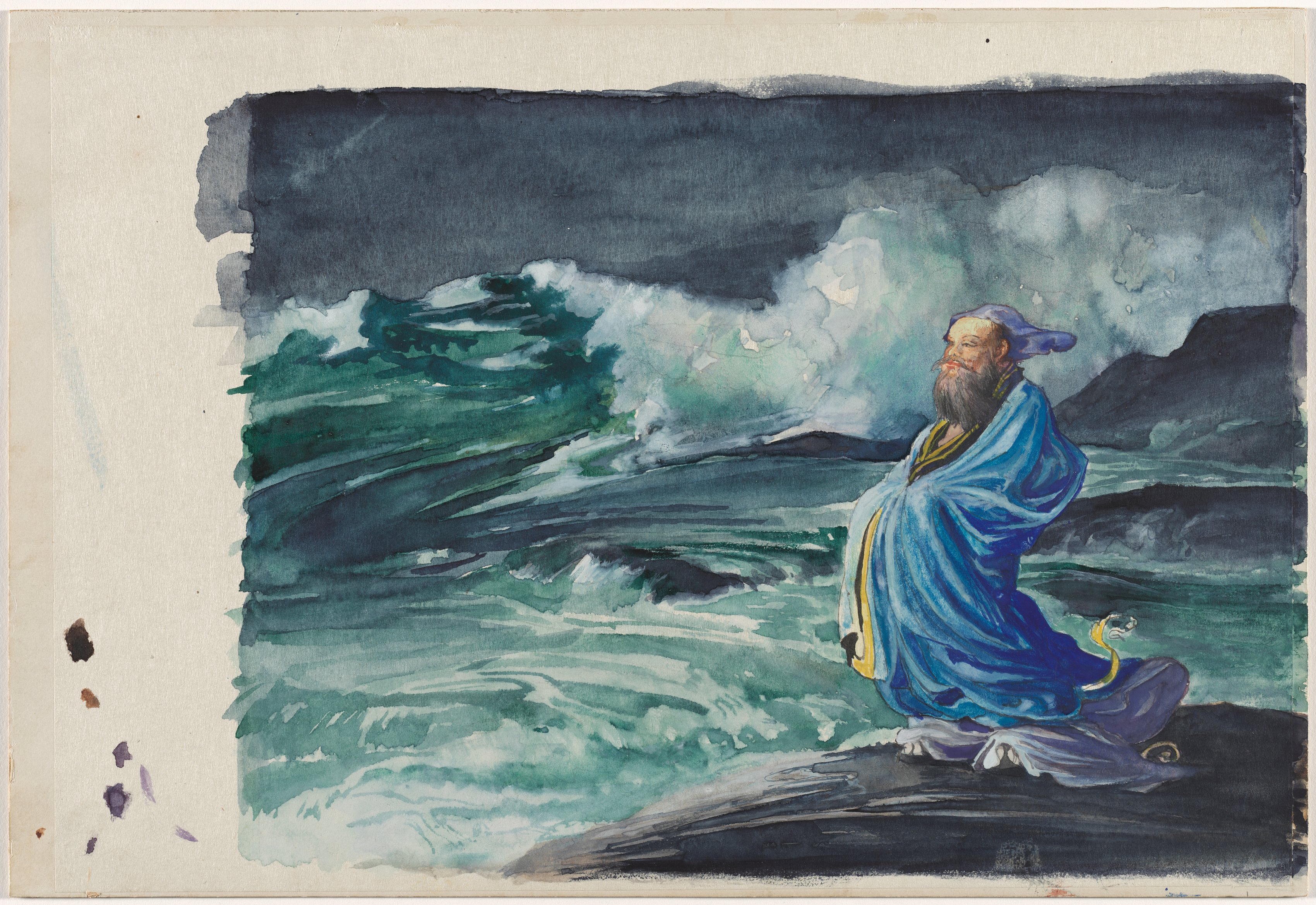
John La Farge: A Rishi Stirring Up a Storm (1897)
" … in preparation for an on-time arrival."
The two most dangerous parts of every airplane flight come at the beginning and at the ending of the flying. The flying itself, once aloft and leveled off at cruising altitude, becomes pretty routine, but both beginning and ending observe what the regulating authorities call Sterile Periods, where, by law, crew must remain focused upon their responsibilities. No chit chat and no playing mumbly-peg in the cockpit. Beginnings and endings remain serious business. Writing's no different, and, I suppose, if I researched any profession, I'd find a traditional respect observed for beginnings and for endings. An innocent oversight before departure can bloom into a crisis once away. In some ways, I suppose that every profession amounts to life or death since none of the time any of us invest proves to be refundable. We hasten slowly when starting and no more quickly when coming back to Earth.
This Againing Series, begun in sublime ignorance almost three months ago, has started making noises like it's just about ready to land at its destination, wherever that might be.
Adaptigrating
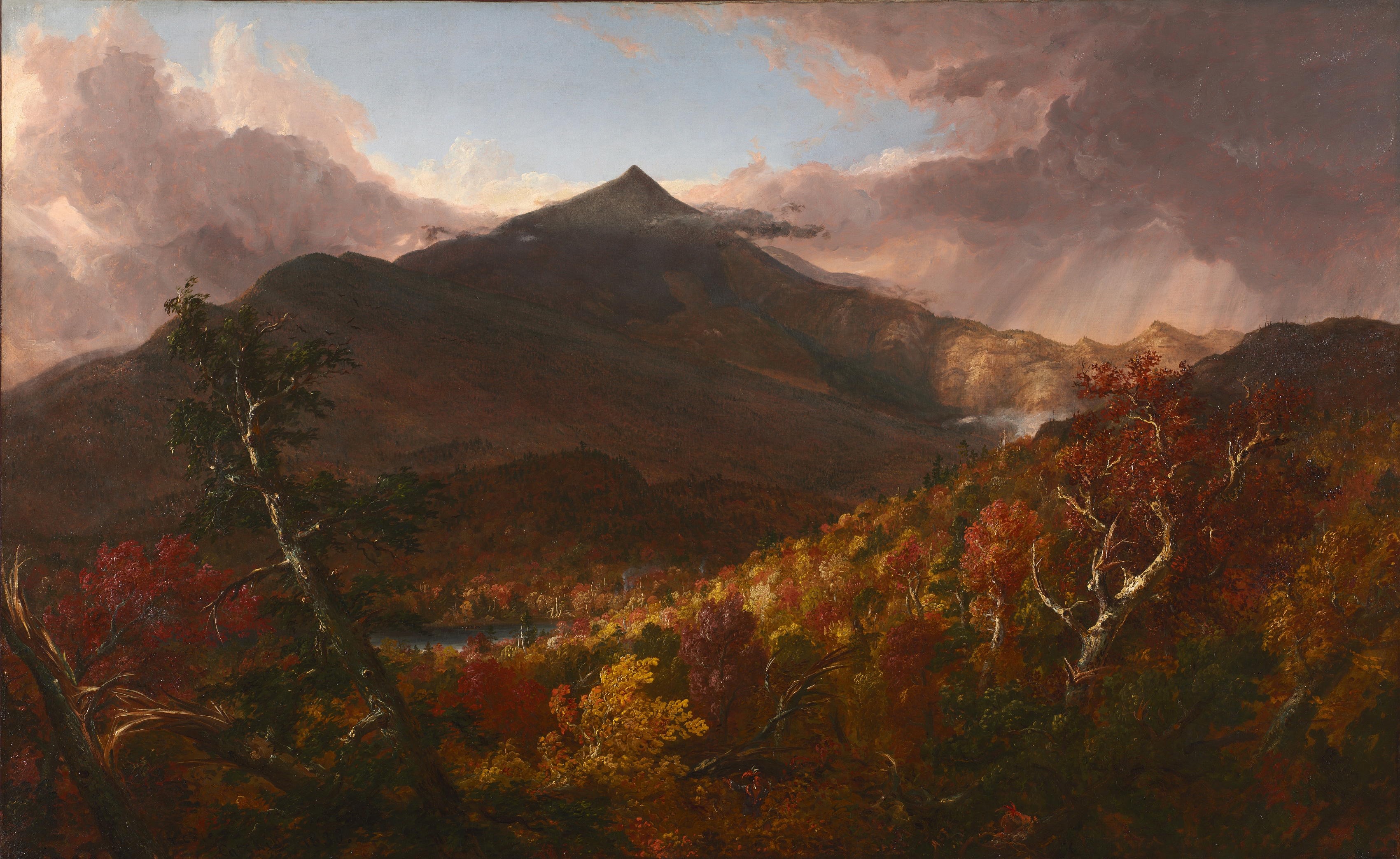
Thomas Cole: View of Schroon Mountain,
Essex County, New York, After a Storm (1838)
" … appearing more or less unbidden, wet and fearful …"
Anyone insisting that they grew up in the Good Old Days was not paying attention then. The Old Days I hail from would not nearly pass muster today. It was impossible then to find a decent loaf of bread in wheat country, and even the largest cities lacked a decent cup of coffee. People smoked with impunity and drank Coke® without irony. We might have gone to church each Sunday but we went right back to our same-old secular ways come Sunday evening. We were innocently and ignorantly every -ist in today's playbooks, and damned proud of it, mostly. Say what you might about 'wokeness,' but its precursor amounted to worseness, and we are as a people and as a culture getting better, as they say, with few notable exceptions.
Conservatives thrive on the Good Old Days Myth, though a myth it most certainly remains.
Smoked

Salvator Rosa: Philosophy (1641)
Inscription: "Keep silent or say something better than silence".
" … they remind us how blessed we remain once their curse has fled."
The late summer forest fire has become a defining event in the Great American West. If not by the end of August, then certainly by the end of September, an incident will light some woodland on fire and the resulting smoke will set about obscuring sun and sky. For days or weeks, no sunrises or sunsets grace the time. Horizons shrink. Even the foothills a short distance away disappear into thick haze. Latitude for action shrivels, too. Driving comes to seem dangerous, perspectives narrow. After perhaps weeks spent hibernating from extreme heat, the smoke seems to add insult to indignity. I ache then to free myself from this place of my liberation.
It's certainly Heavenly here, or as close to Heavenly as I've yet experienced here on Earth, yet even this Eden hosts its apples and serpents.
Illness
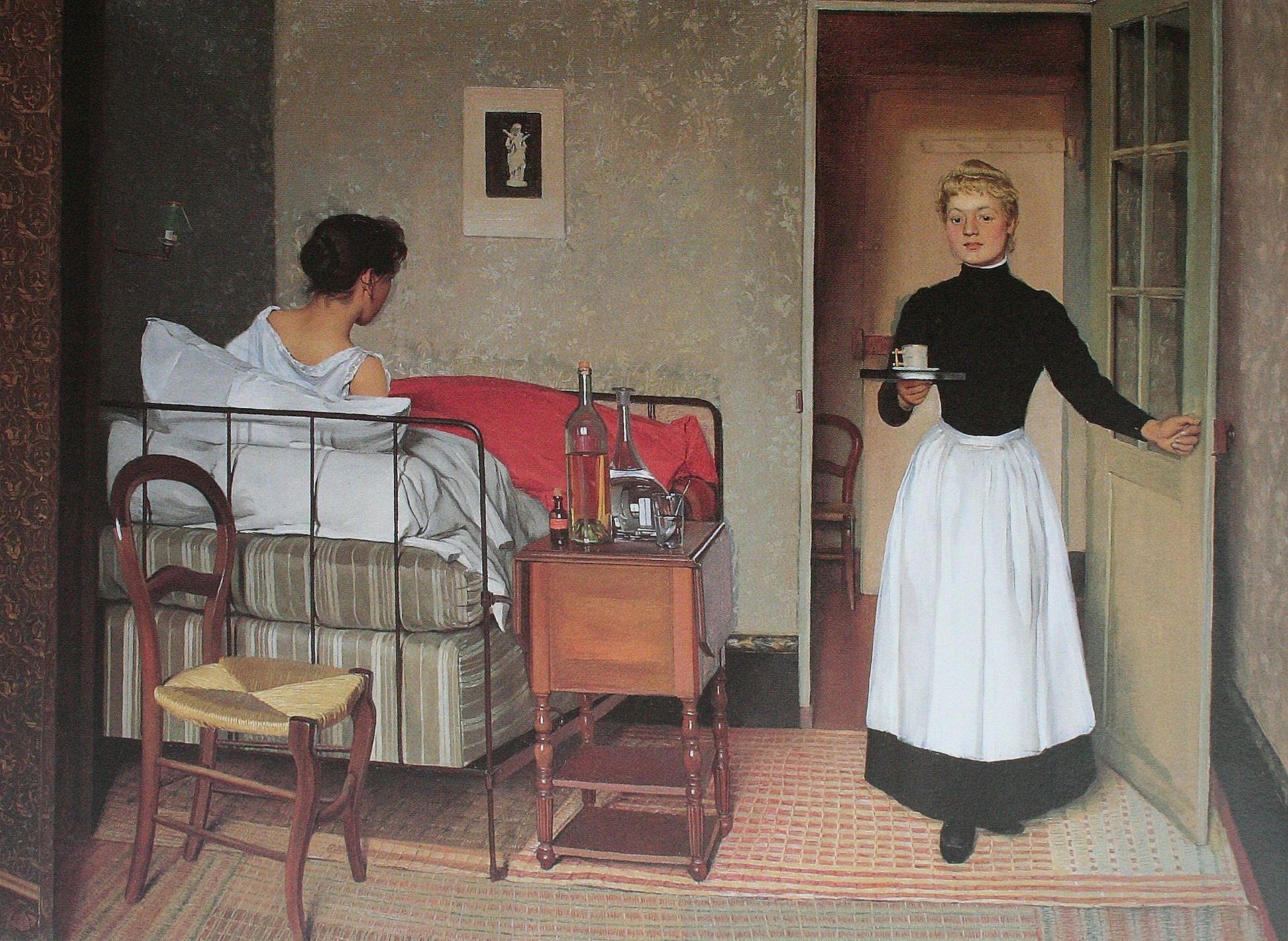
Félix Vallotton:
La Malade (The Patient): Hélène Chatenay (1892)
"This Illness does not render her any more special than she already was, which was always considerable."
Illness seems different and distinct from mere sickness. Sickness seems an interruption, something contracted then resolved as a matter of course. In most cases, one simply recovers from the flu without long-lingering symptoms. Illnesses seem unique in that recovery's not presumed. They typically do not just take care of themselves. They need treatment. Sometimes, a course of medicine counterbalances the intrusion; often, more extensive interventions: surgery, quarantining, physical therapy, hospitalization, psychological counseling. Some of these responses might continue for the rest of the patient's life while others come in passing. One does not necessarily ever recover from an Illness. The Parkinson's my mom contracted at sixty was still with her when she died at ninety-something, though it had progressed considerably from its beginning as a questionable quivering into a totally debilitating presence. A person might be rendered free of cancer, but they're not considered "cured" until cancer-free for five years.
The Muse found a lump in her throat and to her credit, she followed up on it. I consider this act courageous.
Backdooring
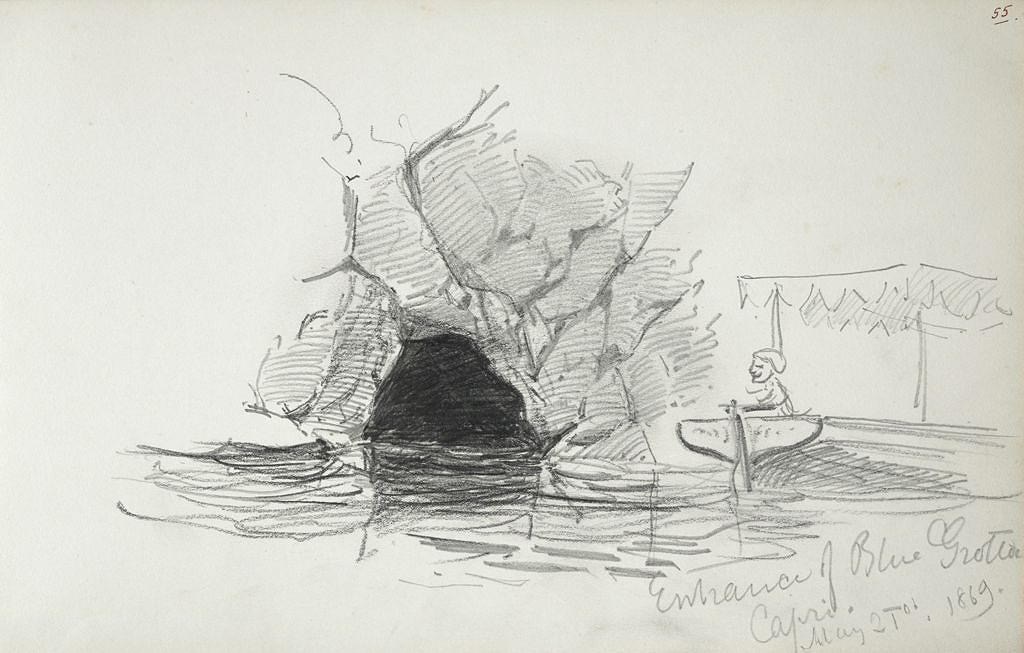
John Singer Sargent:
Entrance of Blue Grotto, Capri (May 21 1869)
"Wider recognition only spoils the intention."
The Muse and I have been trying out new routes between our heres and theres. Most prominent at the moment, a route through Washtucna, a town of little note and far less substance. Access comes via two lane blacktop, up through the very least densely populated portion of our county and into an even more lonely stretch in an adjacent one. The road twists unconscionably, which makes for slow going. Yet we've taken to making our way up the Road To Washtucna wherever we head West, toward Seattle. Faster ways exist, though none shorter. This route features no semi-trucks, the bane of every traveler's adventures. It's a backdoor route, one not obvious to first-time tourists and uninteresting to those who equate freeway driving with freedom. We can toodle our way away and back again without any fear of anyone spotting us getting away or returning. We're Backdooring.
The older I get, the less interested I seem to be with status and notoriety.
Aspect
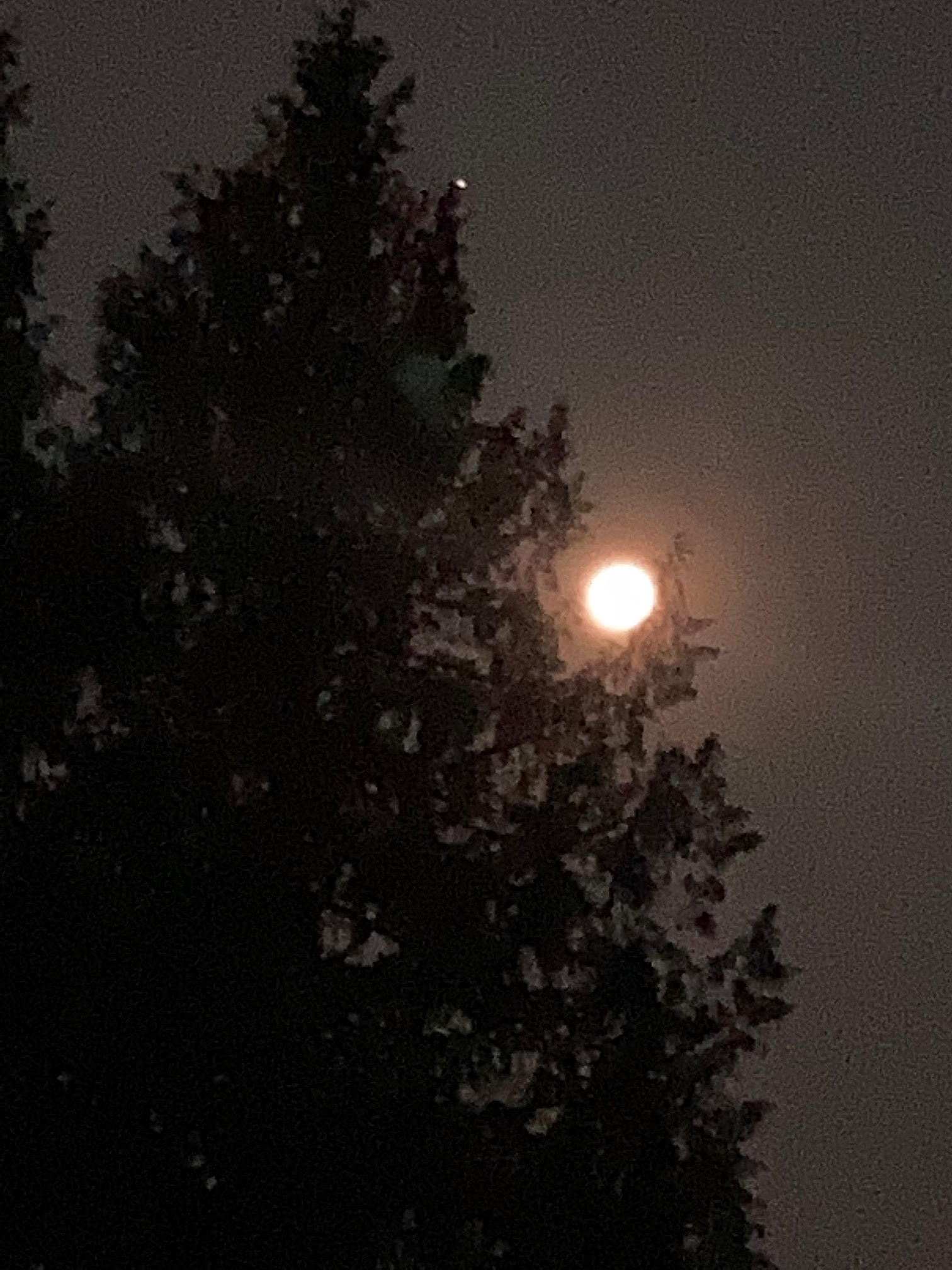
Moon over Stevens Pass 9/11/2022, 3am
" … conspiring to escape my defenses …"
Up in these woods, this weary world seems fresh. A full moon crawls beyond a sixty-foot cedar to stare down unblinking upon my very early morning doings, and finds nothing wanting, nothing awry. All seems perfectly right with this world in this moment, travails intact, problem unsolved. The Aspect here precludes the usual fears. I feel suspended above and safely beyond wanting. All seems calm. All bright.
The Muse announced the presence of her cancer in a brilliant social media post, one which nobody who knows her could have possibly mistaken her not having been its author.
Offlining

Salvator Rosa:
Diogenes Casting Away His Bowl (1661–1662)
"I might be someone other than who I pretend to be …"
My great great grandmother, born in the eighteen forties, lived to be almost a hundred. During her life, she experienced in her youth a medieval-quality existence as an immigrant on two great migrations from New York into Florida following Gadson's campaign and then on into Texas. As a young wife, she traveled the Oregon Trail clear to Oregon on horseback. By the time she died, WW2 had ended. People were flying. Just a few years before I was born, this world had already invented most of what we would readily recognize today, but in more primitive forms. Now, all those newspapers and magazines, radios and televisions visit us via a single medium, one we carry access to with machines small enough to comfortably fit into a pocket and powerful enough to utterly distract us from ourselves. My great great grandmother was a life-long pioneer. Her great great grandson, a slave.
I admit my addiction.
TheReveal
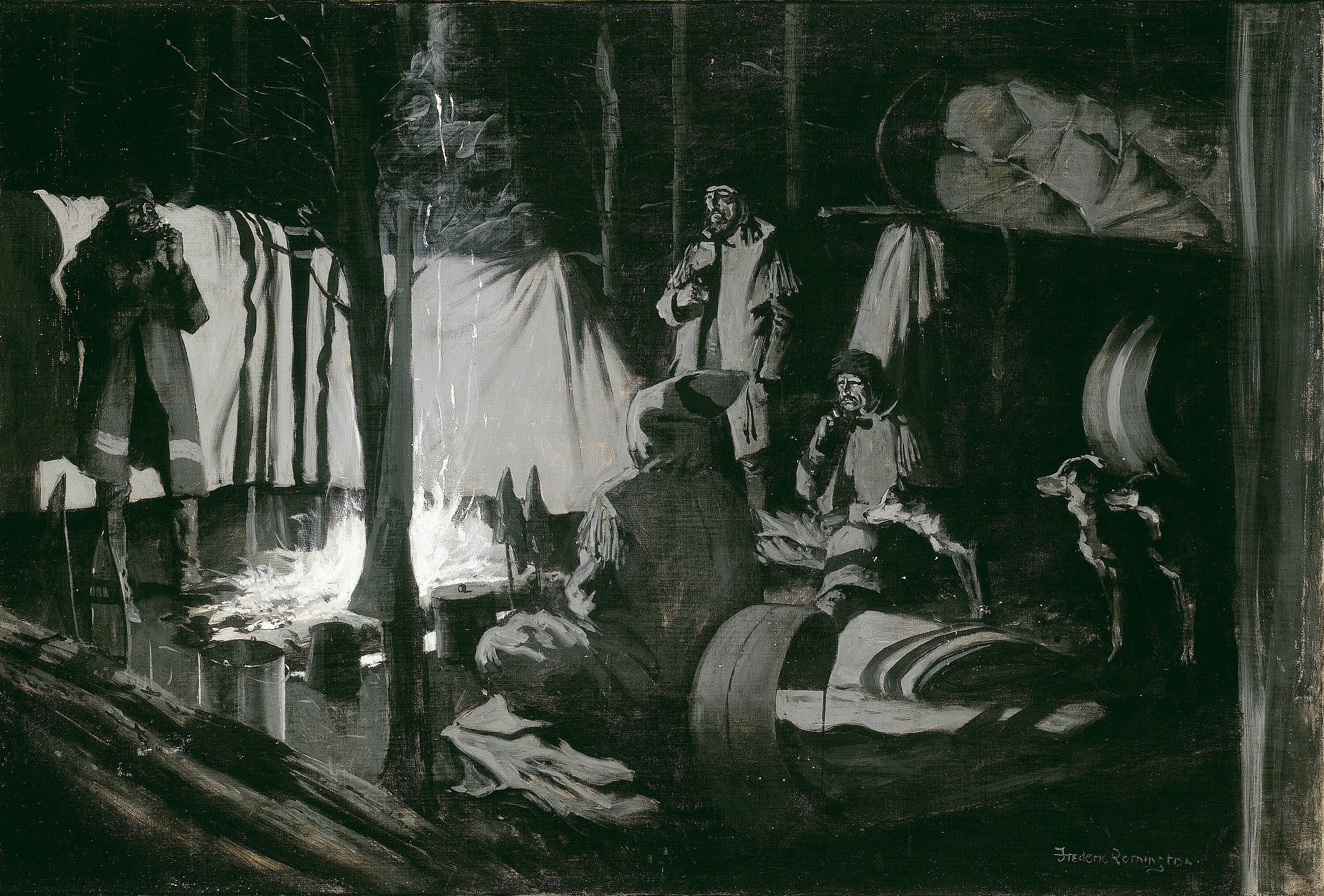
Frederic Remington: First and Best Camp of the Trip (1895)
"Each a detective, none a master."
We believe in TheReveal, that whatever mystery harasses us, we will eventually come to understand and thereby resolve it. This seems an inherently naive notion, since this world, this universe, seems more vast than even our imaginations might ever grasp. Still, we entertain and employ ourselves seeking answers, often to the wrong questions. We collect pieces to these puzzles in the belief that we might one day fit them together and release the tension. In Hardy Boy novels, this release came about in TheReveal chapter, where all the story's threads came together to affect resolution. The reader would learn who done it? and the perpetrator would be carted off to jail. Frank and Joe might receive the heartfelt if slightly surprised appreciation from the police chief or their detective dad, then go on to stumble upon another mystery needing resolution.
I am here to reveal that life does not often work like that.
RealChange
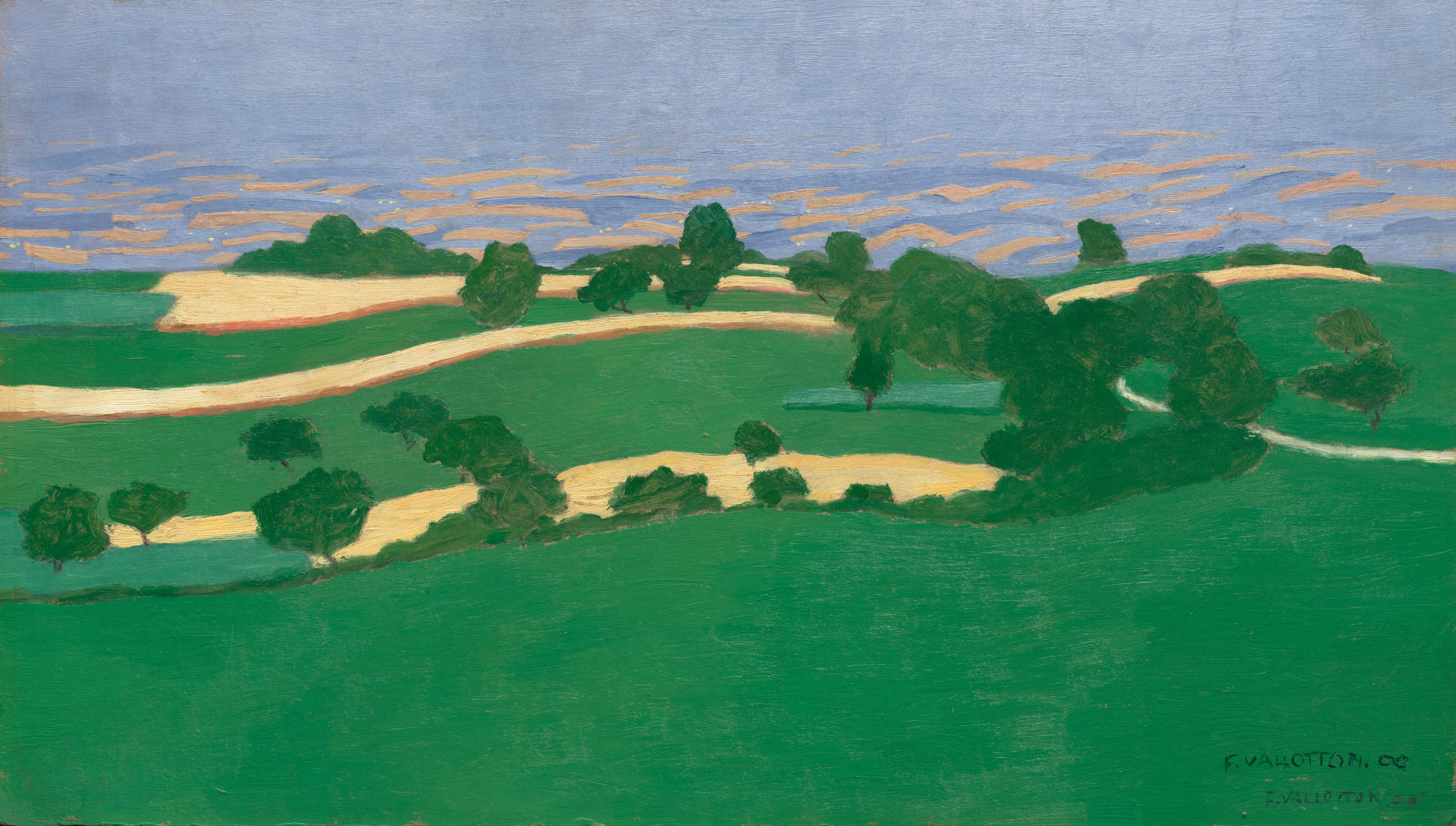
Félix Vallotton: Corn Fields (1900)
"Things will never be the same again."
Change seems the real constant in this world, in this life. Stasis seems impossible, yet we're weaned to wish for difference, not stasis. We genuinely fail to see the essential contradiction in our constant striving for change, RealChange. I doubt that I would recognize the real McCoy if it sat on my face. The real McCoy might look more like nothing different at all. It might seem so familiar as to appear utterly unimportant. Remember when The Damned Pandemic forced us all to take up a sedentary lifestyle, always staying home, rarely roaming anywhere? That was a real and significant change to which many reacted by feeling bored and uninterested. We ached for the same old and called that different. Change seems the constant, constancy the real difference.
The Muse and I are poised upon the cusp of a significant change.
Becausing

Attributed to Frans Pourbus, the Younger:
Profile Portrait of a Lady (1569 - 1622)
"Just let that mystery be."
Because belongs to that august class of words which carry no specific meaning. It seems to mostly play the role of placeholder, standing in for some more substantial explanation. It pretends to explain something, but utterly fails, except in omission. It seems to say, "Don't ask. I cannot tell," more of a brush-off, really. In the absence of a root cause, just say, "Because," just because.
Psychologists insist that we become more or less the sum total of our explanatory stories.
Dazing

Rembrandt van Rijn: Old Woman Sleeping (c. 1636)
" … done Dazing for this waning season."
At this latitude, summer changes like a supertanker turns, in a wide, almost indiscernible arc. I might be excused for thinking the first hints mere feints, practice moves with no conviction behind them. Slowly, excruciatingly slowly, though, the easy mornings finally give way to presenting high fifty degree temperatures and I gratefully don a sweatshirt and happily bid goodbye to my sweaty pillows. As almost unbearable as the nights have been, the days have been absolutely overwhelming me. If I was not done with my outside chores by eight, at the very latest nine am, I could forget about completing them that morning. I might occasionally squeak in an additional couple near the end of the day, having by then once again grown somewhat accustomed to the insult to the point where I could complete 'em in hundred degree shade. The bulk of my August days were spent Dazing, in hot weather hibernation, idly gazing, almost dozing. It was my final defense.
Let the record show that I didn't completely collapse, however otherwise misleading appearances might have seemed.
Laboring
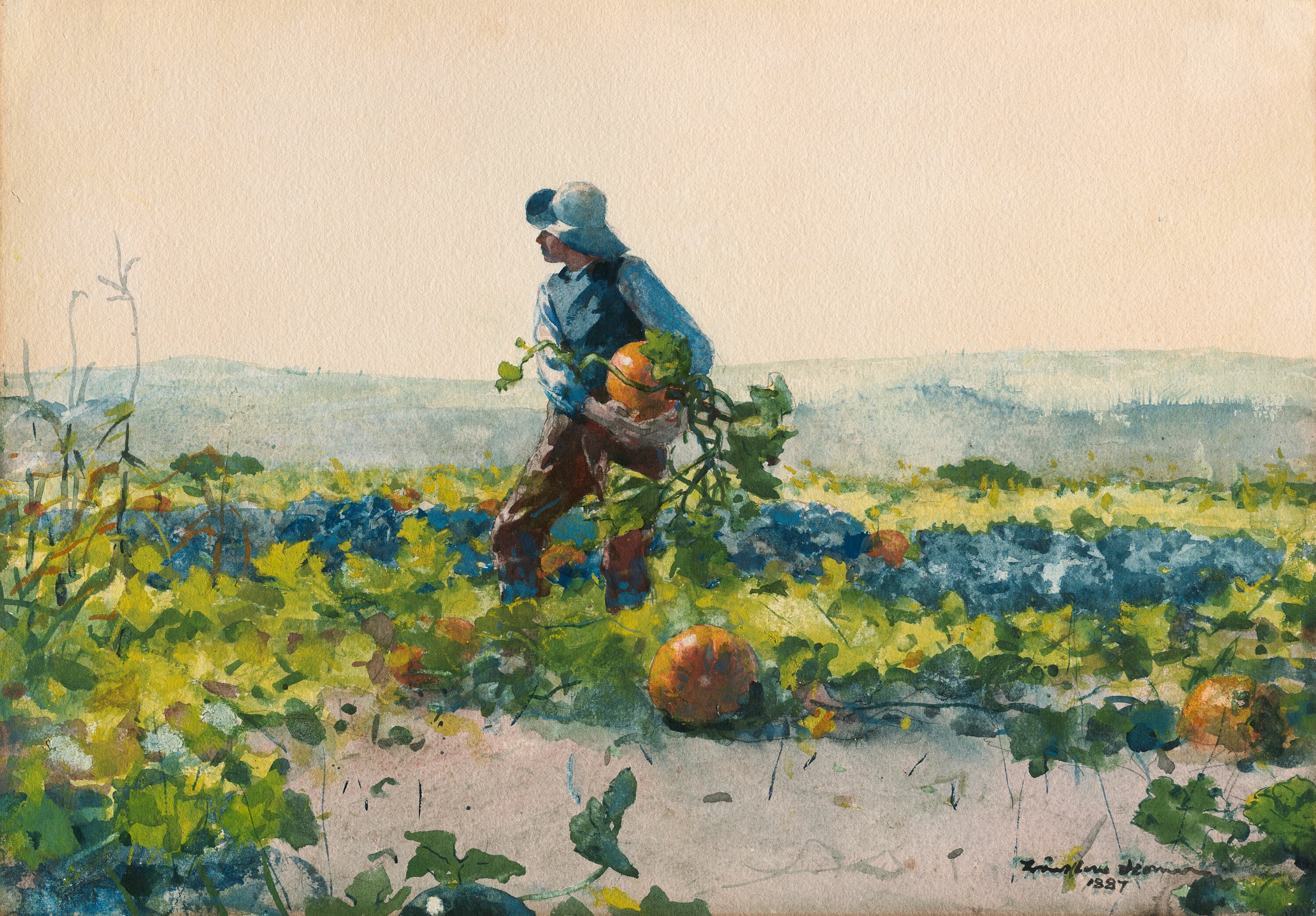
Winslow Homer: For to Be a Farmer’s Boy (1887)
" … we observe it from a safe distance in the shade."
Labor Day might be the only holiday we do not celebrate. Oh, we observe it, or we certainly try to observe it, but something in the American character steadfastly refuses to celebrate Laboring. Our native Yankee genius has always been attuned to figuring out ways to avoid Laboring instead, and specializes in producing labor saving devices. We secretly consider anyone laboring to either be a convict, sentences to a term at "hard labor," or a fool, too simple to concoct a way to avoid the sweaty stuff.
We paradoxically, though, claim to revere the hard worker.
Pa

Hercules Seghers: Enclosed Valley (c. 1623–30)
" … I love my overalls …"
Years ago, when my son was barely one year old, my first wife and I bought our first house. It wasn't much. Two bedrooms featuring peeling wallpaper, worn paint, and a basement given over to cobwebs and mouse poop, but we set about fixing it up, though neither of us considered ourselves qualified. The interest rate on the mortgage was fifteen and a half percent, the best we could bargain for under Reagan's grand prosperity strategy, which left us feeling as if we'd landed in the middle of The Great Depression. The old guy we'd bought the place from left a weary pair of overalls on a basement shelf. I washed them up and tried them on, never having previously had the pleasure, and took to wearing them as I labored around the place. As often happens for me, that clothing imparted a new identity to me. I became 'Pa' whenever I wore them, a character loosely based upon an actor in a popular television series at that time, The Waltons.
I guess I needed a role model and imprinted upon him.
NextChapter
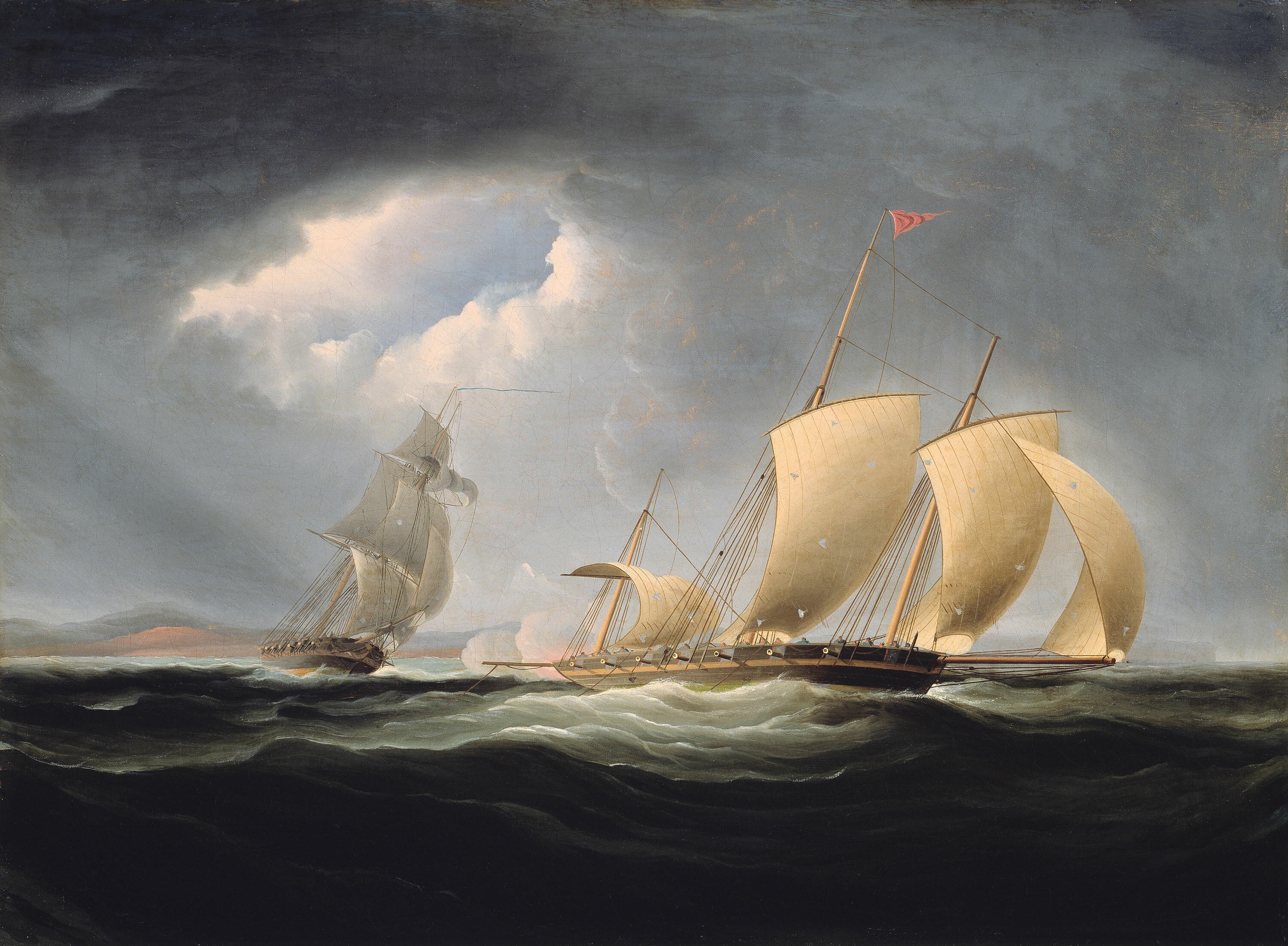
Thomas Birch:
Capture of the Tripoli by the Enterprise (1806/12)
" … I'll still already be gone by then."
My experience of this life so far strongly suggests against the existence of sequential anything. Sequential seems a hypothetical, one possible alternative rarely actually encountered; a theoretical, all things being equal, when things only very rarely end up being very equal. I skip around instead. I might set off in some definite direction, following the simplest of instructions, but soon encounter some distraction, some unexpected abstraction needing fleshing out. The road not taken seemed the very soul of straightforward. The road actually traveled seemed to have meandered.
Oh, plans rely almost entirely upon sequential construction.
Anti-
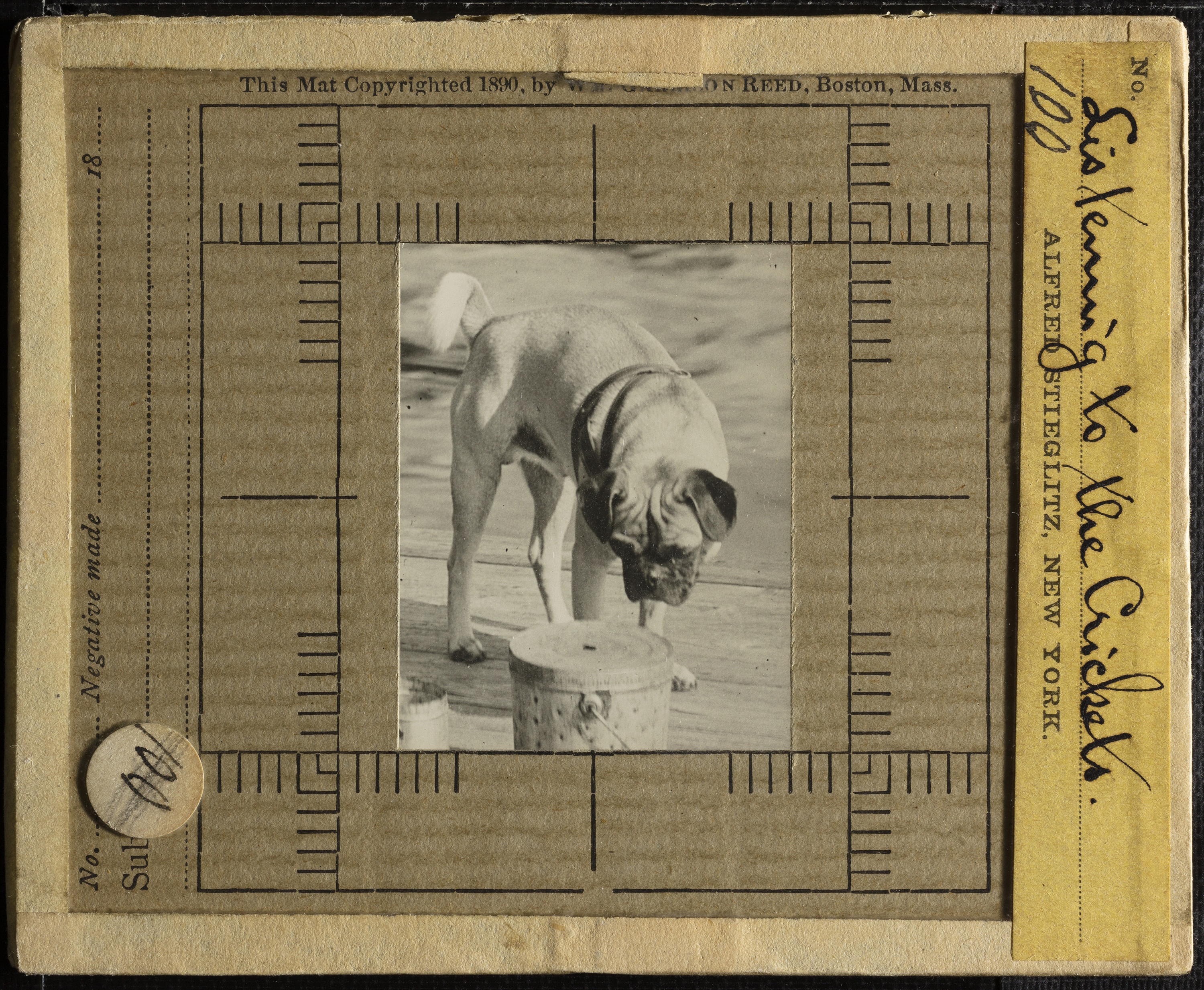
Alfred Stieglitz: Listening to the Crickets (c. 1900)
"Impossible and necessary …"
I this week declared myself Antifa because I consider myself vehemently anti-fascist. Who wouldn't be? An old acquaintance called me out, noting that a shadowy group considered to have been responsible for much anonymous street violence travels under the Antifa label, but then so, too, does a deeply anonymous collective of hackers who have uncovered considerable elite wrong-doing, and so, too, does a loose association of equality-seekers who protest financial elitism, which seems the very soul of fascism. The problem might lie in the Anti- label, what philosophers refer to as the 'negative space' identifier. Yesterday, as my dentist fitted a new cap onto one of my molars, he asked me to try to determine if it fit properly, a state I might recognize because I wouldn't notice any difference when I bite down. A positive space target would have provided an experience from which to judge success rather than the absence of an experience. We worked until I decided that I couldn't feel any difference, but I left with doubts that I'd succeeded in properly reporting success. Negative spaces work like that.
My Anti- feelings toward fascism fail to characterize what I'd consider an adequate replacement for fascism's presence.
FairWeather
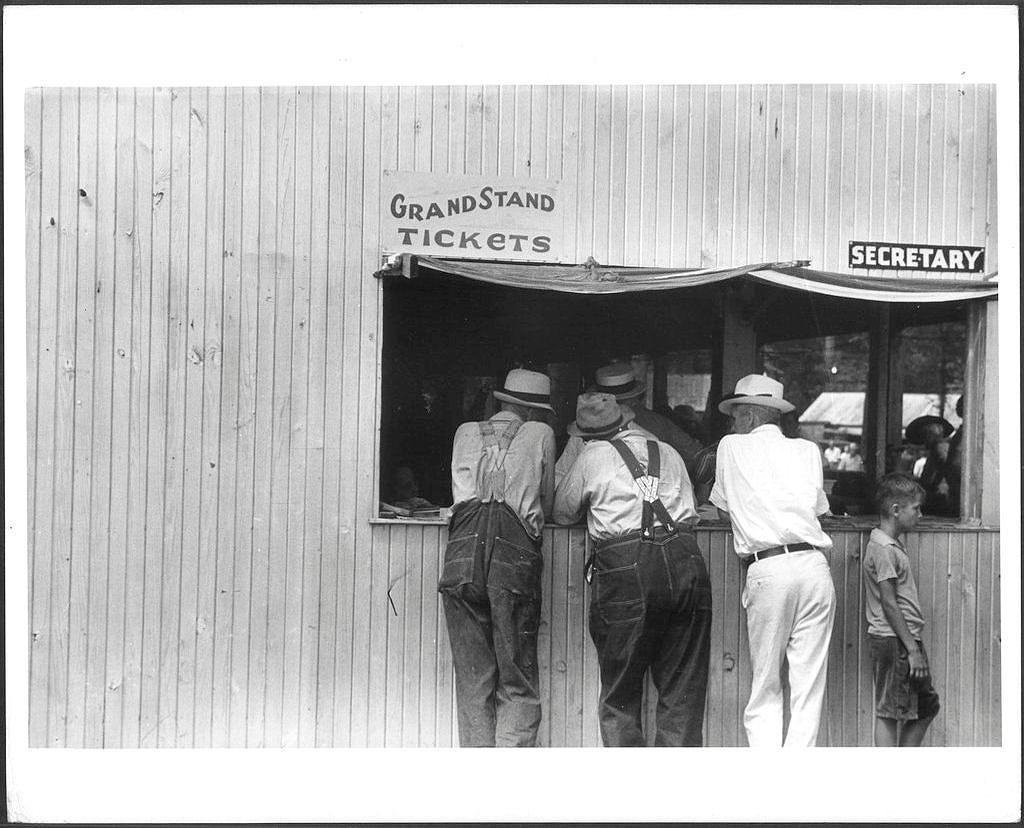
Ben Shahn:
Untitled [county fair, central Ohio] (August 1938, printed later)
"Nostalgia seems a much more reliable companion …"
Summer's finished. It just doesn't quite realize it yet. As if to demonstrate its remaining vitality, the temperature pushed a hundred again, but the people long ago grew accustomed to even that extreme. They stream to the Fair, regardless. So do The Muse and I. We come to work the Democrat booth, a fabled responsibility. Occasionally, some delusional Q fan or Trump supporter has been known to wander by and harass whomever's working the booth, so we're wary. Cowboys wander by with smirks on their faces and "Brandon" on their lips, quietly shaking their heads as they pass. Our people stop by carrying their enthusiasm with them, grateful for our presence. It's not paranoia if they're really out to get you. They're really out to get us.
The booth has a grandstand view of the fair's entrance, a broad sidewalk where everyone entering must pass.
Resettling
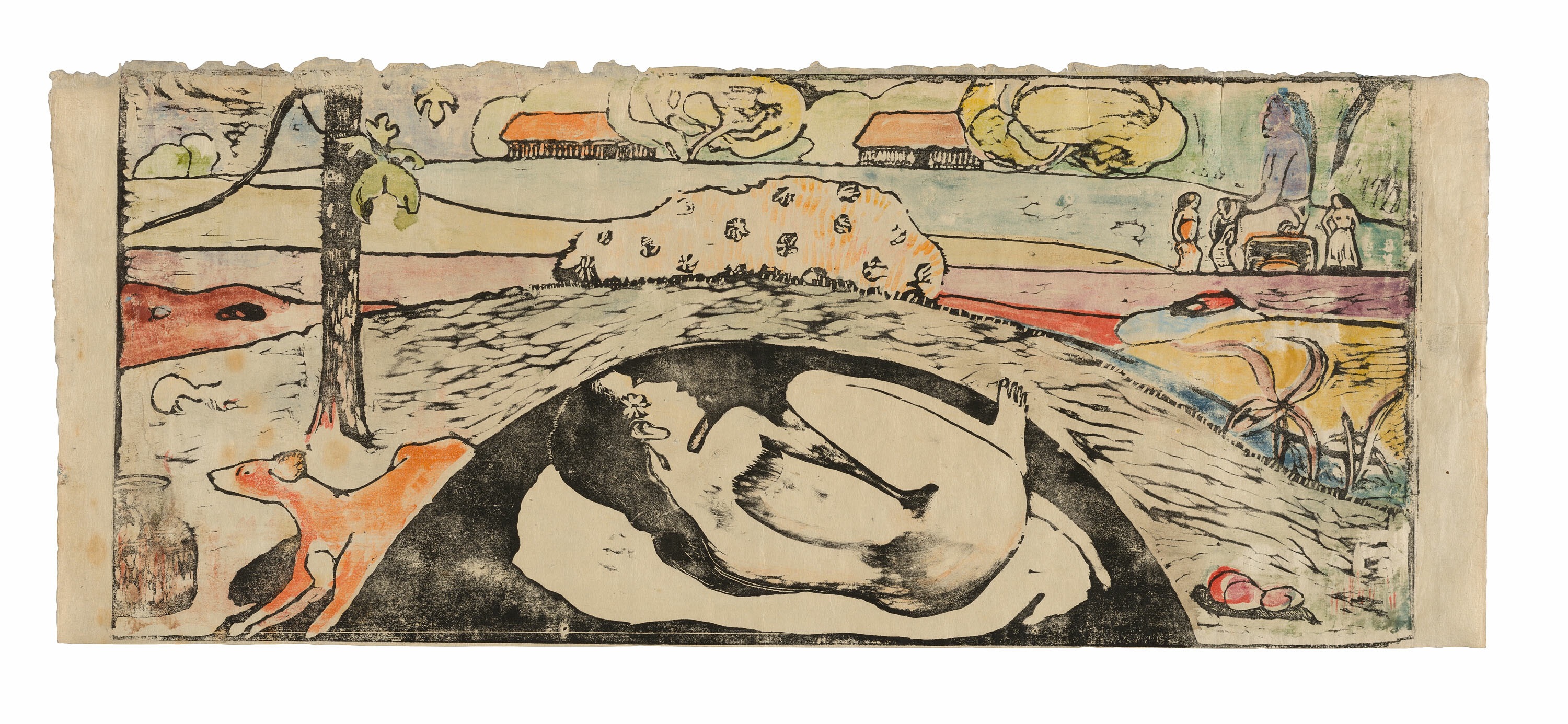
Paul Gauguin:
Manao tupapau [She Thinks of the Ghost or The Ghost Thinks of Her]
(1894/95)
"The playing field suddenly seems wide open."
I peeked into The Muse's office yesterday and found her desk barren, her large display monitor and high speed printer gone, returned to The National Lab as a sure sign of her retirement. We returned to a different place than we left. Further, we returned different people than the ones who left, too. The cats were the first to notice. We came as ghosts and, once familiar patterns disrupted, neither cat seemed to know what to do with our presence. It took a day for them to switch back, or really attempt to. The house, too, seemed changed. Absent the presence of The Muse's career responsibilities, the place seemed more open, freer. It would take some Resettling to settle back in here, though I wonder if there might not be any real back to begin settling into. This rehabitation might well be an invention.
People our age refer to their forever home.
HotPillow

Ary de Vois: Jacob’s Dream (1660 - 1680)
" … just as long as I don't have to make a steady habit …"
The Muse admits to being a hotel snob. After all those years spent working for the lab, through which she most months traveled at least a few days, she developed certain standards, certain expectations for what a hotel should and should not provide. Because she stayed at first class hotels when traveling on business (Why not? She received the government rate!), her previous minimum standards shifted upward. Believe me, we've stayed at some marginal digs, the kind author James Elroy referred to as HotPillow joints, implying that their primary business might not be providing places of rest but of salacious exercise. Few experiences prove quite as upsetting as discovering, typically at about three in the morning, that your sleeping room is adjacent to a brothel. This sort of thing rarely happens in your higher class lodgings, but probably only because they feature more effective soundproofing.
Now that The Muse has retired, she loses some of her previous perks, government lodging rates among them.
Trans-IT-ioning

Caspar David Friedrich:
The Woman with the Spider Web between Bare Trees (1803)
" … deferring arrival into our future together …"
The Muse retired three days ago, but because we haven't arrived back at The Villa Vatta Schmaltz yet, she's still Trans-IT-ioning into whatever she will next become. The traveling days serve as a buffer, allowing us both to try on fresh identities, and I say "us both" because while she's retired, my role changes, too. One cannot change any element within a tightly-bound system without also effecting every other piece, and our relationship's no exception. The Invisible Husband might not have retired, but his role significantly shifted with The Muse's. I think it a significant blessing that we're sort of dawdling our way back home, since it provides an opportunity to stumble across a fresh identity or two and try them on along the way. These things take time.
We visited The Golden Spike National Monument on our way through Utah, perhaps a premise to extend our Trans-IT-ioning, but a worthwhile one.
TakingTime

Weegee (Arthur Fellig): Weegee by Weegee (c. 1953)
"a thief for this day"
The outward trip insisted upon arriving "on time," for we travelled with purpose. The Muse had obligations, presentations to perform, and she could not afford to be tardy, so I drove as if MakingTime. Returning, The Muse freshly retired, urgency seemed to have been bled out of us by then. She lazed around until she was good and ready to get up, and I patiently played along. I felt anxious to get back, as I always am on the return leg of any trip, home calling, but she seemed in no hurry so we began the day's drive with the morning already half gone. Further, I drove passively, not insisting upon even keeping to the speed limit, cruising for something other than progress. We passed through Glenwood Canyon. Any day marked by passage through that timeless portal proves remarkable, whatever else might happen.
We found a mediocre barbecue joint for lunch, where I was served what seemed like a cud of pork and The Muse, an over-done and dry rib, each more satisfying than they had any right to seem.
ExilesEnd
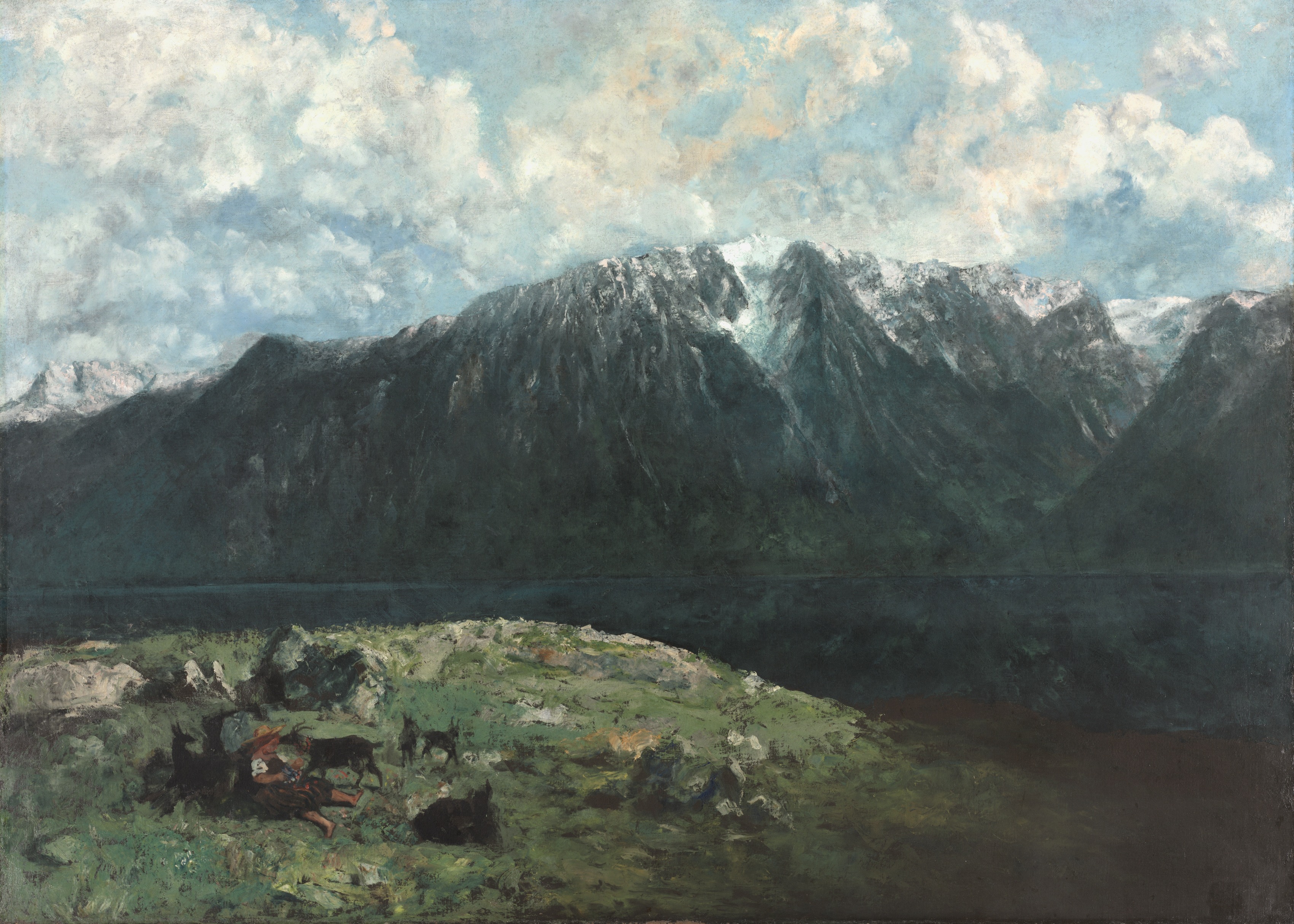
Gustave Courbet: Panoramic View of the Alps,
Les Dents du Midi (1877) unfinished work
"We gained a garden at the cost of losing that world …"
When does an exile end? The homecoming just begins the exit, for attachments made out there still hold. The Muse retained her position, so she continued connecting in more or less the same fashion after relocating home. She became a remote worker, just like any other until The Damned Pandemic started lifting. Then, she'd occasionally return, working in borrowed space, back into the workplace she'd inhabited before. Her exile followed her back home, her liberation incomplete until this week when she formally retired, turned in her credentials, and forfeited her computer and phone. Her departure almost seemed like the start of yet another exile as we drove through Golden, a town we'd grown so damned familiar with during the actual exile.
I, too, sensed the continuing connection, my well-practiced role of The Invisible Husband during the exile, continued even after we returned home.
Morebility
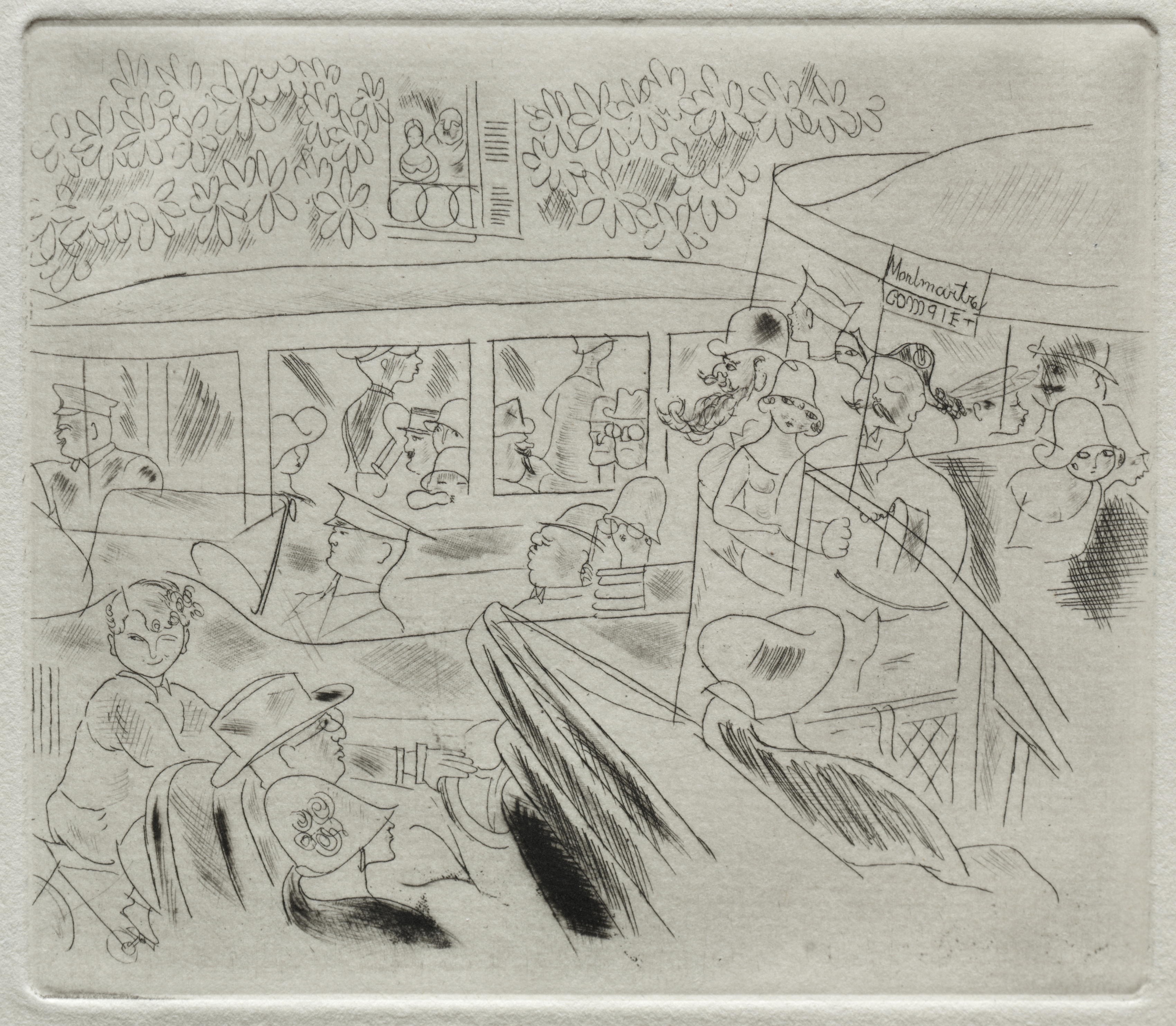
Charles Laborde: Traffic, Montmartre (1925)
"Mobility has become its opposite."
My mobility will very likely be the death of me, for I cannot seem to deny the primal urge to move. My dissatisfaction with simply sitting invites me into perhaps the most self destructive habit on this planet, driving. The imagined freedom of the road goads many into what I might label Morebility, the morbidity of movement; movement for its own sake, movement as compulsion, movement as self-justifying. In the small city to which The Muse and I have settled, traffic only rarely presents a problem. When the travel time across the whole place takes about eight minutes during the peak of rush hour, such as it is, nobody's really in the business of seriously trying to limit the number of cars on the road. Along the Front Range of Colorado, though, traffic has become much more than a problem. It seems more a disease as each takes their leave and the roads quickly clog, filled to beyond their design capacity for several hours each day. Rush hour moves at a snail's pace. Freedom of movement becomes a parody of itself.
The Gods, of course, absolutely love this stuff.
AThousandMiles
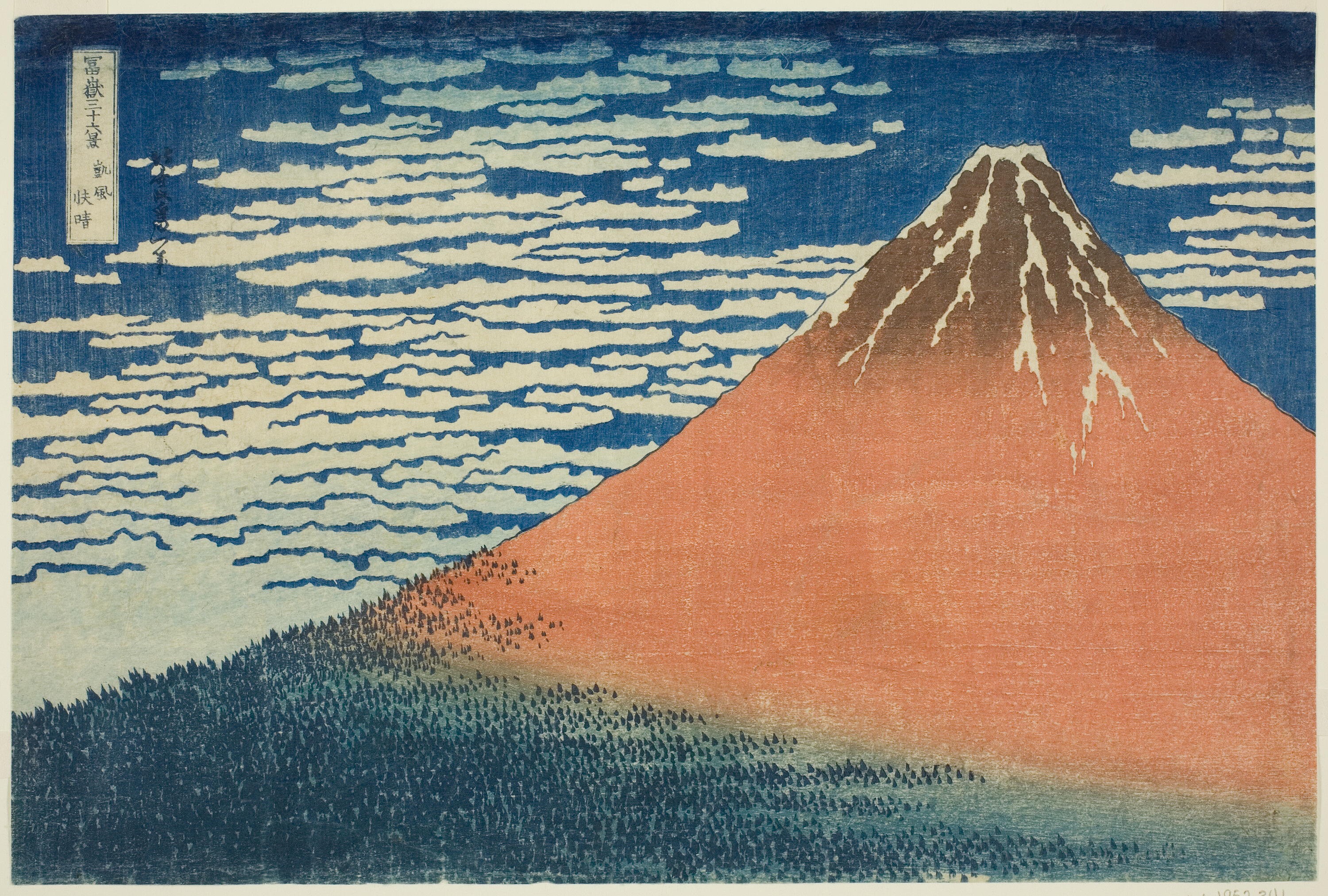
Katsushika Hokusai: A Mild Breeze on a Fine Day (Gaifu kaisei),
from the series “Thirty-six Views of Mount Fuji (Fugaku sanjurokkei)”
(c. 1830/33)
" … enough distance to change the past."
I woke up AThousandMiles away from home, and feeling the distance. I sensed a deep familiarity along with an accompanying alienation, for this place, once the site of our extended exile, no longer belongs to us or us to it. When we owned a home here, I could at least believably imagine that I belonged. Since we left, I'd hardly given it an idle thought. Yet here I am and here it is, confronting each other again. Me, with my muscle memory still so well-tuned to this context that my fingers remember when to change the cruise control speed in perfect anticipation of an upcoming change. I remember which lane sets me up for the turn, just like an old hand.
I notice that this place has not stood still in my absence.
StoryOuting

Unknown Artisan(s)-Netherlands, early 16th century:
Story of Perseus and Andromeda (early 1500s)
"We are stories perhaps never coherently told …"
Faced with the existential crisis a birthday brings, I long ago ceased shopping for relief. I decided that I could not possibly buy myself out of this dilemma brought on by the urgent need to give the very best gift. In the past, I've usually resorted to producing a poem, and there've been plenty in their time. [I excuse The Muse her …, you get the drift.] I've sometimes produced an original song, one of which was the first ever Folk Noir tune and another, which accurately predicted our future. (The Invisible Husband, circa 2011.) This year, The Muse's Day happened when we were away. I attempted to write a poem while creeping around our shared hotel room but the context didn't feel right and the words wouldn't come. Writing a poem, especially one of potential importance, will not just come if beaconed. It must be reckoned with. It comes when it's ready and never entirely due to any sense of urgency, which most often serves to scare off the damned thing, anyway. Birthdays, as I said, produce existential crises.
We had five hundred miles of two lane blacktop looking at us, a day of traveling ahead.
MakingTime

attributed to Mewar Stipple Master:
Prince Amar Singh Drives His Own Elephant (c. 1695)
" … I will have become a system …"
What am I doing while I'm driving? That's a complicated question that gets down on one knee and begs an equally complicated answer; but I'm a simple man, one more prone to simplification than explication. I hold deep suspicions about anyone attempting to definitely answer that question, for too many moving parts get involved, along with human emotion. No, my friend, that's one terribly, terribly complication question.
I, myself, seem barely present when driving.
LeaveTaking

Jean-Léon Gérôme: Leaving the Oasis (1880s)
" … having re-earned our presence by being good and gone."
Folk songwriter John Gorka once insisted that as a traveling performer, he left more often than he ever came back. There was a time when The Muse and I lived like that. We lived as if on a continual grand tour, departing before gravity could catch us, always on the move. The Damned Pandemic slowed our viscosity. We rarely take leave now. A whole other existence lays on the flip side of mobility, a settled life, a more dependable existence. One can come to think of one's self as indispensable by default, since the home place rarely needs to get along without one's presence. Absence becomes unthinkable and the promise of LeaveTaking feels like an existential threat. I spend a few days in growing denial before finally accepting the inevitability less than twenty-four hours before departure time.
In the final hours, The Muse suggests that we might fly instead of drive, and I put down my foot. With This Damned Pandemic, I won't fly.
TheIrrelevancies
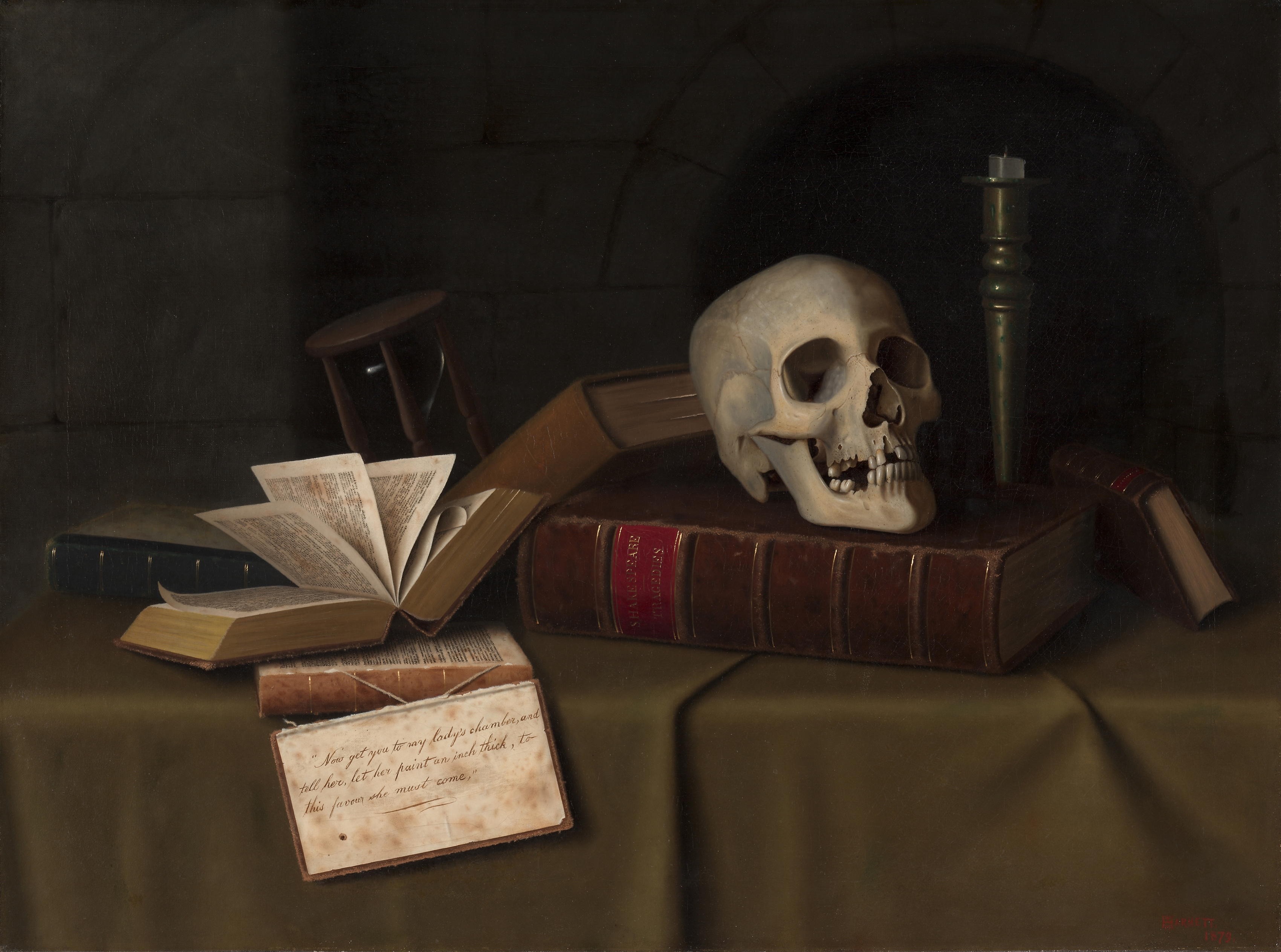
William Michael Harnett: Memento Mori, "To This Favour" (1879)
" … inevitably slipping into a growing good twilight."
Mastering TheIrrelevancies might be that true purpose of advancing age, for youth becomes obsessed with establishing the relevance nobody can take to their grave. A younger generation will always be on the heels of any one spawned before it, and they must and will find the flaws in their forebears' arguments if they ever hope to gain prominence for their own. Some try to fight this trend and attempt relevancy until the ultimately bitterer end, an exit inevitably rendered ever more bitter and irrelevant, but irrelevancy by omission turns out to be a much, much different experience than irrelevancy by commission, the former a form of humiliation, the latter holding hope for at least some sort of salvation.
The GrandOther fulfills her part in this grand scheme by purposefully discounting pretty much everything I mention.
CellAbrate
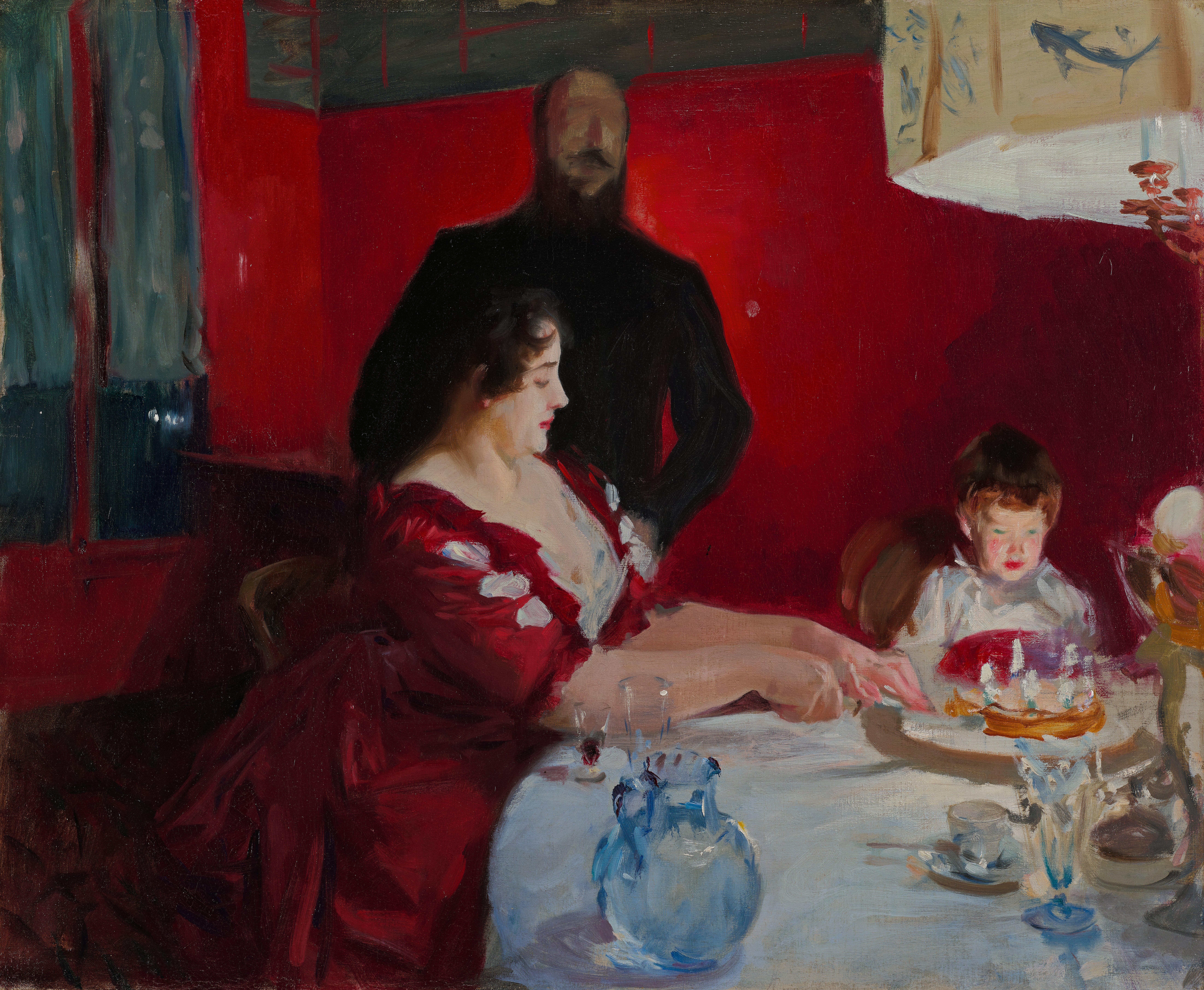
John Singer Sargent: The Birthday Party (1885)
"Each birthday just reminds me that the lifeday's the thing …"
I can't say how much I appreciate all the birthday greetings I received yesterday. I can declare that I deeply appreciated each and every one and would have written a lengthy response to each had the volume not overwhelmed me. Many insisted that I should take the day off to celebrate, which I did, but probably not in the way any of my well wishers envisioned. There was no cake. In these Damned Pandemic times, no gathering. No party, no favors. No rabble roused, nothing soused. I celebrated as I damned well pleased, as I secretly prefer. I engaged in my usual activities of daily living a tad bit more mindfully than usual, appreciating what I had, not seeking to acquire any more than I already possessed. No presents. No pretenses. I reheated leftovers for supper, fled to bed early, and slept a sleep of angels. Happy, happy birthday, indeed.
I remember when I was about ten, my parents organized a birthday party for me.
Schrödingers

Giovanni di Paolo:
Saint John the Baptist Entering the Wilderness (1455/60)
"May I prove worthy of my future …"
Each morning, I sit before my keyboard possessing another unstated story. In some ways that story will only degrade from that initial point, for with each finished sentence, its potential further collapses into just whatever it will be. At the moment of inception, it could include anything. By the time I finish writing it, or call it done enough, it will have become a definite and smaller presence. It will have become unique and specific rather than general and infinite. In this way, I seize each day.
I'm coming to acknowledge that first moment as a Schrödinger, in homage to Erwin Schrödinger, who, in 1935, attempted to criticize an interpretation of a quantum condition by explicitly describing a paradox whereby a hypothetical cat may be considered simultaneously both alive and dead as a result of its fate being linked to a random subatomic event that may or may not occur.
PlotTwisting
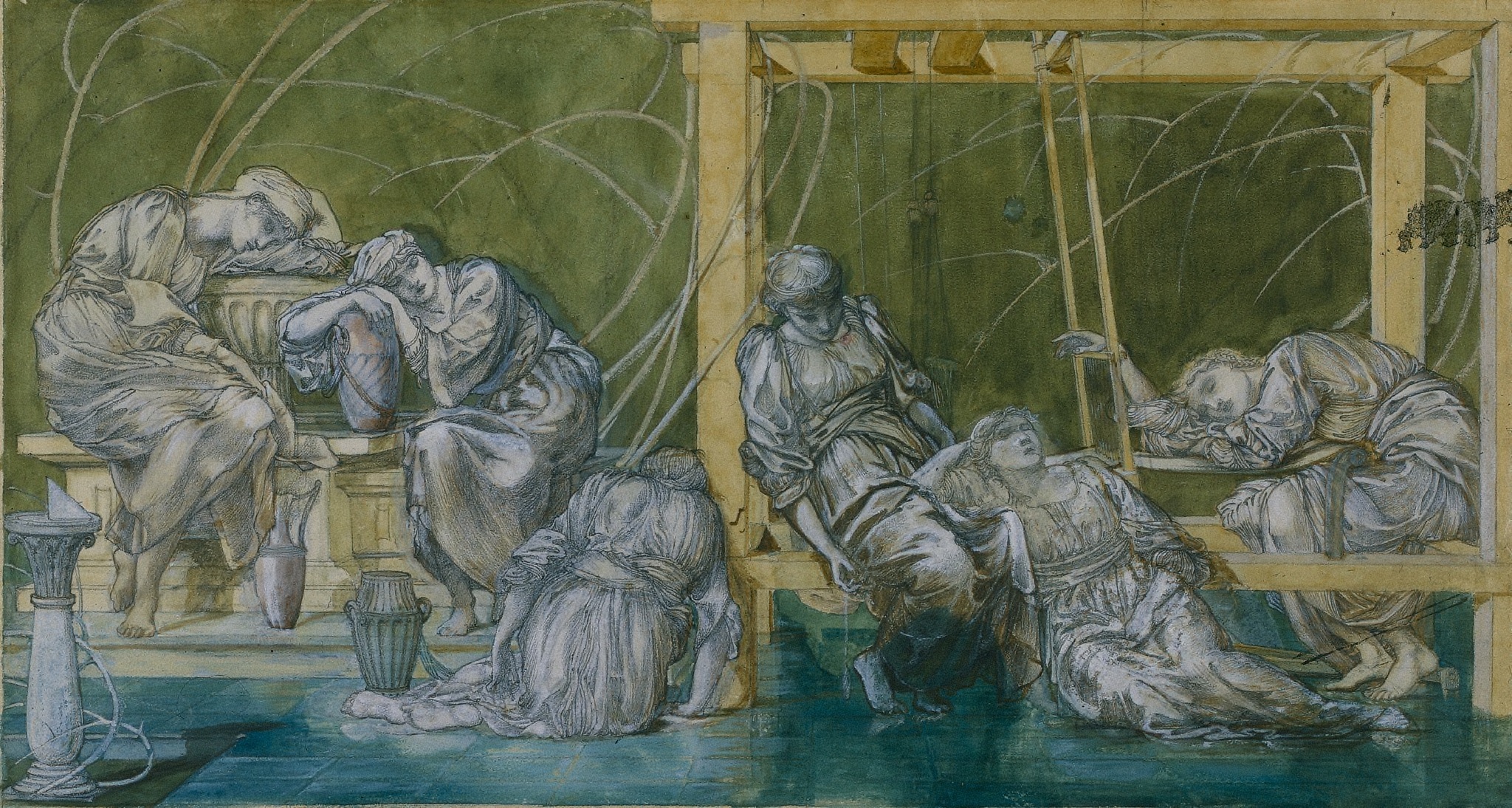
Edward Burne-Jones: The Garden Court (1870–75)
" … the ability to fall apart into unanticipated constituent bits …"
The standard fairy tales seem anything but standard, for each story prominently features some barely believable PlotTwisting. What might have begun as a straightforward stroll to grandmother's house, invariably turns into something much more interesting and, frankly, barely believable, if believable at all. Wolves do not as a general rule wear a grandmother's clothing, even after swallowing her whole. They rarely consent to crawl into anyone's bed, let alone come inside, even to chide a remarkably innocent and gullible Little Red Ridinghood, who, remarkably, does absolutely no riding in the whole story, though in the story's final scene, she does manage to perform some major surgery—or is that an autopsy?—as she extracts whole and otherwise unharmed, though apparently unmentionably slimy, her previously swallowed grandmother from the wolf's belly. The whole story's allegory, twisting in an uneven wind.
Your story and mine are, if scrutinized, hardly any less believable than the least of Hans Christian Andersen's.
LivingInTheDark
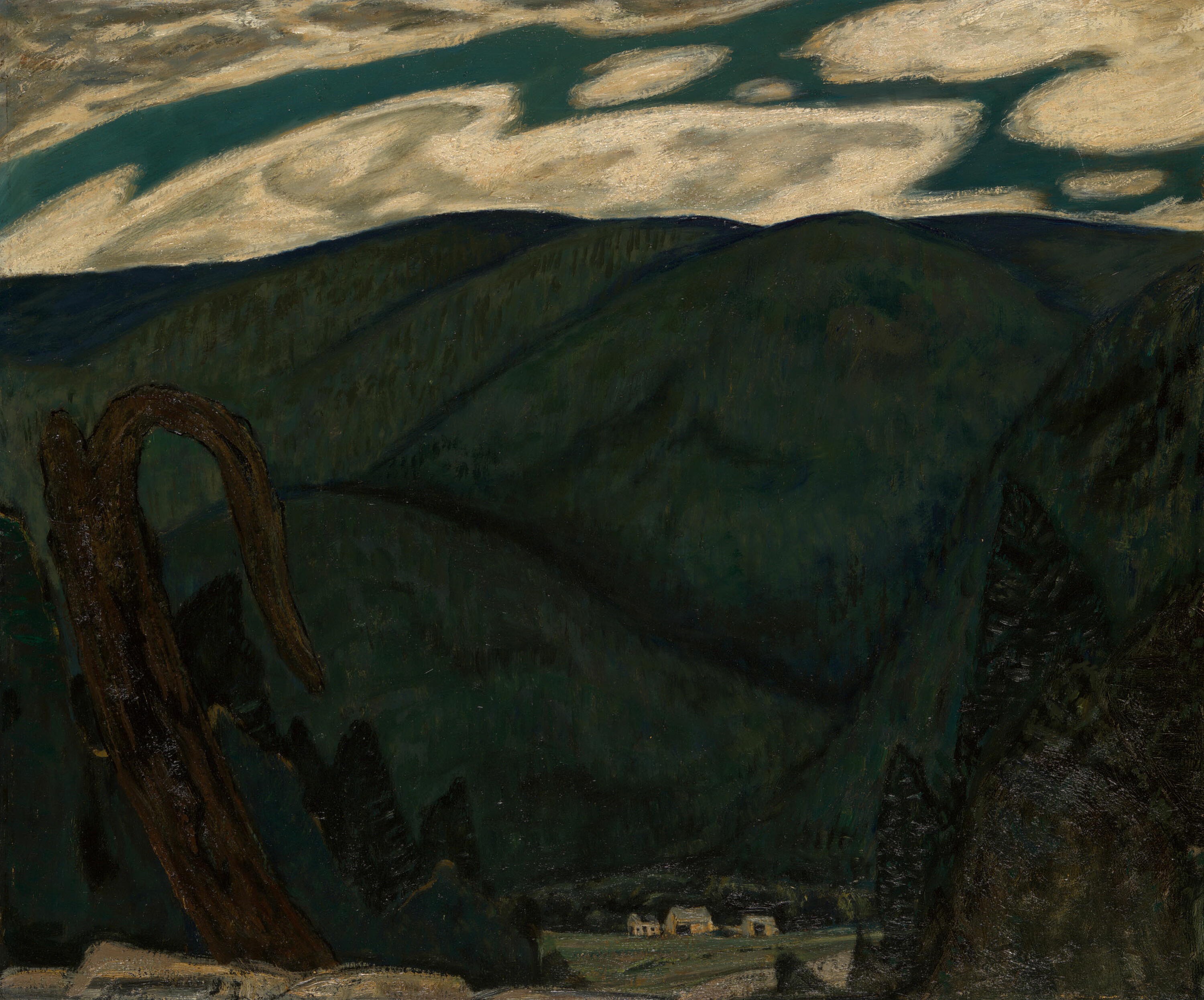
Marsden Hartley: The Dark Mountain (1909)
" … blindness seems to help me see some things better."
The more we learn about our universe, the more light seems an alien element. Our Earth, like its moon, naturally produces almost no light, but depends upon light cast by a rather distant sun. We "see" into our universe by means of light, mostly the ultraviolet kind we cannot sense without mechanical assistance. What little light we manage to produce, fleeting and dim, slips through our fingers, gone almost before we sense it and certainly leaving more than ever arriving. In a galactic sense, we LiveInTheDark. Nobody in any distant galaxy has been tracking me by the light we emit because we hardly qualify as even a dim bulb in the firmament, though we still remain eminently capable of sometimes feeling absolutely full of ourselves.
Most, and me included, hug close to our light sources.
DoggedDays

Pieter van der Heyden (engraver),
after Pieter Bruegel (artist):
The Four Seasons: Summer (1570)
" … as if splooting somewhere in the middle of a frozen food aisle."
I abandon my bed just after midnight, wondering if night cooling has finally rid us of the previous day's heat. These DoggedDays of summer exhaust me. The Muse does not complain as I disappear to lie in front of a box fan or into the shadows of a lengthy mid-day nap, replete with disturbing dreams. These dreams further exhaust me, refreshment presently beyond my grasp. I hold my compass heading but make little progress. The Muse asks what I have in mind for dinner and I reply with a distracted, "Nothing," before resuming what I wasn't doing before she asked. Friends flee to the beach where fog and cool breezes bring respite. Here, wheat harvest continues and the air fills with chaff and dust and the scent of diesel engines. A flour mill burned down last weekend in Pendleton, victim of a bad bushing and an inattentive watchman. The initial fire was quickly drenched and a watchman posted to monitor for flareups. The watchman was pulled after a few hours and a couple of hours later, that fire flared and nobody was there to report the incident. By the time the brigade returned, the place had burned into a smoking shell, a total loss. Blame the DoggedDays of August.
August rhymes with exhausted.
Mutualizing

Giuseppe Baldrighi: Lion (1750s)
" … this world is better off, too."
I start most days with a period of interspecies communication, Mutualizing, with Max our cat. He initiates these sessions. I'm uncertain about the details from his perspective, but I suspect that he's showing me appreciation and respect when he ambles into the library to hop up onto my lap and stretch out for a scratch and a purr. We share not even the odd verb, but I sense that we're conversing after a fashion. The chat always starts with some questions and tentative answers. Sometimes, he hesitates but consents to allow me to pick him up by the scruff and plop him onto my lap. Other times, he clambers up onto the chair back and climbs down my shirtfront. He quickly settles in, sometimes for no more than a minute—"Just checking in," he seems to say—and other times, he'd stay for hours if I didn't have business to attend to after an hour. He usually lingers for a half hour, sprawling, completely vulnerable, trusting and peaceful.
I cannot imagine a more reassuring way to start any day than to have a fine cat, who could easily choose sublime independence, decide to share some of his wildness with me, seemingly appreciatively.
Sloughing
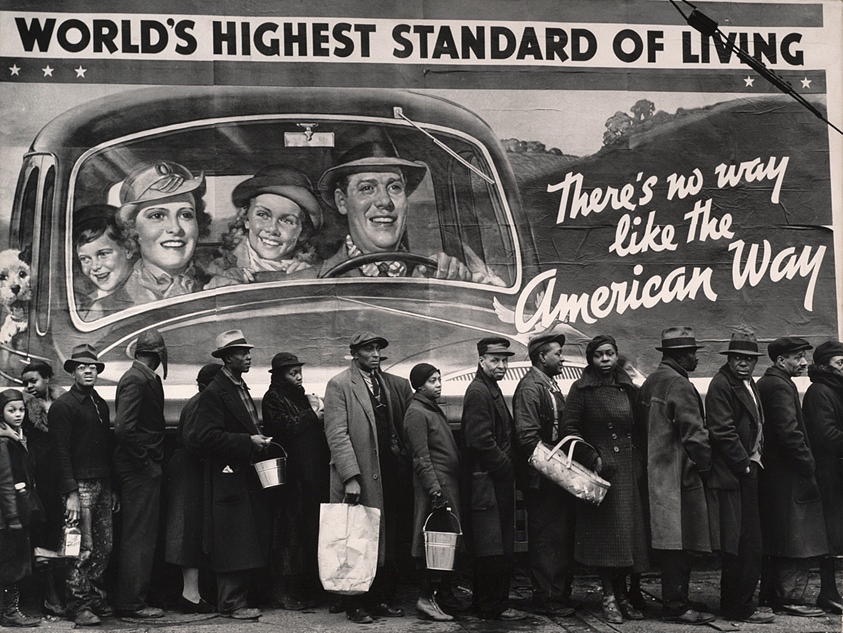
Margaret Bourke-White:
World’s Highest Standard of Living [Silver Gelatin Print]
(1937)
"Arbeit macht frei!"
I fail to explain, even to myself, how I came to live this essentially binary existence where I'm either working hard or hardly working, producing something or Sloughing off. There seems to be no middle ground, or none that I've found. Even when I manage to tucker myself out, I have not even then earned a rest. What respite I grant myself, I account for as laziness, pure and simple. What rest I take, I consider sloth rather than rejuvenation, and I allow myself only the barest minimum. Beyond that, I start accumulating guilt about failing to properly apply myself. I consider myself to be a wasting asset, one which degrades, whatever I engage in, for I tend to fall short of full engagement, which would be a state with which I cannot quite relate, but recognize only by its absence. I'm confident that I've never experienced full engagement. I'm just a dabbler, I suspect.
I hear politicians divide our great population into two otherwise undifferentiated parts, the hard workers and the intolerables.
Relentlessness
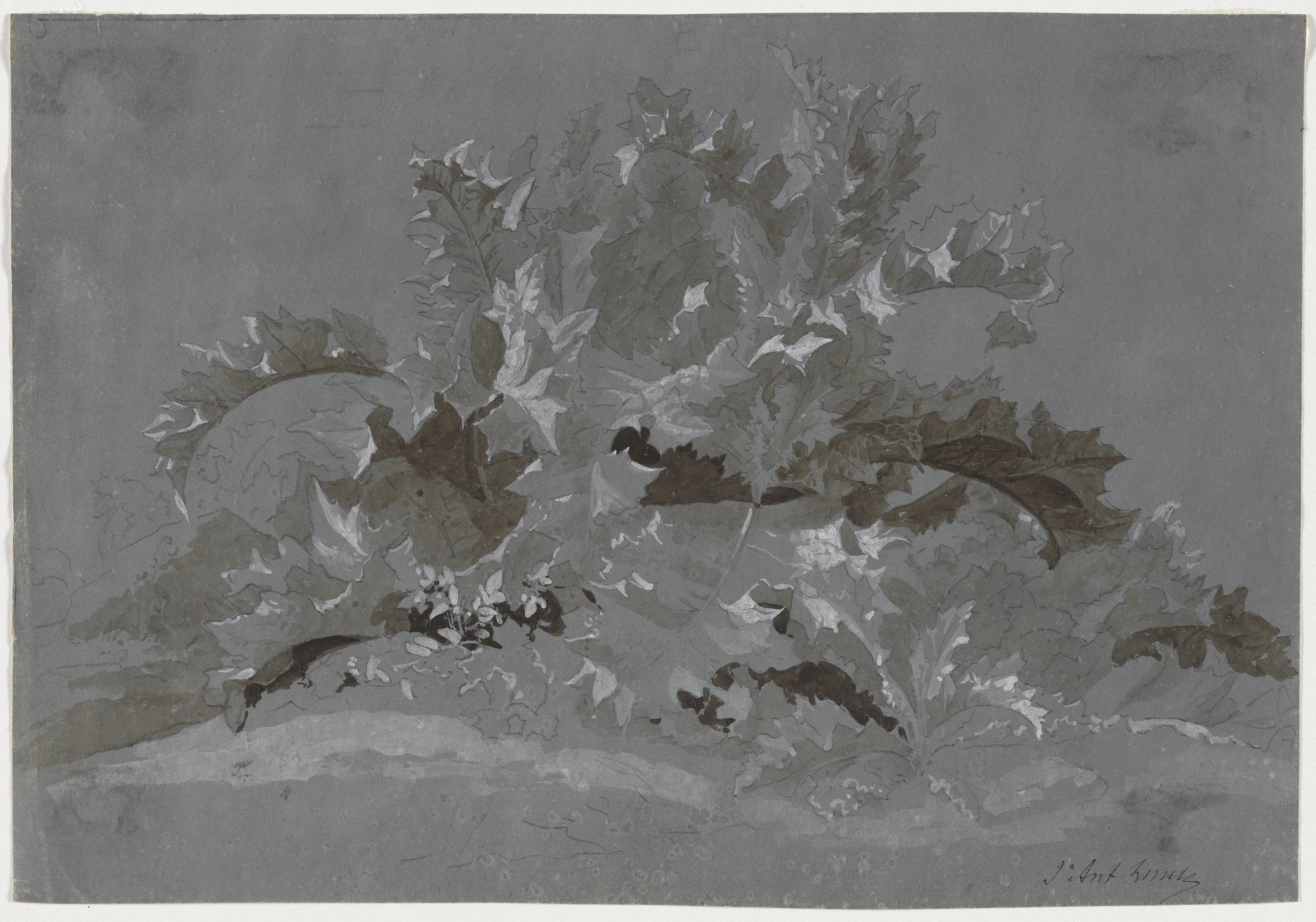
Jean Antoine Linck: Study of Weeds (1800-1850)
" … more like who I was when I started …"
I feel most impressed with the utter Relentlessness of this universe, where nothing, it seems, succeeds like excess. Particularly in this season, Summer, where I find myself up most mornings, dragging hoses, watering. Weeds which stand outside the watered perimeter thrive. I have no idea what they survive on, for the ground cracks and presents as distinctly unpromising, yet there's always something adapted to even the most wanting place. Give a patch of clover an inch and it will at least attempt to overgrow the whole lawn, growing stronger, shrugging off weed killer, multiplying before exponentiating with abandon. Each plant, each species, seems to lack a governor and quite naturally, Relentlessly, seeks dominion.
I speak emphatically about community, about giving and sharing, but our role models seem indifferent to such.
Heap
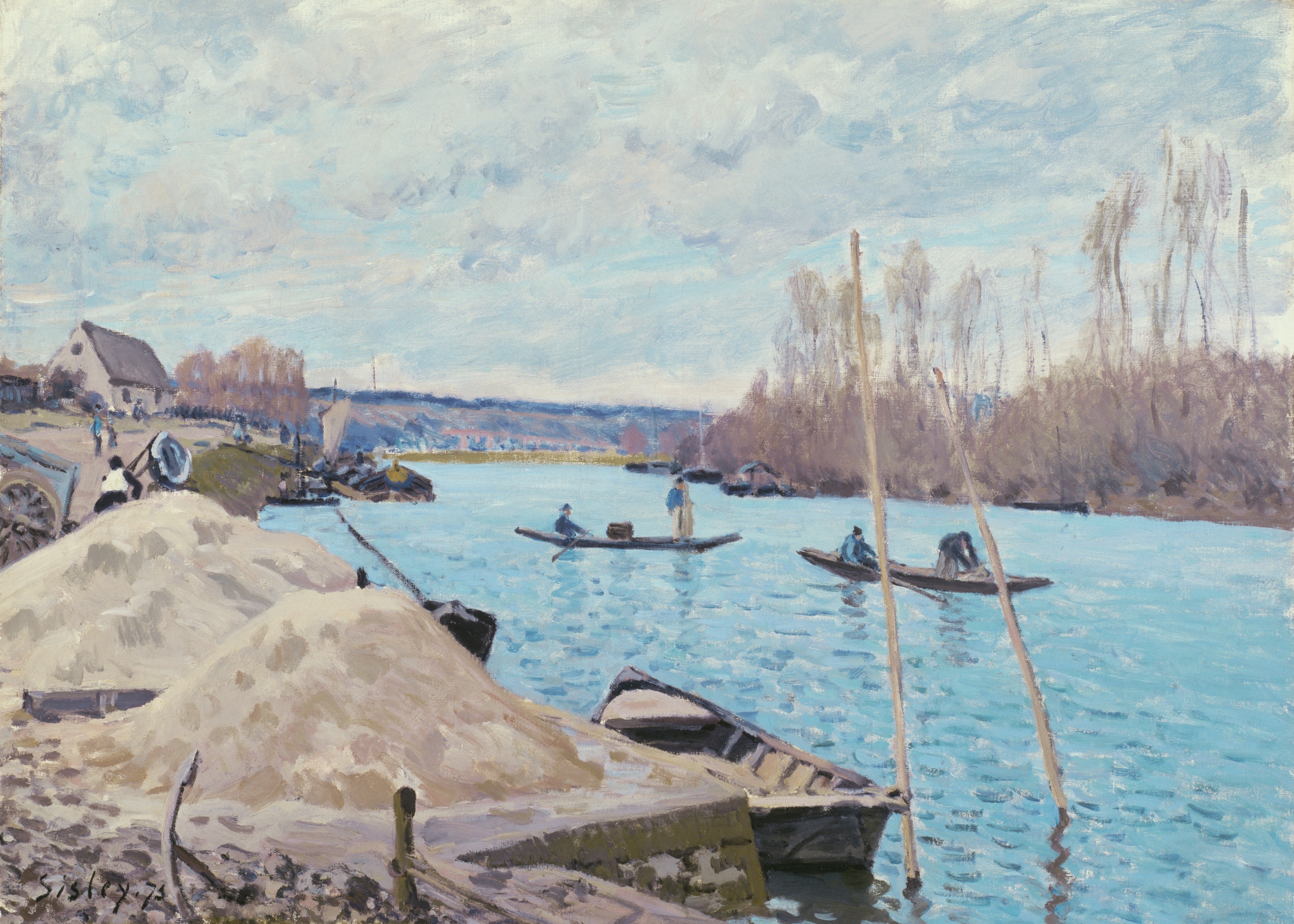
Alfred Sisley: The Seine at Port-Marly, Piles of Sand (1875)
" … enriching our historical record …"
Future archeologists should be able to fairly accurately map our rhythm of life at The Villa Vatta Schmaltz, primarily by excavating our noble compost Heap. The Heap holds sequential record of our dining year from which even half-baked archeologists should be able to piece together a decent portrait of our preferences and practices. I noticed yesterday that we'd re-entered the Green Chile part of the year, which has always been squeezed in-between the cherry/apricot/plum Stone Fruit season and the now impending tomato time. We put up produce in turn, producing piles of pits and peels which we dutifully pile on top of The Heap, thereby laying down our gastronomic self portrait.
Very little goes to waste here.
Unseen
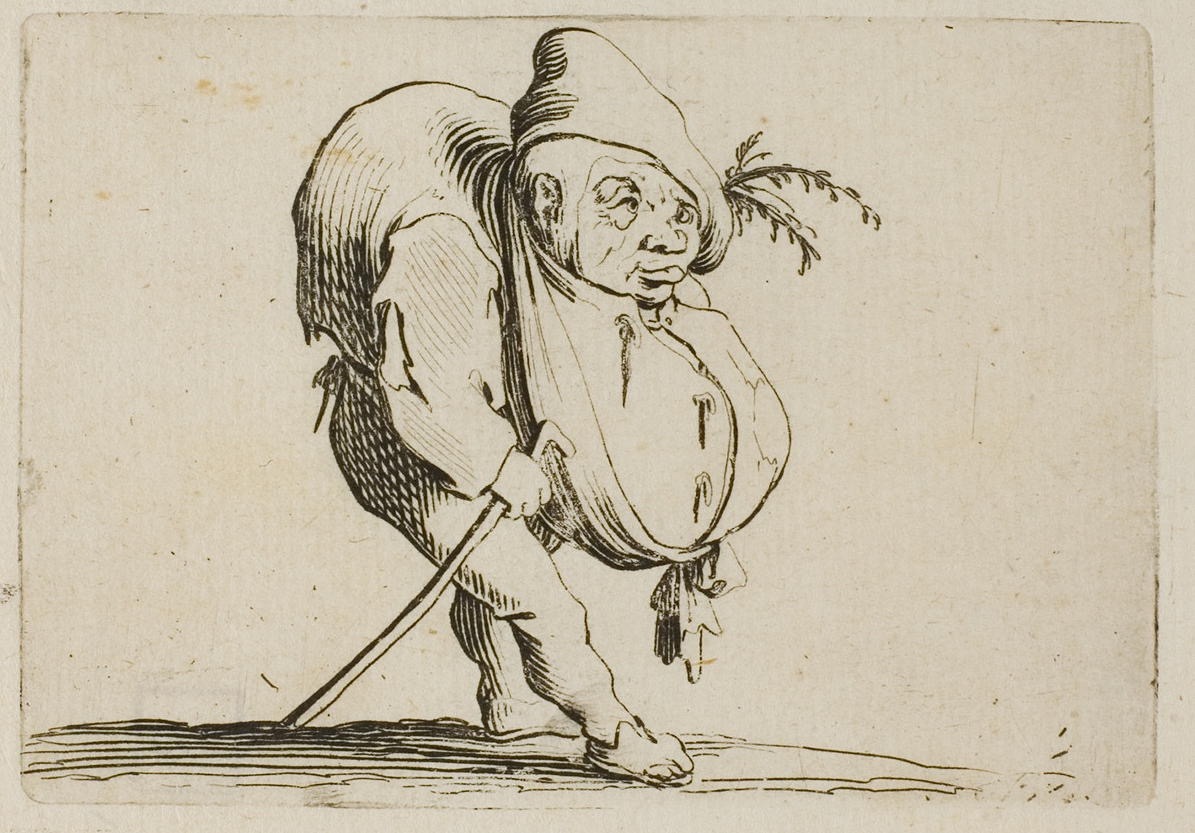
Jacques Callot:
The Uneven One with a Cane, from Varie Figure Gobbi (1616)
"I am also the sum total of what remains Unseen …"
The following day, my vision returned with a vengeance, in HDTV-quality as if to remind me of all that I had not been seeing, of all that I had not noticed, of all that had recently gone Unseen. I found it humbling to discover what I never really suspected, a prominent blindness. I gratefully never caught myself incapable of seeing. I never quite suspected the depth of my blindness, and presumed that I was experiencing just a slight reduction, a general fuzziness, but I had for months, perhaps a year or more, lost whole dimensions. The vision I experienced that next morning, following the cataract replacement lens clearing laser procedure, were nothing less than extraordinary. A fresh world presented itself to me, distracting in its detail. Colors brilliant, even the muted ones; the textures, profound.
I suspect that blindness must be one of those states that does not exist in any moment. It exists in reflection, by comparison.
Seeing

Reijer Stolk: Gmünder See mit Traunstein (1906 - 1945)
" … no more than an annoying background mumble eliciting a muffled scream."
I might privately admit that over recent months, my vision had gone to shit, but I would never otherwise consider admitting this because vision, Seeing, seems such a personal and private experience. My optometrist commented—in no more than an aside, really—that it appeared to him that the lens installed during my cataract surgeries three years ago were starting to look a little cloudy. Cloudy, I thought? But I believed that the cataract surgery would be the last such insult to my eyes, to my vision, that they wouldn't require additional procedures. So much for belief, for I later learned that pretty much everyone who receives that surgery needs a follow-on procedure a few very short years later. I told my optometrist that I'd get back to him later on the subject, thereby entering that first stage of acceptance, denial.
A few weeks later, I'd grown weary of fuzzy perception.
Installing

Louise Pithoud:
Male and Female Bacchants Installing a Herm (1792)
"I consider them ours."
Installing comes after design and fabrication, and little of either of those earlier stages really prepares anyone for the final challenges. This is where idea finally meets its context, where imagination finds its anchor. Final boundaries and ultimate limits finally come into play. There was probably no way to fully prepare for this day other than to acknowledge it coming. The ruminating that dominated design matters little now. The overlooked will have their day. Last minute surprise will complicate the whole conception, a final reckoning occurs. Reputations might well be threatened and might be made. Be very afraid. It won't matter.
I warmly anticipated Installing the new front porch stair railing.
Mac&Pleas
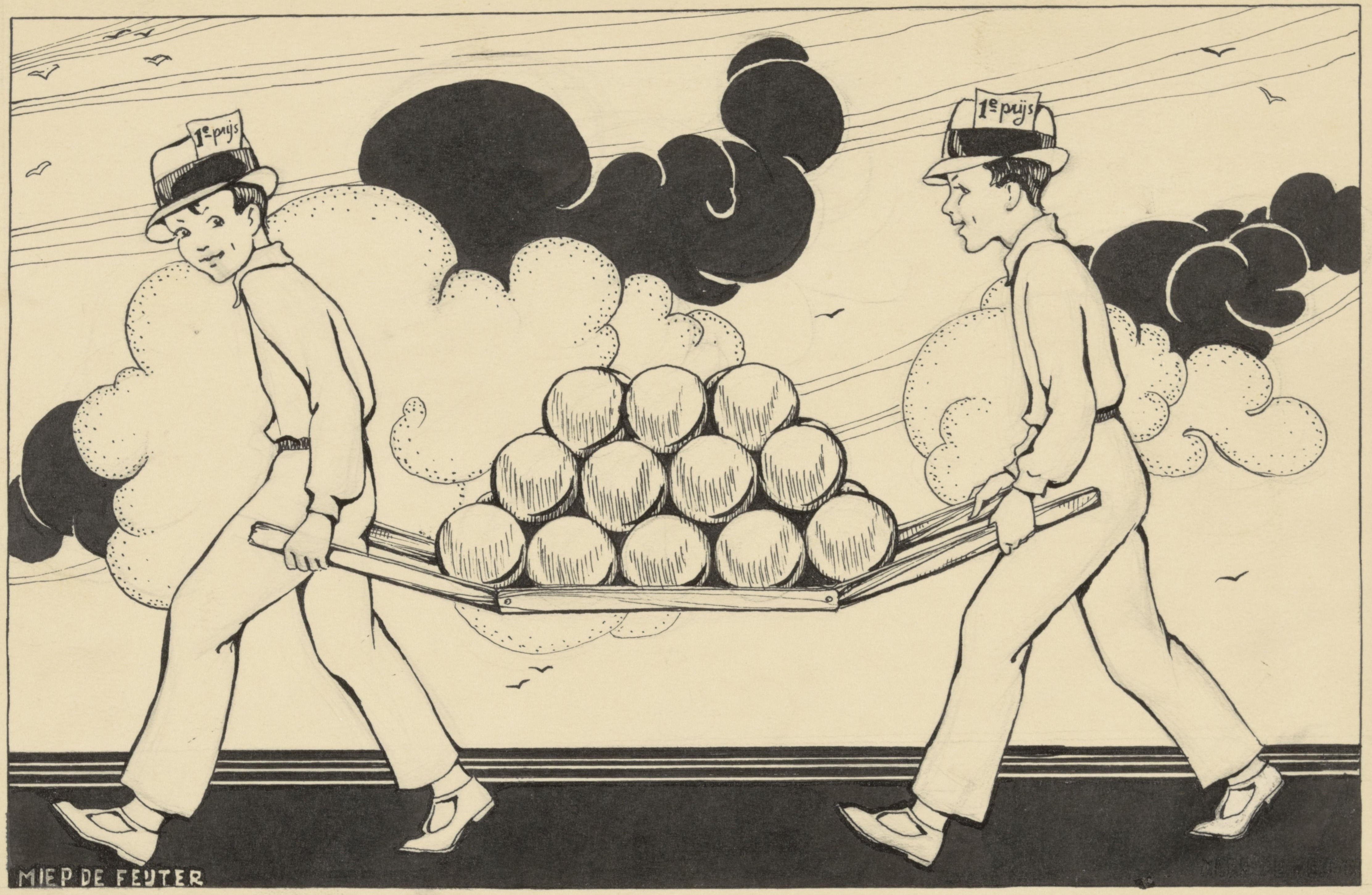
Miep de Feijter:
Hans en Frans verkleed als Alkmaarse kaasdragers
[Hans and Frans work as Alklmaase cheese carriers] (
c. 1928 - c. 1941)
" I eat my share warmed over …"
A time will come, because it always has, when I will once again be called upon to make "my" Mac&Cheese, my famous Mac&Cheese. My Mac&Cheese became famous because The GrandOtter liked it, or, more properly, loved! it. I made it for a few dinner parties, too, and many proclaimed it the very best they ever consumed. It thus became famous, though dinner party proclamations tend to be heavily lubricated and contextualized by a generalized camaraderie. Nobody ever openly criticizes dinner party dishes, and some gushing seems common to all of them, still, I had reason to believe that my Mac&Cheese was at least pretty good. I knew it was unusual, for I didn't use milk in my cheese sauce. I used stock, which makes a fine sauce without delivering what usually turns out to be a milk pudding sort of base. My Sauce Velouté provides a better foundation for the cheese. I also usually avoid using actual macaroni in my Mac&Cheese.
Mac&Cheese is always, really about the cheese.
IfOnly
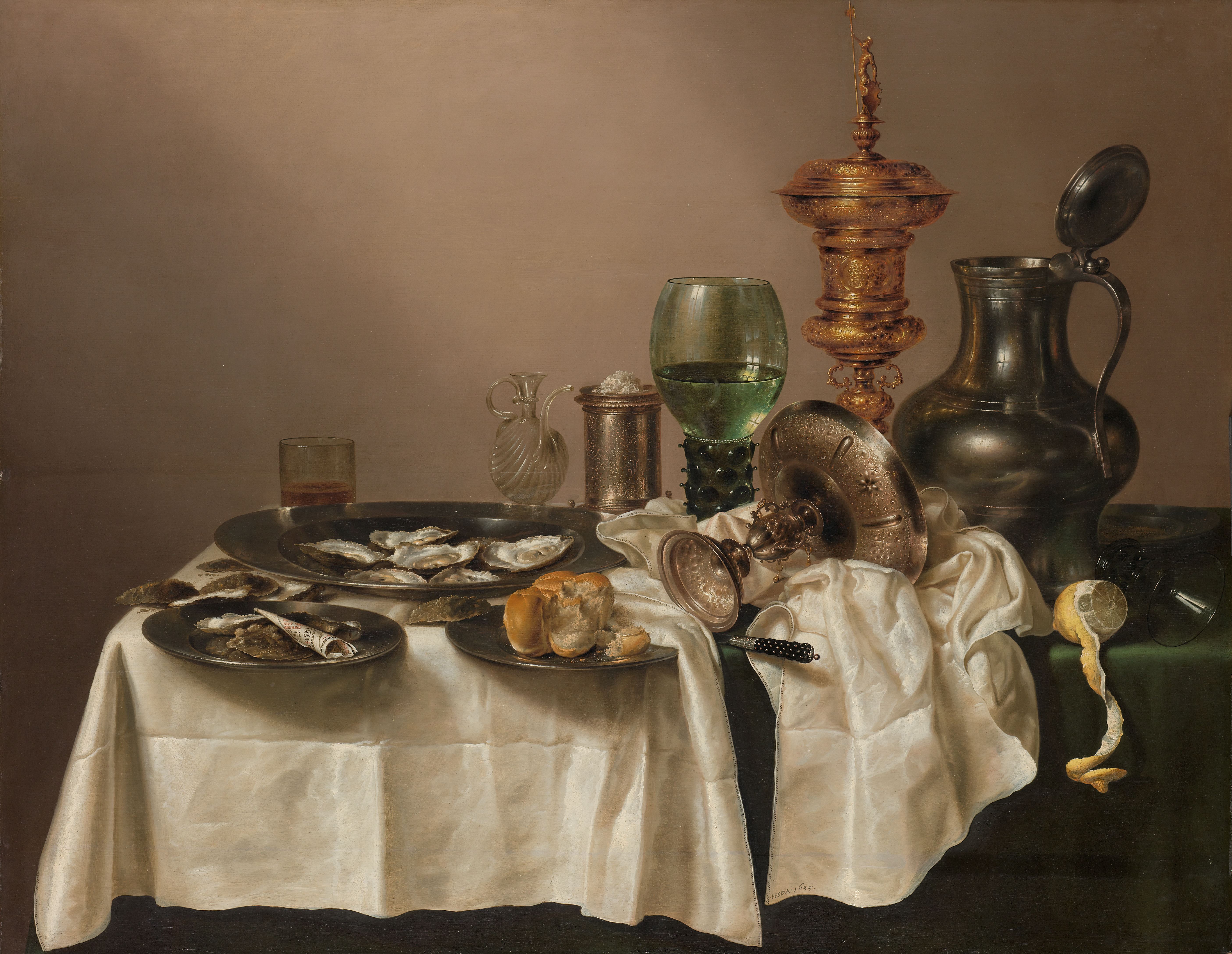
Willem Claesz Heda: Still Life with a Gilt Cup (1635)
" … slinked home without salvation …"
The Muse suggested a drive up to the top of The Scenic Loop to show her visiting nephew John a different part of this valley. We soon found ourselves standing beside a dusty road, threshing wheat in our palms, working on creating gluten balls for chewing. It's long been our practice in harvest season to glean a stalk or two from the periphery of a wheat field and wonder at the magic within them. The Muse counts forty-five kernels from one head, recalling how her father could count one head's kernels and fairly accurately project the bushels per acres he'd harvest from his field. The Muse reports word of bumper crops this year, with eighty bushels per acre on dry land and twice that from irrigated fields. Her dad counted forty bushels a bumper crop in his place and time.
We drive on, working that wheat paste as if it were chewing gum, up further into the mountains, since John lives in South Dakota and has rarely seen mountains.
Periphery
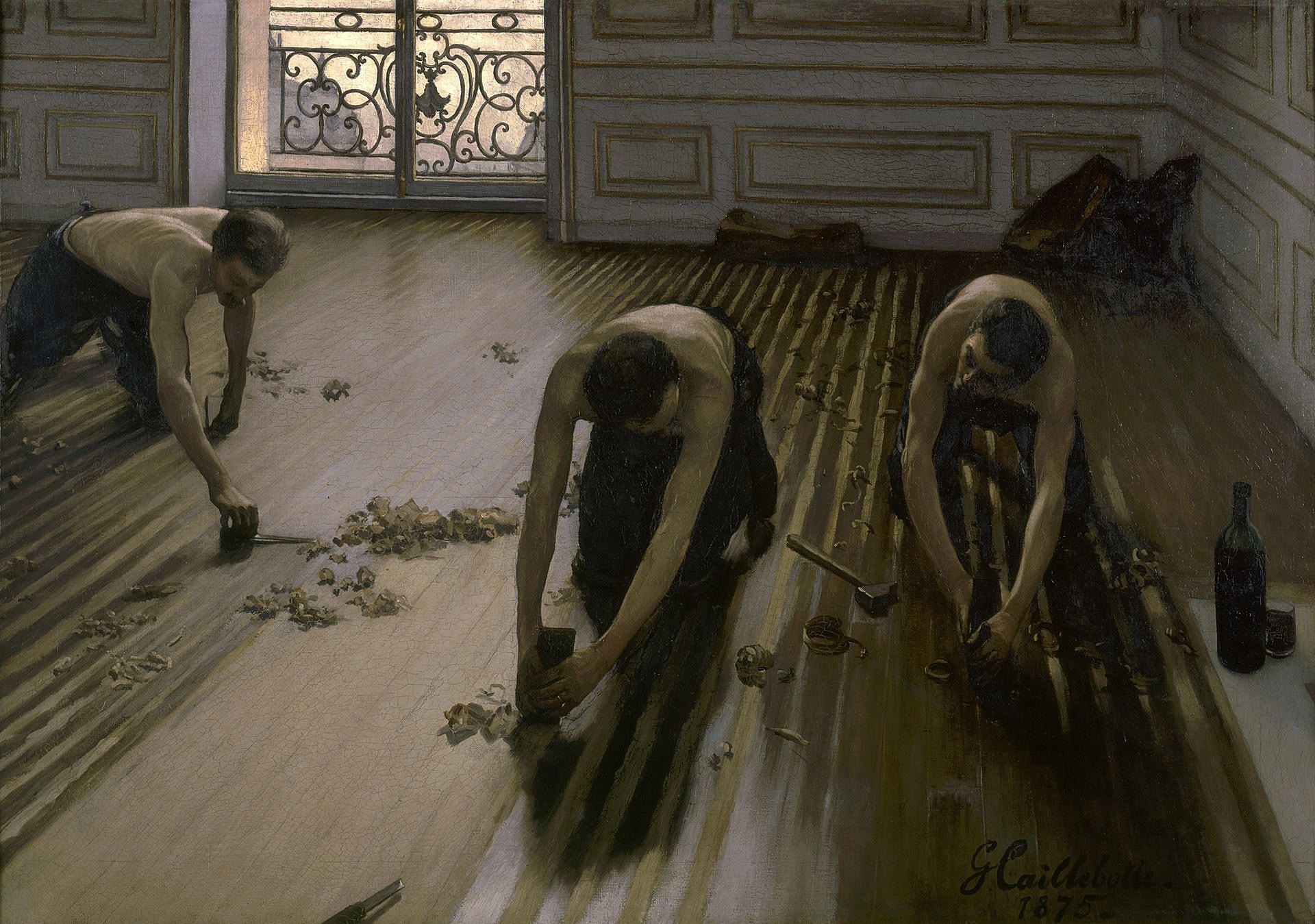
Gustave Caillebotte:
Les raboteurs de parquet [The Floor Planers] (1875)
"I just live here."
When The Muse holds a gathering, I prefer to work the Periphery. I'll busy myself with some self-appointed responsibility perhaps only distantly related to the proceedings. I'll flit in and back out again and very likely spend the bulk of my time offline, on the back deck, perhaps, grilling something intended for the table later. I might greet a few people at the front door, but rather quickly disappear, only to reappear to lead a brief guided tour of recent home improvements. I'll suggest a beverage and see that it's delivered, stay for a brief conversation, then evaporate again. I'll contribute, but on my own terms.
I found it curious whenever I took to a stage as either a performer or a teacher that I never seriously intended to become anything like the center of anyone's attention.
Break

Gustave Caillebotte:
Study of a Man with Hands in His Pockets (1893)
"The Break seems beginningless until it doesn't."
Autumn sends a postcard sometime in August to preface the coming season. After a forever hot spell, one morning brings goose flesh or the strong suggestion that it might still exist, a distinct impossibility just the day before. Nothing never ends, not even nothing, not even that seemingly endless heat, the one that had so rudely interrupted Summer. Summer seems three separate seasons now that global warming has imprinted her presence. Early Summer's an extension of Spring, Mid-Summer's an ordeal, and Later Summer's Early Fall, clearly not yet Autumn, but reminiscent of it in the early mornings and later evenings. Later Summer seems a welcome respite, a Break from the frightening Mid-Summer melting point.
Cool eventually intrudes.
Reward

Jean-Baptiste-Siméon Chardine:
The Attributes of the Arts and the Rewards Which Are Accorded Them (1766)
"I'll just have to wait and see …"
I sat in the dentist's chair feeling consigned to enduring my well-deserved penance. I had, after all, avoided dentists for more than a decade while I failed to work through a small trauma, a slight so minor, so seemingly routine, that I might have not even noticed, except I'd noticed and blown it all out of proper proportion, and there I was, collecting my just deserts. Except this work didn't seem all that onerous, especially when compared to how I'd for so long imagined it would be. Compared to my pre-catastrophizing, this was nothing. I imagined the same routine work being undertaken fifty years before under the technology and fumbling hands of my childhood dentist, Himmler Pearson, who always seemed to revel in the discomfort he imposed. More modern practices emphasize patient comfort. I almost expected to be offered a brandy and a Montechristo, but wasn't.
With little left to do but imagine through what once would have been the excruciatingly painful portion of the procedure, I began to consider what, if not punishment, if not penance, was I experiencing?
Bloggering
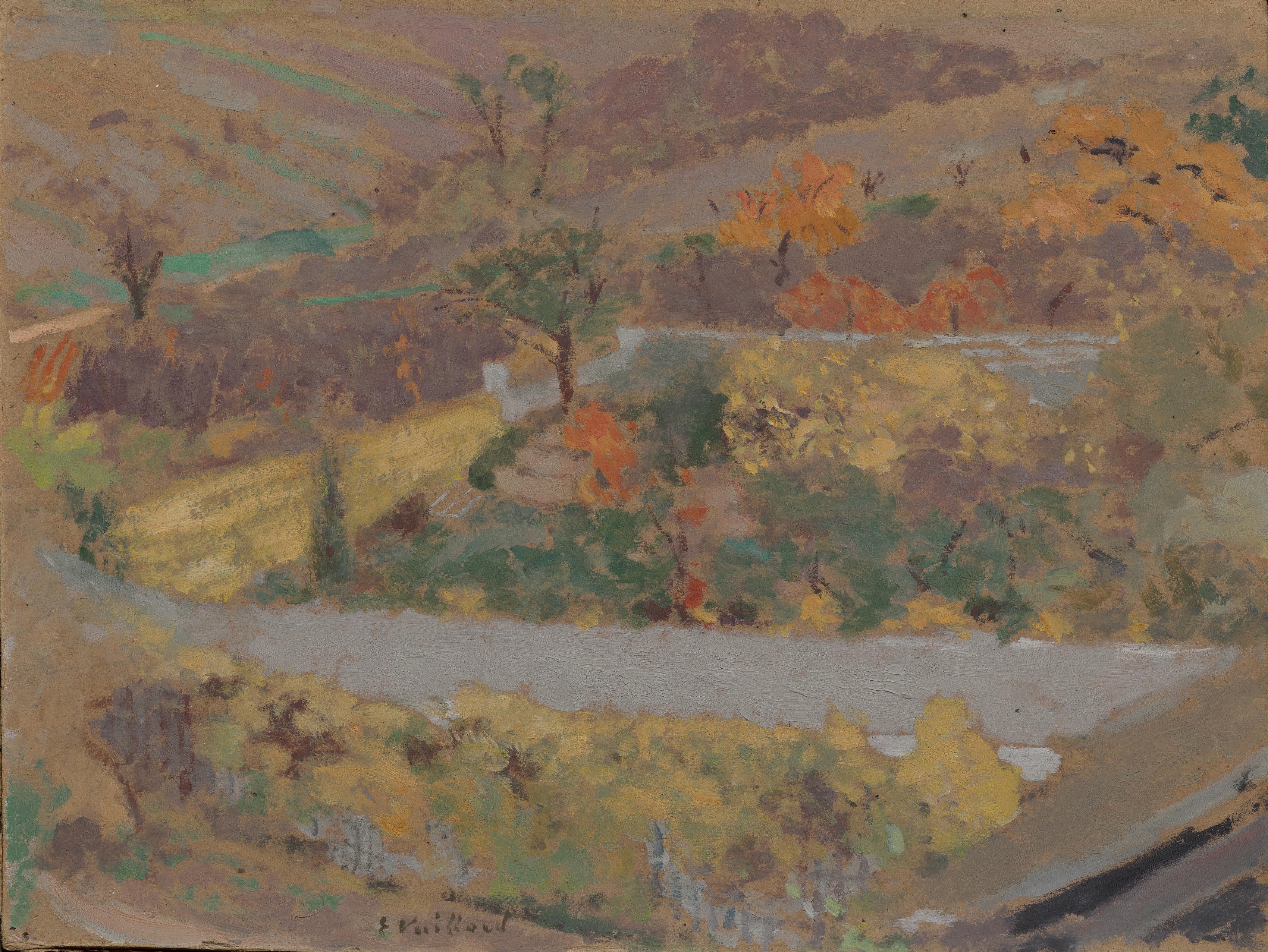
Edouard Vuillard: Orchard (1897)
"I seem to need to work in stone tablets."
I blog, and therefore, am. Am what? Well, a blogger for starters and by extension I suppose that I become a writer, though blogging isn't precisely what one might call writing, for blogging's pickier than simply writing. It requires considerable classification and codifying in order for the finished product to properly display and organize. I blog in series, relating all my production into quarterly segments, my current Againing Series, an example of this convention in action. Each addition, each fresh post, must satisfy a few qualifications before it can be published by posting. Each must have a unique title, for the blog software goes a little crazy when it encounters two identical titles, even when those titles belong to different series. Title must be unique, so, once I've decided upon a topic, which first often amounts to little more than a proposed title, I search both my blog archives and its Resource file to ensure that the proposed title has never been used before. I often find that I need to adjust what I thought would be the title to work around this uniqueness convention.
Molly or Max, my cats, might show up just about then, seeking breakfast and reassurance, providing distraction.
Vectoring
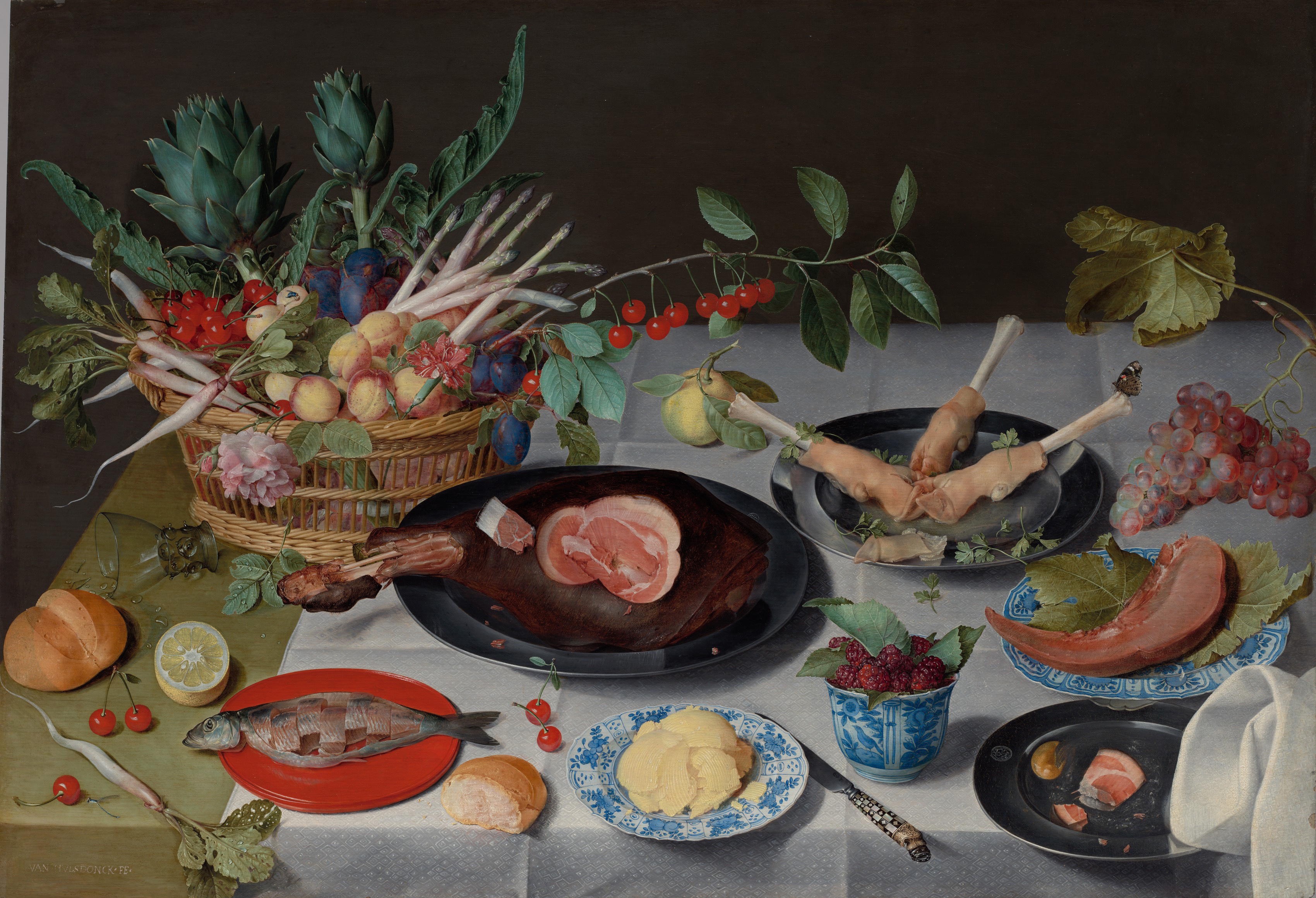
Jacob van Hulsdonck:
Still Life with Meat, Fish, Vegetables, and Fruit (c.1615–20)
" … a narrowing and no longer terribly elegant Broadway."
When my first wife and I moved to Portland, OR, in December 1975, we arrived as refugees. We marveled at the supermarket produce aisles after surviving two winters living in rural NE Pennsylvania, where produce seemed scarce off season. In Portland, all things still seemed possible. We took a main floor apartment on a bus route—by which I mean, the Belmont bus actually passed through our living room four times each hour— and we set about creating our future. Our future, like all futures always have, would get cobbled together by means of Vectoring, a process by which billions of possibilities get winnowed down to a single manifestation. Nobody actually understands how this process works because it has altogether too many moving parts and nobody stands positioned to monitor or even sense the presence of all of them, or even of most of them. We attend, instead, to the few within our purview and project what we expect to result.
The result famously manifests as something other than what we expected, and we might, as I did this weekend, consider how it was that Portland's present manifested out of its past.
BagPoem
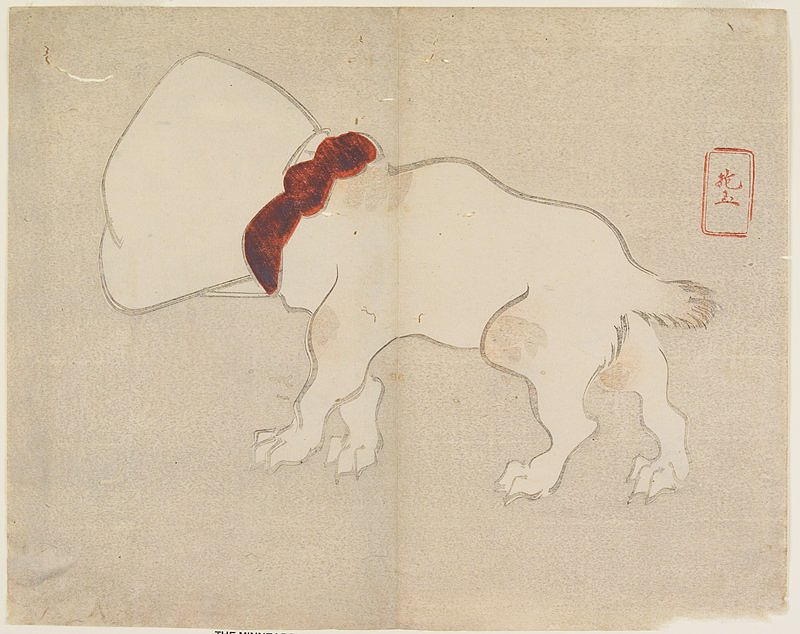
Yamada Hōgyoku: Dog with Bag Over its Head (1830s)
" … there could be worse fates than smothering on tradition."
Who knows where traditions get started? Who knows where they end? Some arise from innocent mistakes. Others seem more tenacious habit than anything resembling the presence of grace. A few seem genuinely sacred, in that neglecting to observe them seems more sin than oversight. Family traditions might hold no known origin, like the old apocryphal story about the preparation of the Easter ham, which had always included the traditional step of cutting one end off the ham. The youngest great-granddaughter asked her mother why she cut off the end of the ham and was told, "Because that's the way my mother prepared it." So the great-granddaughter asked her grandmother the same question and received the same answer. She finally asker her great-grandmother, who had apparently started the tradition way back during the Great Depression. "Because the only pan I owned was too small to hold the ham, Great-grandmother explained. Some traditions seem like metastasized necessities.
In my family, one tradition began as a small shortcoming.
SynchronicitySwarm
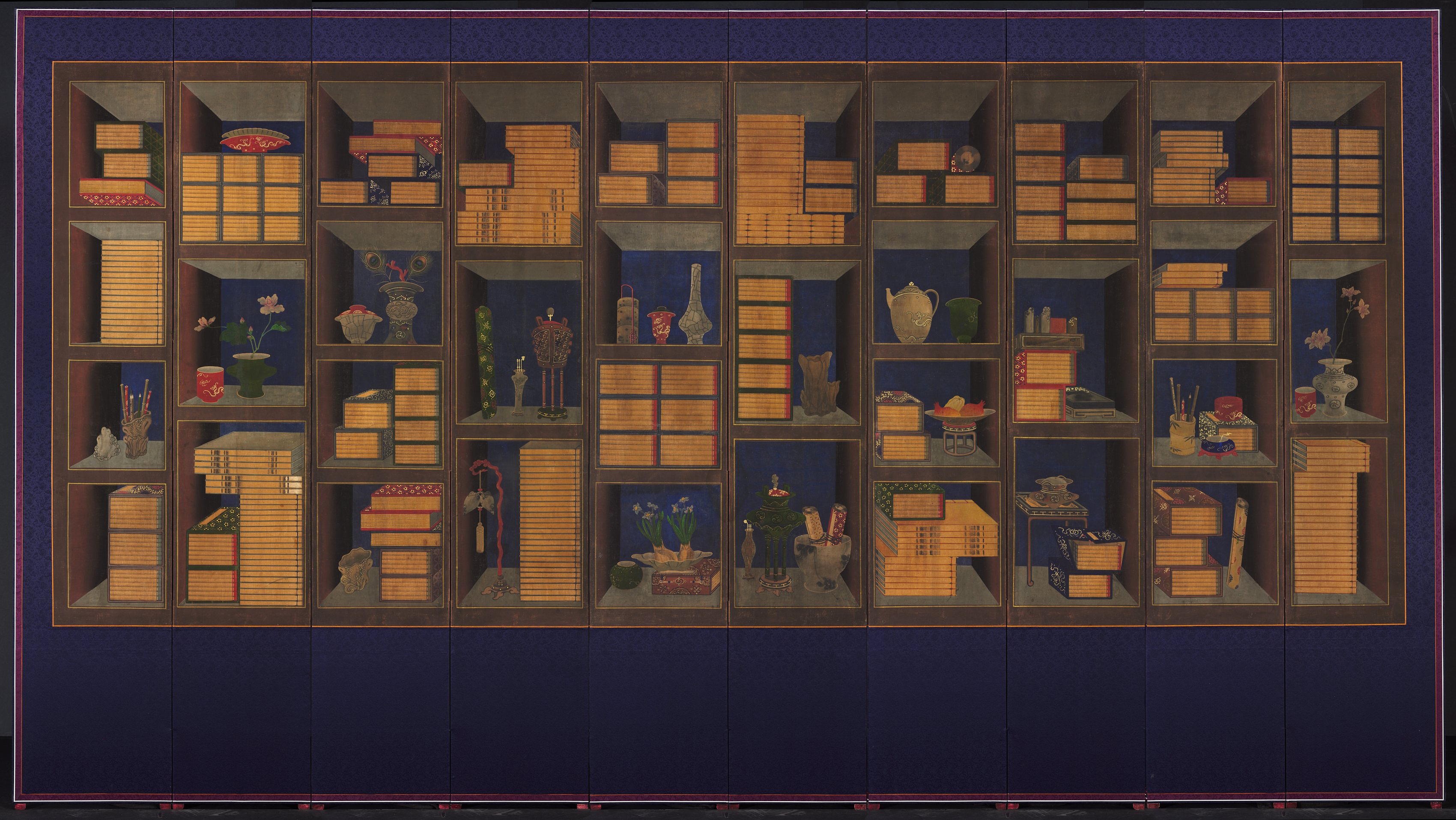
Yi Taek-gyun: Books and Scholars’ Accouterments
책가도 (冊架圖) (late 1800s)
Ten-panel folding screen; ink and color on silk
" … the research librarian remains a doubtful skeptic."
The Muse and I moved down the Portland sidewalk like the old hands we were, for she had just been recalling that I'd brought her to this neighborhood on her first visit, twenty-five years before. She said that she did not miss the bustle of living in a city, though, as we slipped around a clog of people doing jello shots and smoking at a sidewalk bar. The restaurant that used to tout its hundred beer taps now advertises its space for lease and this city seems weary and confused. From our hotel room, high atop an anonymous city center tower, I can look into the upper floors of a marvelous old tile-fronted office building, its upper floors just as empty as any abandoned warehouse, and no more elegant. New development continues, surrounded by vacancies and boarded up storefronts.
I feel enlivened by the variety, though, the juxtapositions attract my eye.
Blistering
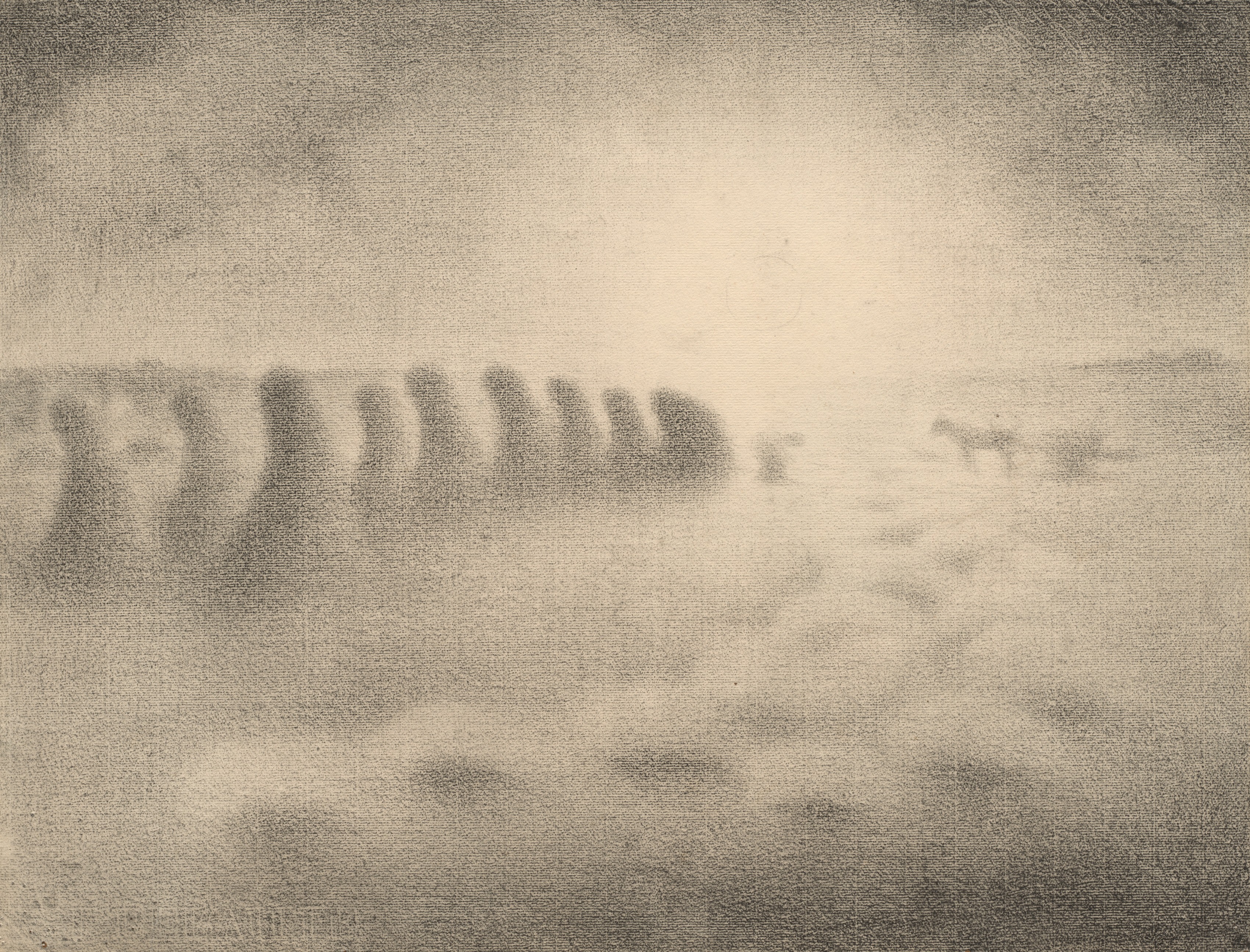
Charles Angrand: End of the Harvest (c.1892–1905)
"Nostalgia omits many details …"
As August draws near, the annual counterpoint to deepest, darkest Winter emerges, its opposite to polar, Blistering weather. It, like most opposites, produces a remarkably similar result to its mirror: doors and windows shut tight against the outside, a kind of hibernating happening in. By eight in the morning, it's become uncomfortable out there. We've already drawn the shades and turned up the air conditioning, and set the box fans blowing. The overnight low came just before sunrise and barely fell below eighty degrees Fahrenheit, 26C. It's Blistering.
I set sprinklers in darkness, running them until an hour after sunrise, when evaporation renders them wasteful.
Absolution

Noël Nicolas Coypel:
The Miracles of Saint James the Greater (1726)
"I can breathe again!"
Who seeks Absolution by going to the dentist? Who, that is, besides me? I hold a convoluted story about my recent relationship to dentistry, one which I'm uncertain I should share, which explains why I'm choosing to share it, under The One Must Speak What's Not Supposed To Be Spoken About Rule, one of my personal Ethical Responsibilities. That twinge suggesting I should stay mute on a subject too easily becomes an excuse to stifle myself and I'm reasonably certain that my purpose here might never have been to master self-stifling. I'm not struggling to justify disclosing embarrassingly inappropriate details, just something perhaps painfully necessary, a shortcoming and its accompanying redemption. An act of Absolution.
I do not believe that my primary purpose here was ever to pass judgement, either.
StrongLeader
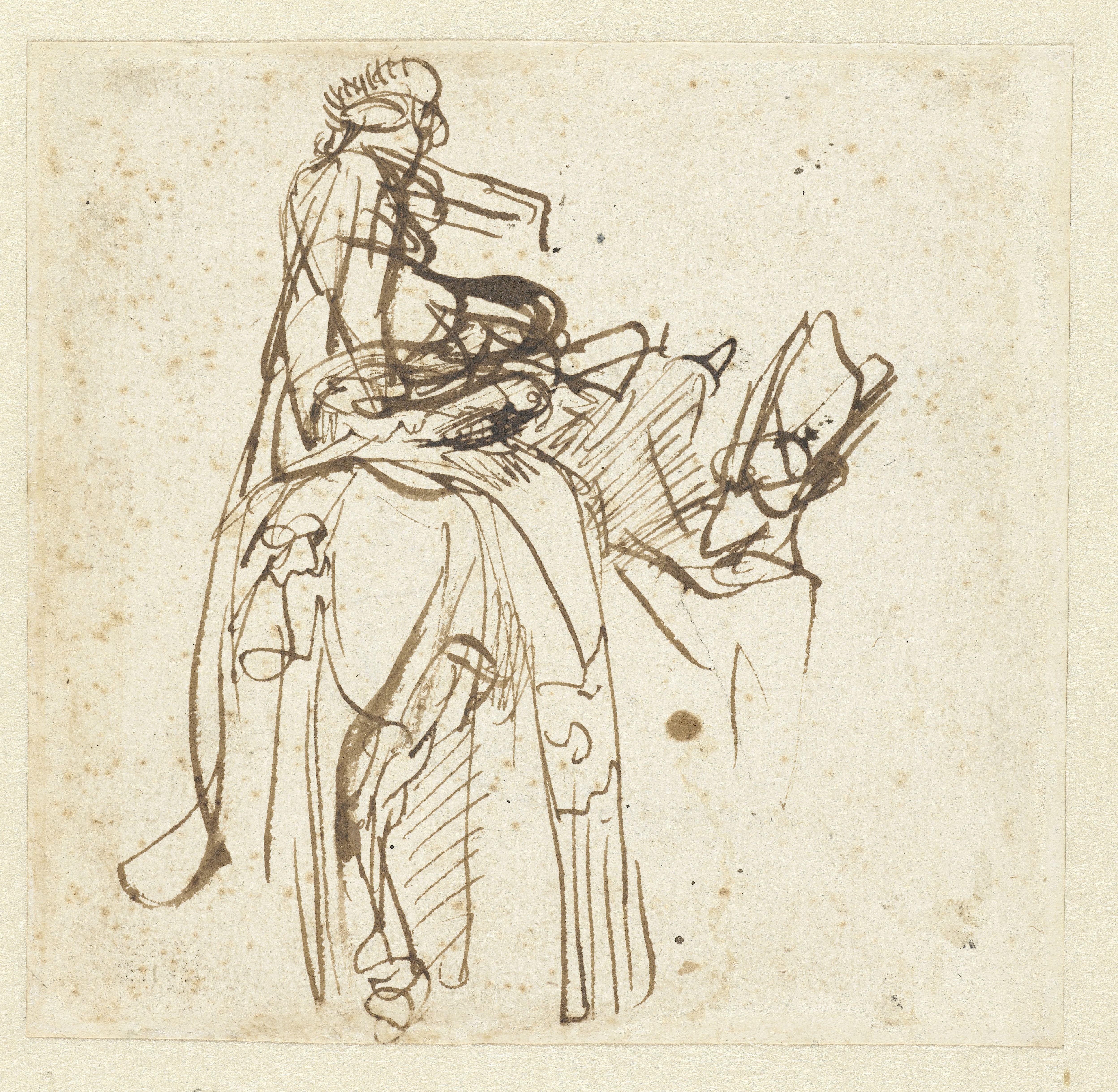
Rembrandt van Rijn:
Man Helping a Rider to Mount a Horse (c. 1640-41)
"Vote for the one not trying to impress you."
Lord, help us, please, resist the StrongLeader's seduction, for we do not need StrongLeaders. We need leaders who can do their freaking job without continually plotting strategies for getting away with breaking the law they swore to uphold. We do not need leaders who just make stuff up as they go along, who act upon their animal urges, who hold eternal grudges. We need leaders capable of leveling with themselves and their followers, ones who eschew the trappings of power, rather than those who seem to need to impress, anyone with mommy or daddy issues. We need clear-eyed adults, ones who've dealt with their stuff, ones who might have crashed and burned before, ones who remember who they are and were. We need magnanimous ones, ones willing to kneel before their followers, in service to their supporters, ones who won't pander to get ahead. Ones with a head on their shoulders and a heart in their chest. Ones for whom good enough is best.
Il Duce, Mussolini, was the prototypical StrongLeader.
Reverting

Jacob van Ruisdael:
Landscape with the Ruins of the Castle of Egmond (1650/55)
" … face being all grown up …"
Contrary to how I might appear to any naive observer, I have not quite grown up yet. I experience moments of maturity, sometimes stretching into full afternoons or evenings of it, but I remain capable off Reverting to earlier releases of myself with little provocation. Last evening, chopping garlic for supper, I sliced into a fingertip with the extra sharp chef's knife and instantly reverted back into a five year old child. I yelled for The Muse while rushing into the small bathroom off the kitchen where I grabbed a handful of Kleenex® and whimpered. I became essentially helpless for the balance of the evening. The Muse had to finish prepping the supper I had almost managed to finish preparing, even though it was clearly my evening to assemble supper. The Muse clucked over me, suggesting that I might need stitches, while I switched out tissues and waited for the worst of the bleeding to stop.
I felt inconsolable inside. No amount of care could have erased that error.
Failure

Paul Cezanne: The Basket of Apples (about 1893)
" … everyone eventually becomes."
There's nothing quite like being greeted at a restaurant's reception desk by the question, "Just you?" Of course the greeter means no insult, but The Muse and I always fein offense and ask, "Just? Are we not enough?" The greeter briefly blushes before going back to more important business, like where to seat these clowns. Our point being that nobody's ever "just" anything. We're much, much more and never simply one thing.
At my age, I can easily claim to have been a Failure, but not "just" a Failure, for I have also at times been a success.
Recipe
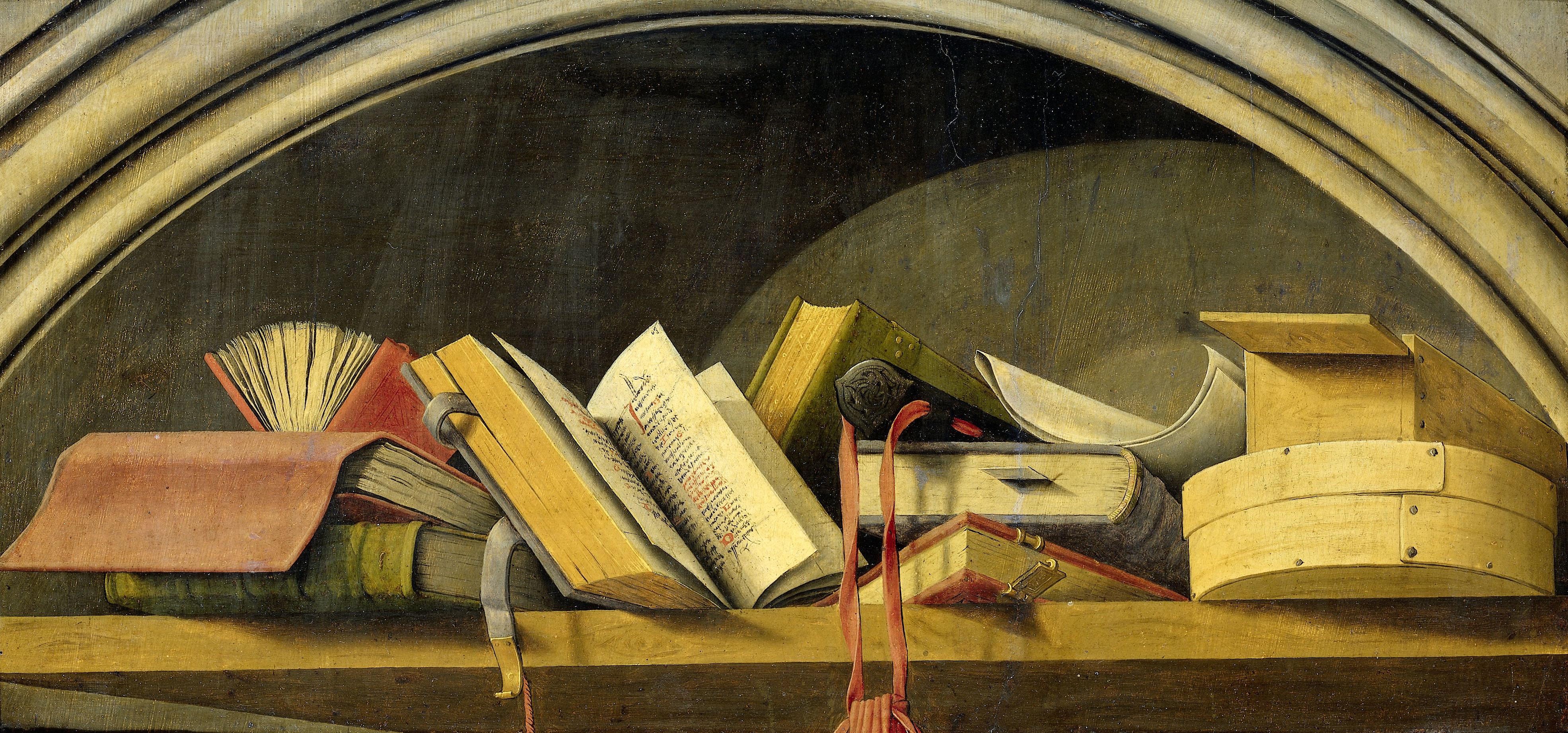
Barthélémy d'Eyck:
Still Life with Books in a Niche (1442 - 1445)
" … I will struggle to respond."
I am sometimes asked to recite a recipe for something I've made and I always struggle to respond because I don't usually use recipes. Oh, I might reference one to understand proportions—how much water to how much rice?—but I rarely very slavishly follow any instructions. Recipes seem the very epitome of frozen action, listing stuff as if stuff could be listed, sequencing actions as if sequence mattered. Consequently, I do not bake things because baking is too exacting, demanding slavish adherence to rules which successfully distill action into script. I'm not that kind of cook. For me, cooking seems more discovery than recitation. I'm never quite certain how to cook anything. Even if I've cooked something similar before, I've forgotten precisely how I prepared it and I did not write down my discoveries. I consequently do not cook the same thing once, let alone twice.
I am a man of simple tastes.
Unintentionals
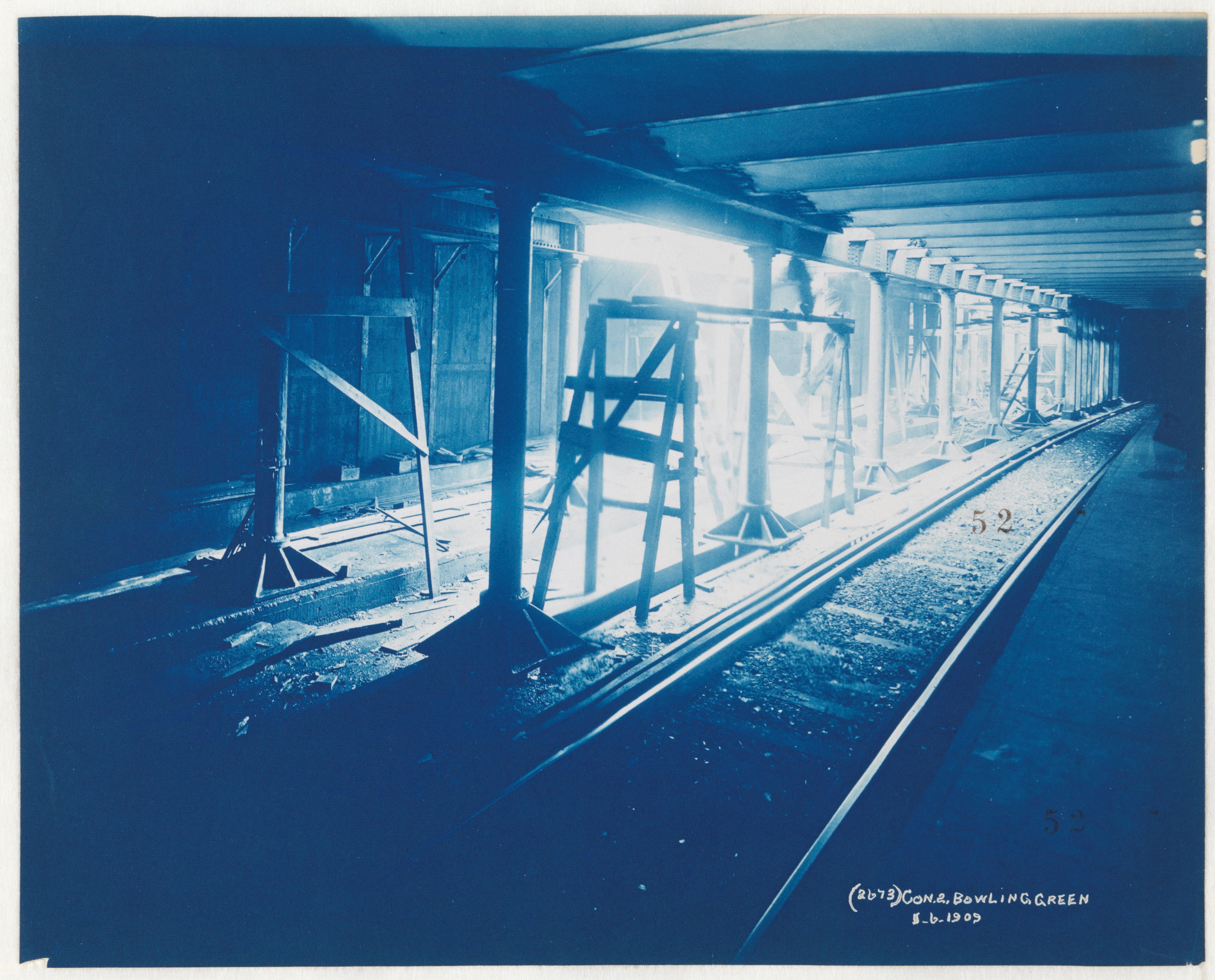
Grant W. Pullis (attributed to):
Construction of the New York Subway (1908)
"Might just as well embrace the inevitable."
My early mentors cautioned me about unintended consequences, apparently inescapable side effects of every significant effort. Setting out to change any world will very likely set into motion forces which will certainly change something else, too, and those side effect changes might well become the effort's legacy, like that county sheriff in coastal Oregon who decided to rid the beach of that rotting whale carcass with a little dynamite. He managed to cover a sizable crowd present to witness the transformation, including news cameras from Portland, with a thick patina of rotted blubber. This one act became the entirety of his legacy, thanks to a single unintended consequence.
Other Unintentionals seem possible, though, positive ones.
SacredDuty
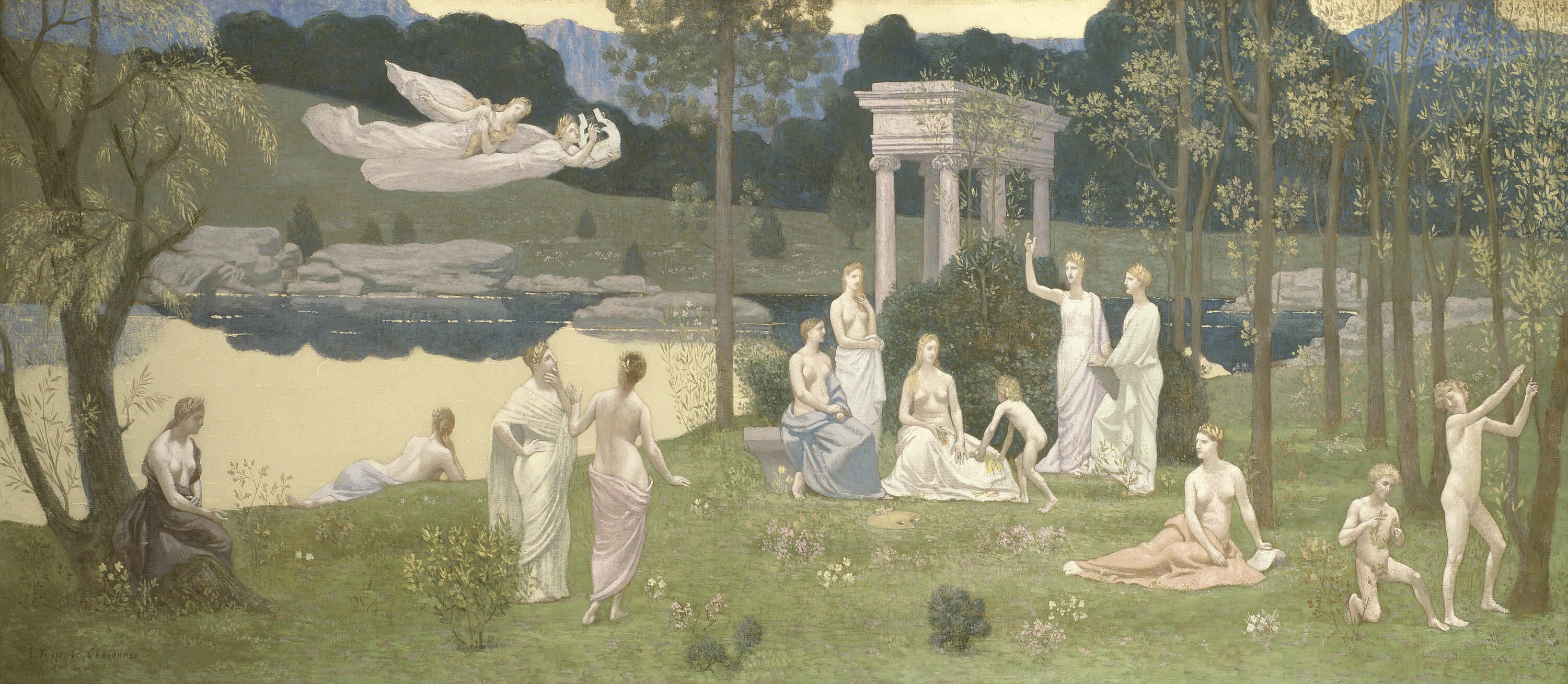
Pierre Puvis de Chavannes:
The Sacred Grove, Beloved of the Arts and the Muses (1884/89)
" … if any of us can still muster any of that within ourselves."
While it might seem unlikely from within anybody's daily routine, I believe that we each labor within an often tacit SacredDuty. It doesn't very much matter our occupation, we each hold a similar obligation, to each other, to ourselves, to our society, however wounded or unjust each might appear to be. We hold this SacredDuty for our own good and for the good of those around us, for the good of the universe, if you will, if I dare mention it. It probably doesn't matter where any individual acquires their sense of duty, their specific marching orders, though it matters much whether an individual received theirs and whether an individual managed to hold theirs sacred, to respect it and to actually attempt to live up to it. However we're each employed, we each report to the same supervisor, the same cruel overseer, and that ruler is us, ultimately our 'I', and no other, though we each might start with a mentor, an exemplar or two who attempt to clue us in to ourselves and our duty, and to our own sacred nature, with varying degrees of success.
The House Select Committee's Public Hearings on the Events of January 6, 2020, reminds me of the presence of such a thing as SacredDuty.
Nocturnal
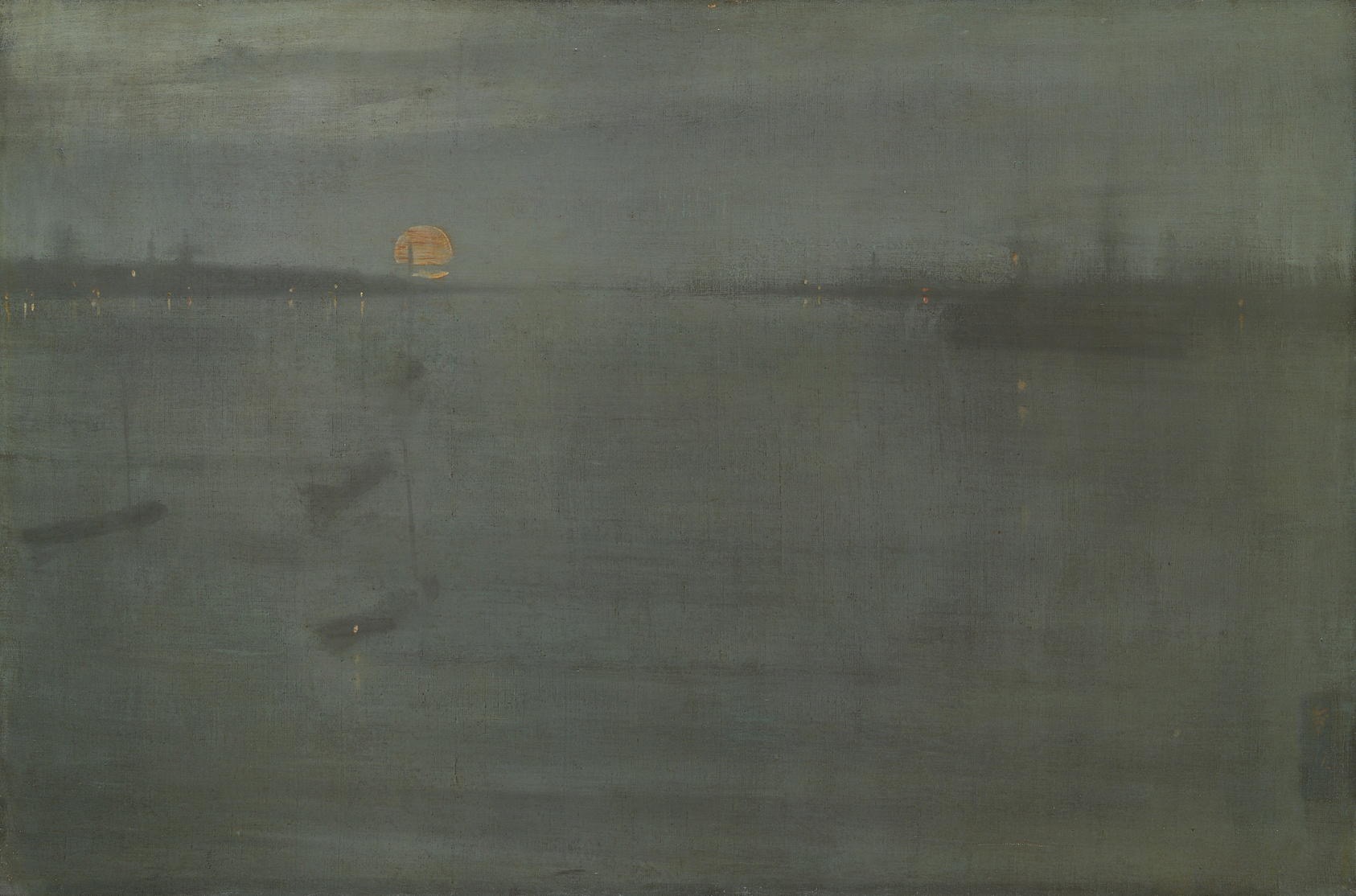
James McNeill Whistler:
Nocturne: Blue and Gold—Southampton Water (1872)
" … revel in the respite my predawn time brings."
In the highest summer, I turn Nocturnal. My usual habit of rising early becomes more than habitual but essential to the simple maintenance of life. Oh, the mornings remain mostly tolerable, at least until around ten, then the day degrades into near unbearable brightness and glare. Working out there becomes essentially impossible, for I will not, under any circumstances, wear either short-sleeved shirts or shorts, due to an unfortunate family history with sunlight. I exclusively wear long sleeves with cuffs buttoned against the sun and my usual long' legged jeans. My only concession to the season will likely be sockless feet. I'm not wearing sandals, either. I will also wear a broad-brimmed hat or one of my many havelocks. I'm as tucked up against the summer sun as any burqa wearer might be against temptation and sin. If I'm working, I'm also wearing gloves.
What do I wear when I go to the beach?
Inducing
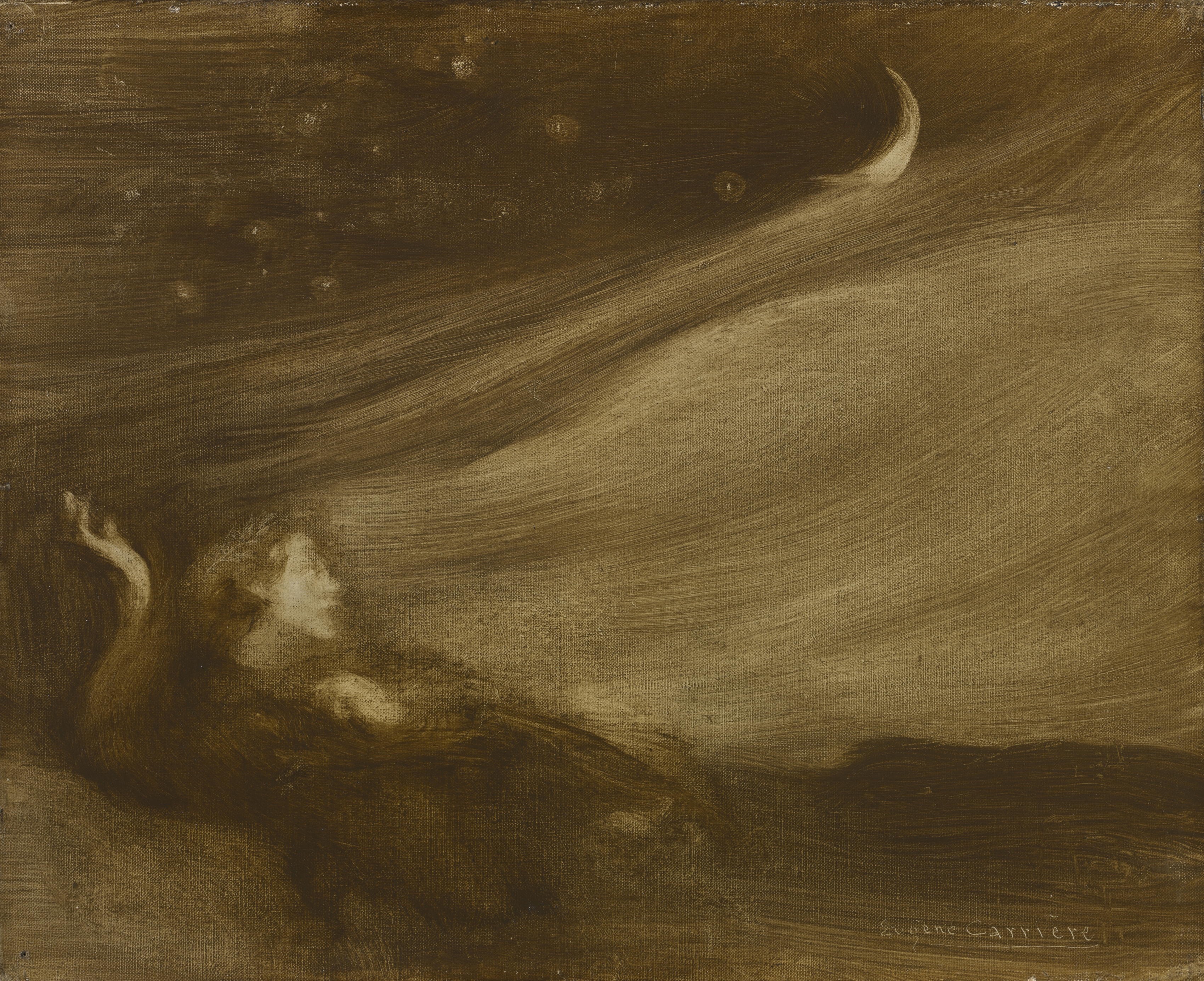
Eugène Carrière: The Contemplator (1901)
" … to thoroughly enjoy not being fully there."
I'm not so much working as actively Inducing, successful to the extent that my actions entrance me into satisfying action. I could not possibly have managed to complete the work I finished yesterday had I been fully present for the festivities. I was up and out early, climbing scaffolding again, finally finishing that busy slice of wall that had long been my dread and fear, my nemesis. I had by then conquered her. I'd even removed all by myself the rubber matting the electric company lineman had wrapped around the formerly terrifying incoming electric wires, an unimaginable act a few long months before. I was for that day, the self-acknowledged master of that stripe of wall. For my final act, I called in the cable company technician to replace the worn and weary-looking cable line coming down from its anchor, and to tuck it in around the conduit pipe and tie it down with fresh zip ties so it looked as nice as the rest of the wall. No outstanding anything after finishing a couple of final touch-up soirées up to the top and back down again. Then, my reward was tearing down that scaffolding to reconstruct it one click to the right.
I was crawling all over that wall like the monkey I am not.
EverydayMysteries

Paul Gauguin: The Call (1902)
"I just let these EverydayMysteries be …"
The older I grow, the less I seem to know for certain. This outcome surprises me, if only because I naively believed nearer the beginning of my life that I would become, if not older and wiser, at least older and more knowledgable, but this has not been my experience, unless I count stuff I've come to know for certain isn't reliably knowable. So the number of mysteries I juggle has greatly expanded while the number I manage to resolve has plummeted. I'm okay with this state of affairs if only because there seems to be nothing I can do about it other than accept and perhaps revel in it. It's just the way it is.
Earlier in my life, I dabbled with becoming somewhat of a detective, for I'd convinced myself that if I just applied myself, I could come to understand pretty much anything.
Touched

Henry Wolf: The Torn Hat (Date unknown)
"We're here to touch and to be Touched in return."
By the time I've nearly completed repainting another stripe of wall, I've Touched every square centimeter of it several times. Looking at The Villa from down the street, it seems unlikely from that distance that anyone ever touched even once every square centimeter of that looming hulk, let alone touched it several times. The property deed and mortgage papers never mention the unsettling fact that the actual price of owning this place would be the willingness, the patience, to do precisely that, or to hire another to do it for me. I entered into the agreement willingly and ignorantly. I suspect that nobody ever understands such implications in the moment when making such commitments. Those consequences come later, well after the initial thrall disperses. Then, anyone might find reason to accept that they must have been crazy to sign such a contract, then set about making it good, whatever the price.
While I busy myself touching several times every square centimeter of this place, this place is touching back, because Touched seems a two-way arrangement.
Torn

Jheronimus Bosch (manner of): The Temptation of St Anthony
(c. 1550 - c. 1600)
"… to better appreciate my many shortcomings."
"The requirements for design conflict and cannot be reconciled."
David Pye: The Nature of Design
When I'm painting, I'm also pining, for I shirk other responsibilities while fulfilling my repainting one. The rest of my little overwhelming universe does not freeze until I find time and focus to attend to them. They continue unsupervised, yellow-blooming clover conspiring to overtake my lawn, the annual purslane bloom taking root. The side of the house I'm painting is presently living up to my highest standards of maintenance while the rest of my existence slums it. I only have so much to contribute and, as David Pye reminds, the requirements conflict and cannot be reconciled, always have and always will.
The notion that I should be able to keep up, to not merely juggle all those chainsaws, but to simultaneously operate a hot half dozen of them, that seems to be the source of the problem.
Clusters
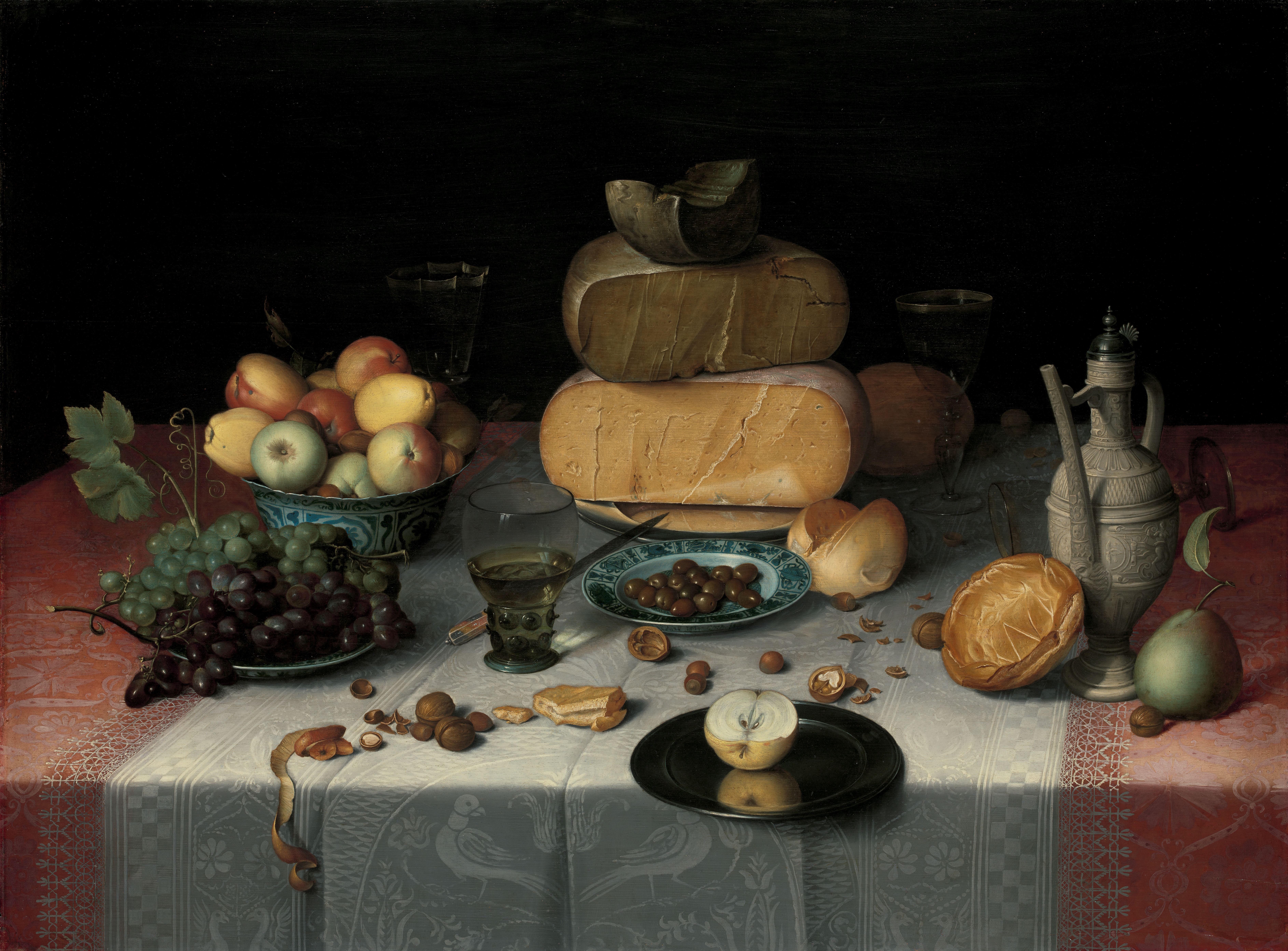
Floris Claesz van Dijck: Still Life with Cheese (c. 1615)
"For me, it's only sometimes something …"
It would be news to nobody if I reported that things tend to happen in Clusters. Nothing much will happen for the longest time before a single week will bring a flurry of activity. Often, stuff will break down together, as if unrelated stuff were secretly conspiring and dedicated to causing only occasional trouble. Visit one repair department and you'll probably visit a half dozen in quick succession. It might be a law of the universe guiding this sort of thing.
A week ago today, I managed to swipe my watch off my arm by bumping into a crosspiece on the scaffolding.
NightDrive

Charles François Daubigny: Night Effect (1862)
"Imagine how appreciative The Muse must have been!"
Of all of humankind's truly ingenious inventions, the headlight must certainly rank just below the bottom of the list, for headlights simply do not work for the purpose intended. Some do, indeed, light the way, but only paradoxically, for if they enable me to see, they blind everybody coming toward me, clearly violating the First, Do No Harm Clause of Design and Manufacture. A NightDrive easily turns into a life-threatening experience because of this one piece of so-called safety equipment. How would an automobile designer resolve this grave shortcoming? Maybe by switching to the infrared spectrum? How am I supposed to know? I'm just the victim of this design, not its inventor.
The Muse will insist that my complaint lies with the remnants of that cataract surgery I underwent four years ago this month.
CuttingIn

Piet Mondrian: Composition (No. 1) Gray-Red (1935)
"The library's a function of the quality of its shelves."
Prepping finished, priming finally done, the time comes for adding color. Up until then, everything's focused upon foundation, the sole purpose being to create a consistent surface: as smooth and uniform as possible. The prime coat serves as a proof of sorts, a test to determine if the surfaces have been sufficiently worked such that they might hold the promise of a decent-looking final finish. Of course it doesn't quite satisfy the discriminating eye, so that prime coating features a little back-sliding, some additional sanding, scraping, and filling. The eye always misses something the first few times through. At the point where color comes into play, the game changes. Before, I'm focused upon the broad plain of the surface. Edges between trim and wall color become meaningless. I work when priming as if there were no edges. Once the colors come out, the whole game becomes one of CuttingIn the fine lines separating the various trims and the base wall color.
Once finished, the eye will fail to register much variation on a properly prepared surface.
MadMen
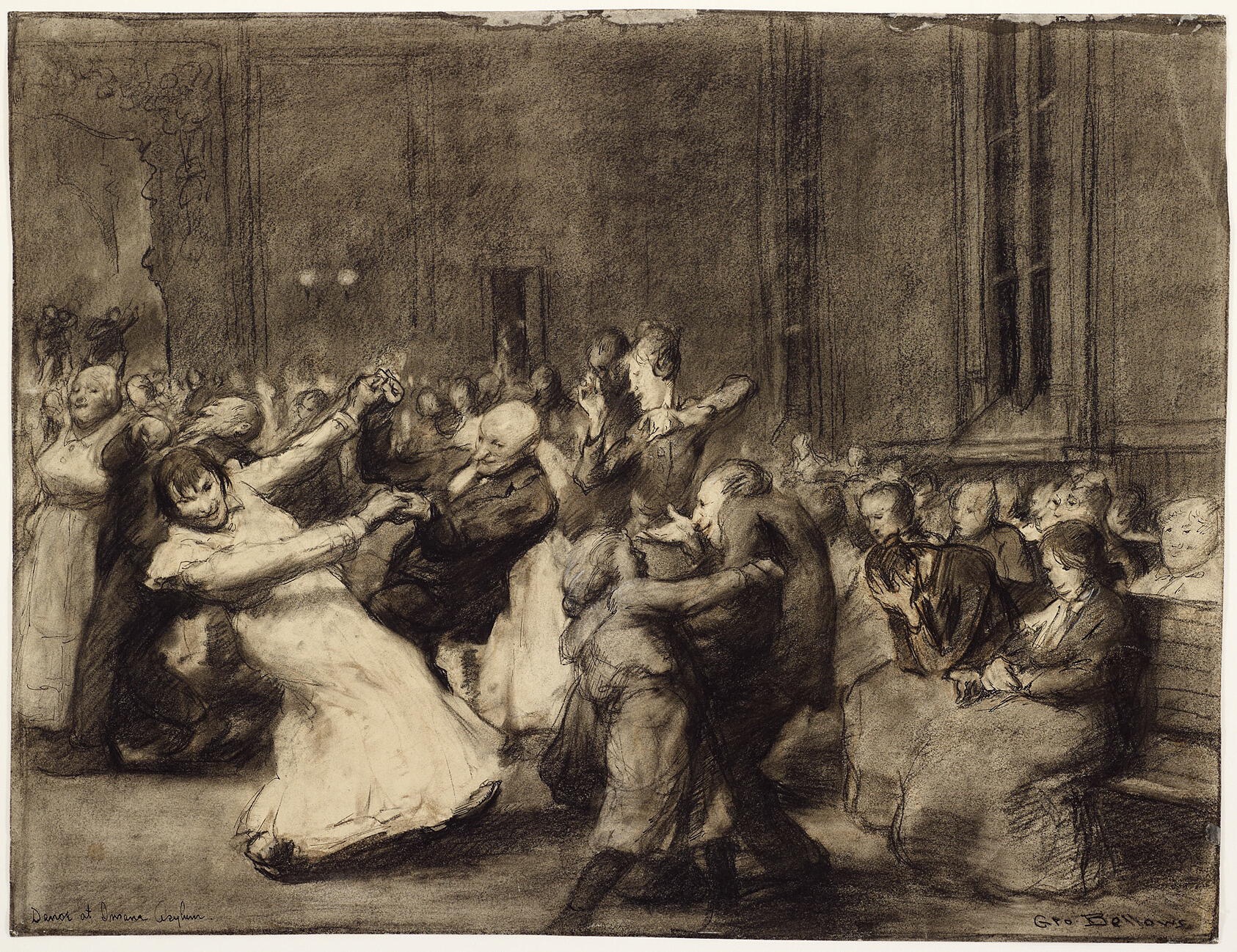
George Wesley Bellows: Dance at Insane Asylum (1907)
"You eventually became just another part of the problem …"
Who has not caught themself working for a crazy boss? Who has not found themself laboring within some crazy-making context? Who has not caught themself questioning their own sanity as a result? That questioning one's own sanity seems to be the one reliably meaningful way for validating one's own sanity, for the truly crazy never seem to question their own context, their own motives. So much seems absolutely presumed without questioning, and those presumptions can carry considerable weight and exert much subtle influence. It properly feels as though you never learned the rules and so seem especially unperceptive to yourself. The guy in charge poisons everyone's facility to properly assess reality. This seems primarily the work that MadMen accomplish. They warp the reality around them.
The challenge for those not actually crazy comes with the resulting crazy-making context.
FreshInfinity

NASA on July 11, 2022,
released the first full-color image
from the James Webb Space Telescope.
(NASA/AFP/Getty Images)
The new image is what is known as a “deep field” observation, with the telescope staring at what NASA called a “patch of sky approximately the size of a grain of sand held at arm’s length by someone on the ground.” NASA Administrator Bill Nelson as quoted in the July 12, 2022 Washington Post
"Would that our native sense of self-importance were not expanding faster than our universe."
The James Webb Space Telescope might be the largest rear view mirror ever produced. Capable of reflecting thirteen billion year old light, it provides formerly unattainable resolution. It represents just a next step, but one doozy of a step. In my lifetime, infinity has undergone multiple radical expansions, from the planetary outward, every few years, a deeper penetration became possible, and with each further immersion, the scale of my own existence, my problems, fell from the all-consuming into the infinitesimal. If the above image reveals what's visible out there through a grain of sand-sized lens, I understand in a new way just how incomprehensible this universe must be, by which I mean, that it's clear that I understand nothing at all about anything.
I consider this reset necessary and important, for without periodic refreshers on the scale we're actually dealing with, people can and do become subsumed with self-importance.
Dedicting
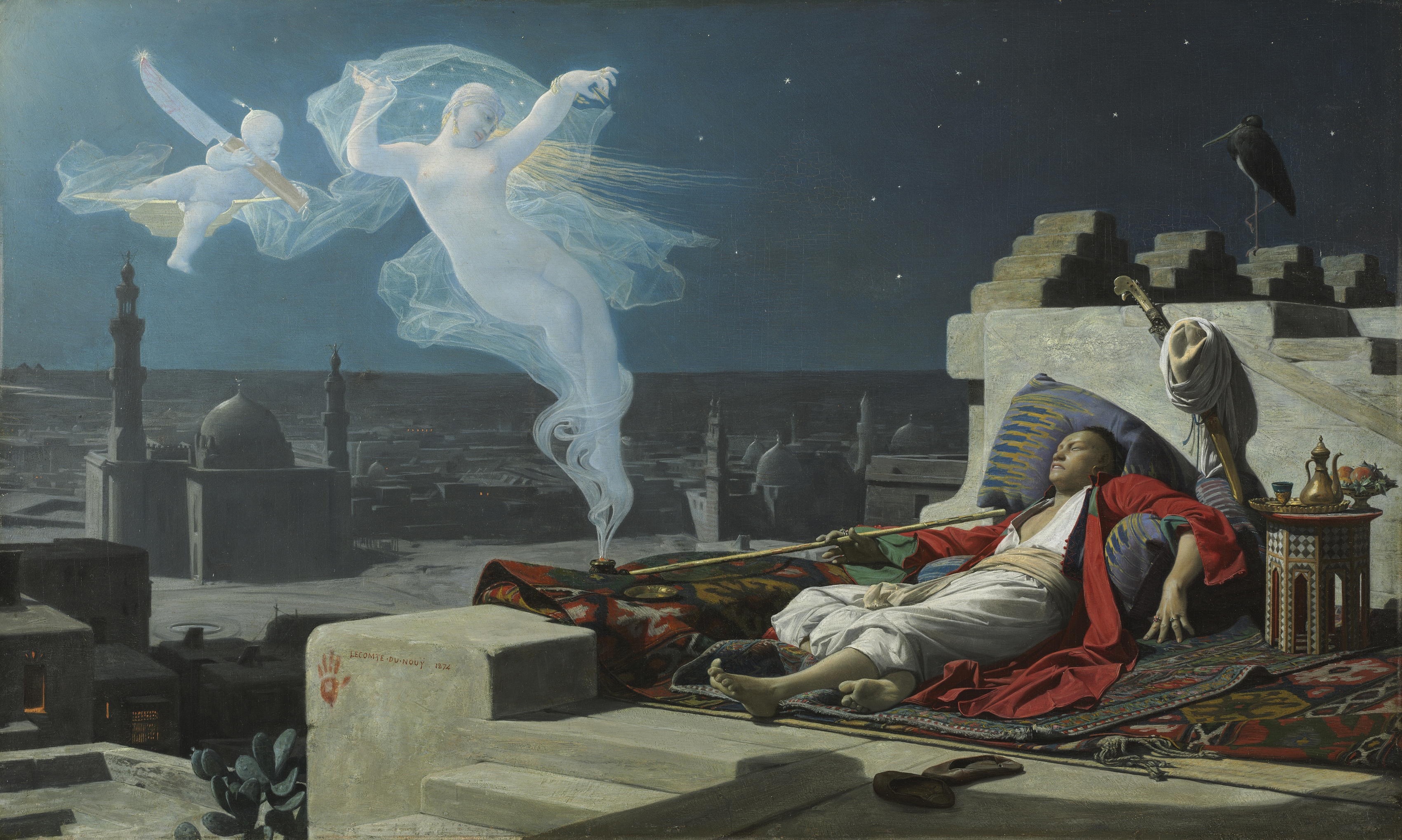
Jean Lecomte du Nouÿ: A Eunuch's Dream (1874)
"That exquisite poison has no substitutes …"
By my accounting, I stopped ingesting nicotine a year ago. I mention that now because it's only very recently occurred to me that I have been Dedicting ever since, that I have been attempting whatever the opposite of addiction might be. I'm uncertain if I have been successful, for the Dedicting continues. I considered calling this story Dedicted, except I doubt whether I'll ever experience a definitive moment when I no longer feel either that tug or its absence, either of which constitute a sort of continuing relationship with the substance. It might be true that nobody's ever through with any physically addictive stuff, and/or that stuff's never truly through with them, for the attraction seems to go both ways. Tobacco's superpower lies deeper than just in the souls of its admirers, but also in its apparent ability to attract individuals unto itself. It seems to find its most appreciative followers.
It was a special class I once belonged to, the smokers.
Preparings

Giovanni Battista Gaulli: Sketch for "The Four Prophets of Israel"
[for Il Gesù, Rome] (c. 1675-1677)
" … perfect's almost just as relative as done ever was."
Preparing should be considered an exclusively plural term, since preparing rarely seems complete after a first iteration. Much suffering results from a fundamental misunderstanding presuming that preparing or, indeed, preparation, should be completable with any single pass, when few can be; so few that for most every everyday intents or purposes, one should presume preparation's plural nature and think of preparing as a process better thought of as Preparings, presuming multiple iterations. One other catch lurks within this concept, and that relates to its fundamentally asymptotic nature. How many iterations prove necessary to complete Preparations? Think of this as a Fundamentally Unanswerable Question —aka FUQ (implied expletive intended)—because Preparings are rarely ended because they've achieved what might be easily recognized as completion. No, Preparings end only when the preparer decides they're done, a decision which might come at any time and for any of a wide variety of reasons.
Kurt, Our Master Painter, taught me this fundamental principle of painting, or he certainly tried to teach me this.
ReBeginning

Katsushika Hokusai: The Day Before the Beginning of Spring
(c. 1790) Publisher: Tsutaya Jūzaburōe
" … simply the sum of those restarts."
I imagine this morning that I am beginning, not merely beginning, but beginning again, ReBeginning. I've begun before. I've started way more than I've ever finished and I do not intend to correct that imbalance. Finishing seems way over-rated. The beginning's the thing. I figure that if I could only master beginning, I might be capable of anything, I might even, eventually, complete something, so I practice ReBeginning this morning in the belief —or is that a hope?—that this time, my efforts might finally amount to something.
I have been in the middle of the repainting project for so long that I can no longer remember the initiating premise for the work.
Exhausting
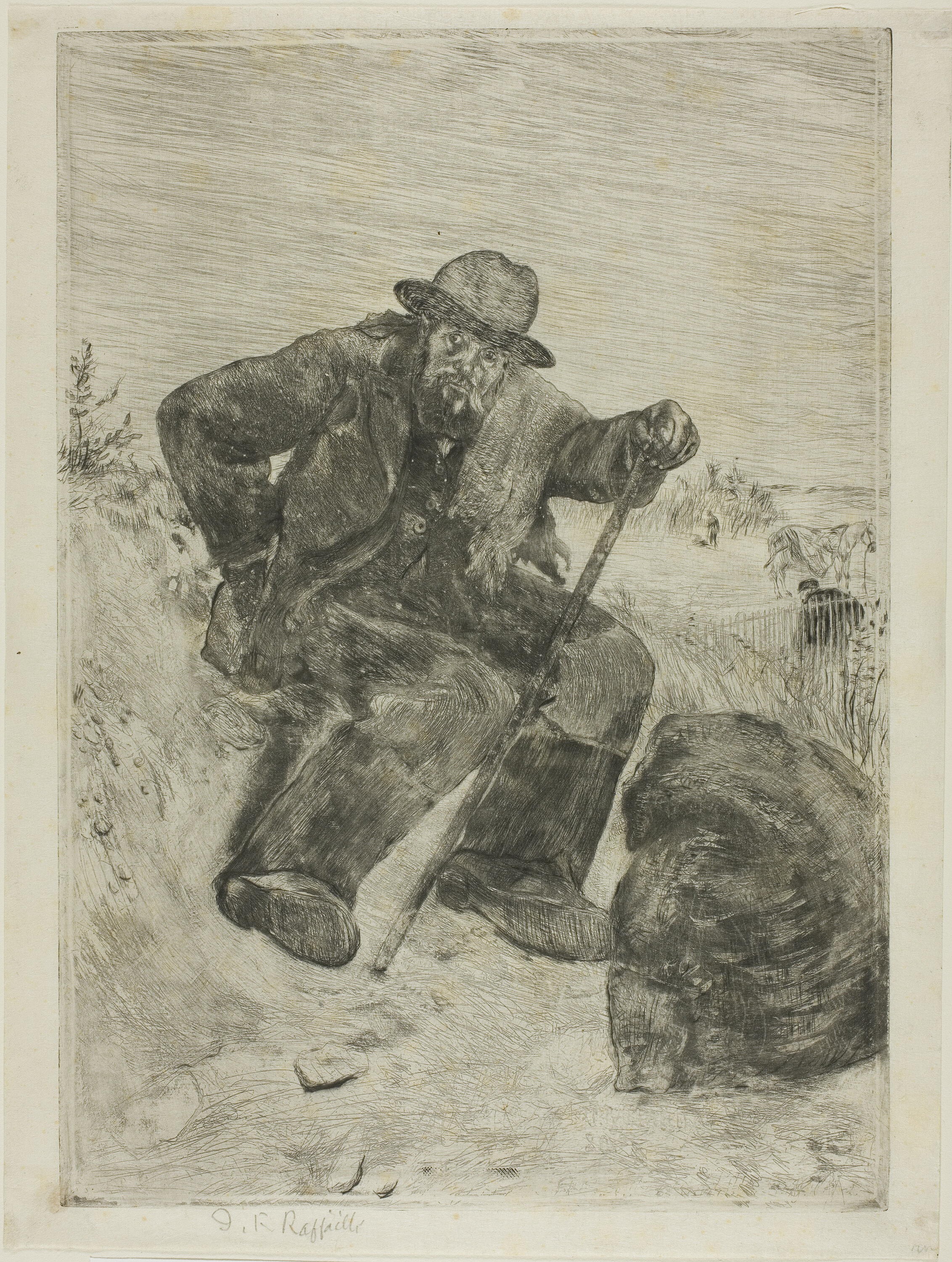
Jean François Raffaëlli: The Exhausted Ragpicker (1880)
" … simply too Exhausting to continue."
I've recently started noticing the weight this continuing Damned Pandemic exerts upon me. It's come to feel considerable, even unreasonable, and the newspaper promises even more of even more of the same, though the upcoming even more will continue becoming ever more highly evolved. It will become more communicable and craftier at evading our defenses, its offensive skills out-pacing our defenses. Since we must respond to defend, we're inevitably lagging competitors. Competing with this virus has been Exhausting, but insidiously so. It's never presented any particular hardship to me personally, for instance, to wear a mask in public or for this introvert to avoid gatherings. I rather enjoy going incognito and often chose not to go out into public places, though the option not to continue defending increasingly seems like a glaring omission. I'm just as free as I've ever been, just a little bit more constrained, yet the constraints, however small, seem increasingly limiting.
The experts label these feelings Pandemic Exhaustion and warn about its insidious influence.
HamSandwich
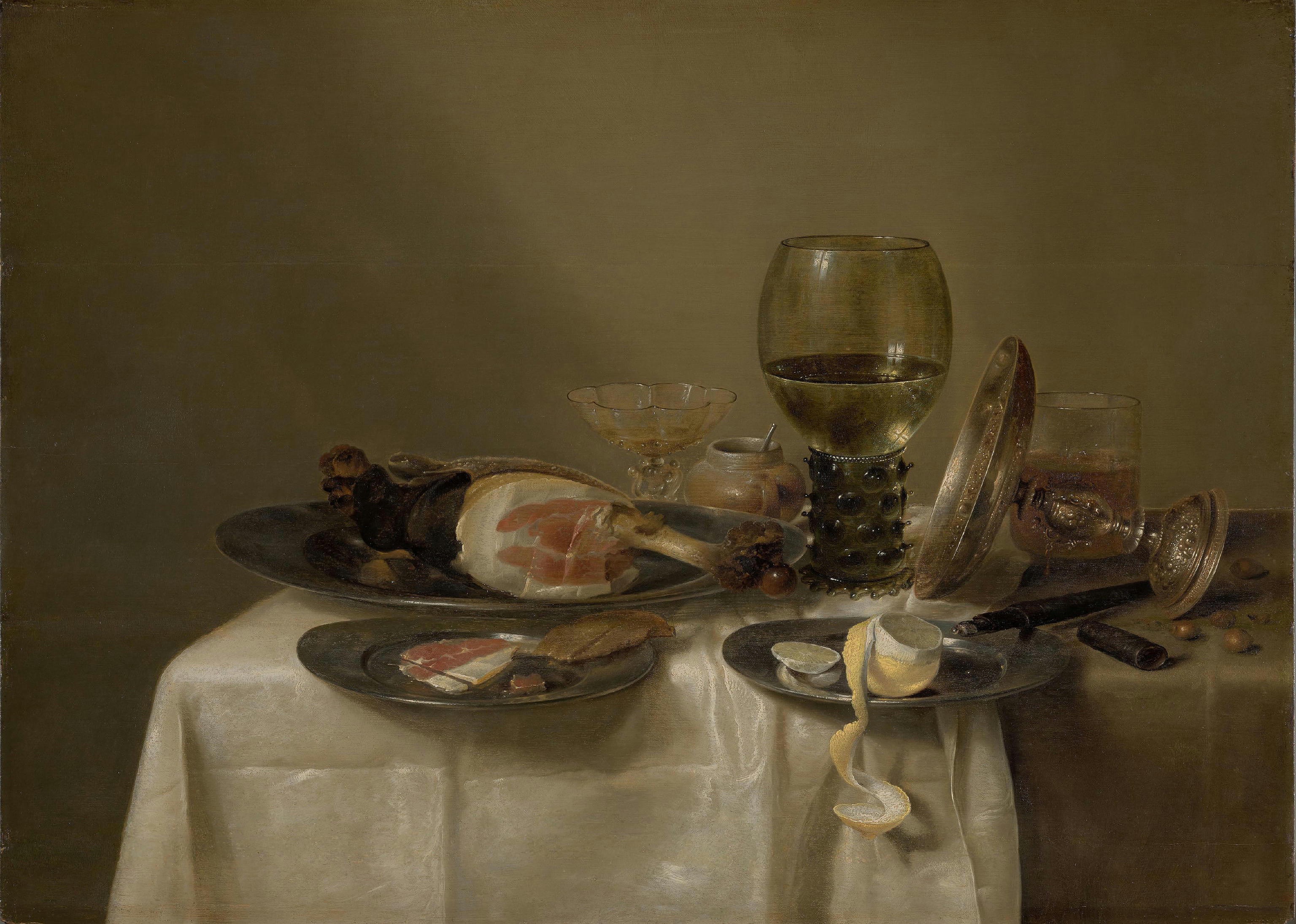
Willem Claesz. Heda: Still Life with Ham and a Roemer (1631-34)
" … the very stuff of despotism."
I will qualify what follows in advance, explaining that while I only rarely delve into what some might classify as political speech—as opposed to my usual more philosophical babble—I remain capable of engaging on the political level. Political talk rarely ages well, though today's story might straddle the political and philosophical, and might thereby consider itself more timeless than merely timely. Its topic seems timely, as this story has been aching for me to tell it. It's been my experience that while I'm avoiding telling a story that deeply desires to be told, whatever else I might produce tends to lack a certain substance. In that sense, it's like talking about what's not supposed to be talked about. Whatever else one attempts to talk about instead of what's not supposed to be talked about tends to miss the point, like an unmentionable elephant in the room sucking all the oxygen out of every alternative. I hope this story will prove to be pointed.
When Our Supreme Court codified the myth of fetal personhood into law, they managed to trivialize both the law and human life.
HolyDays
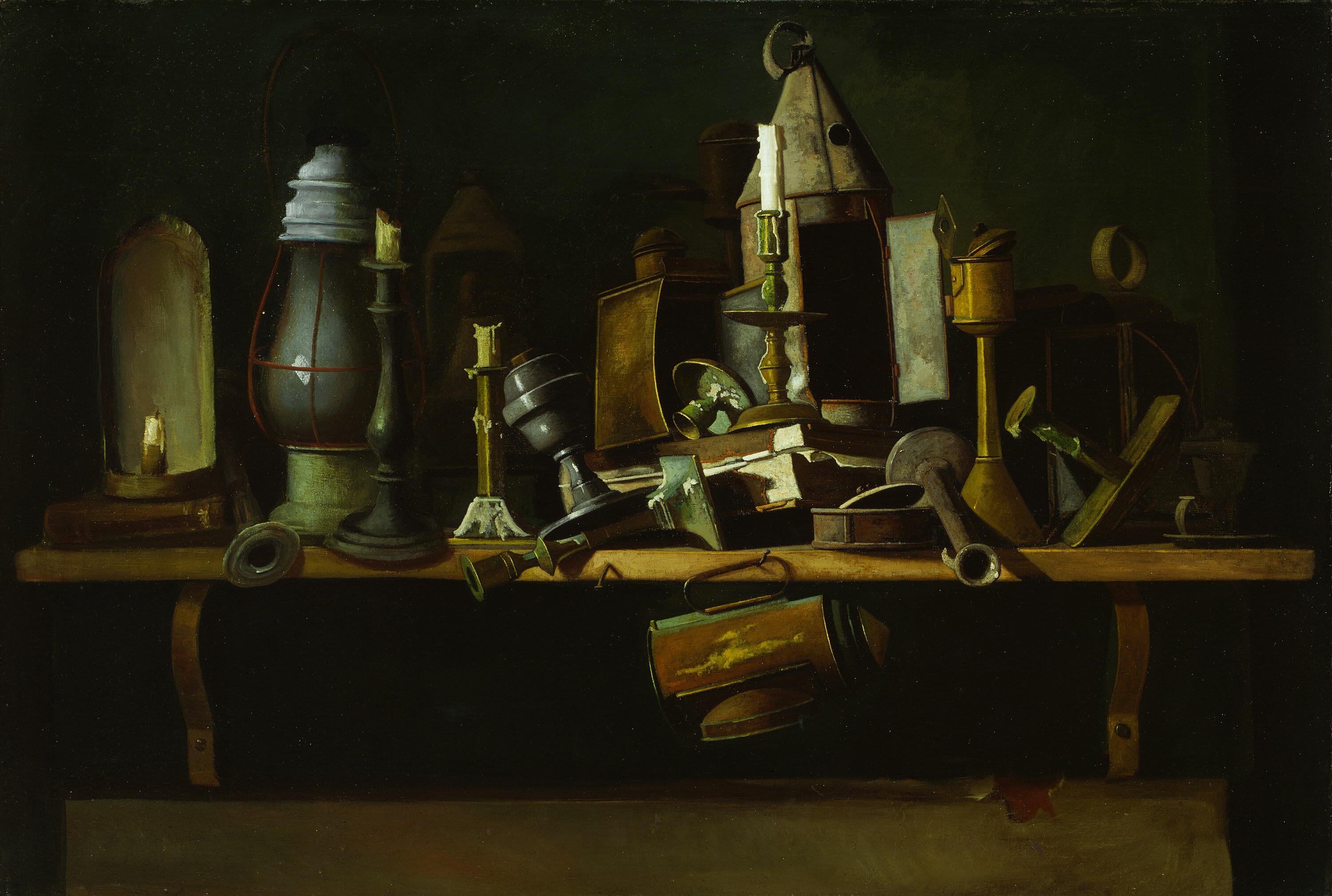
John F. Peto: Lights of Other Days (1906)
" … Have A Happy, anyway."
Us moderns do not celebrate HolyDays, we observe holidays instead. A Holiday serves as a secularized HolyDay such that even in the unlikely event that a Holiday started out as a HolyDay, most forms of actual religious observance, of humility, charity, or dignity will have been beaten out of any formal observance. One might succeed in privately genuflecting in the general direction of something genuinely sacred, but only if no spectacle's attempted. The spectacles belong solely to the secularists now, and are often performed with passion and fervor, but only in the general direction of mammon.
It's generally considered proper behavior to wish another "A Happy" on secular HolyDays, even if the greeting grates on one's soul.
Seasonal
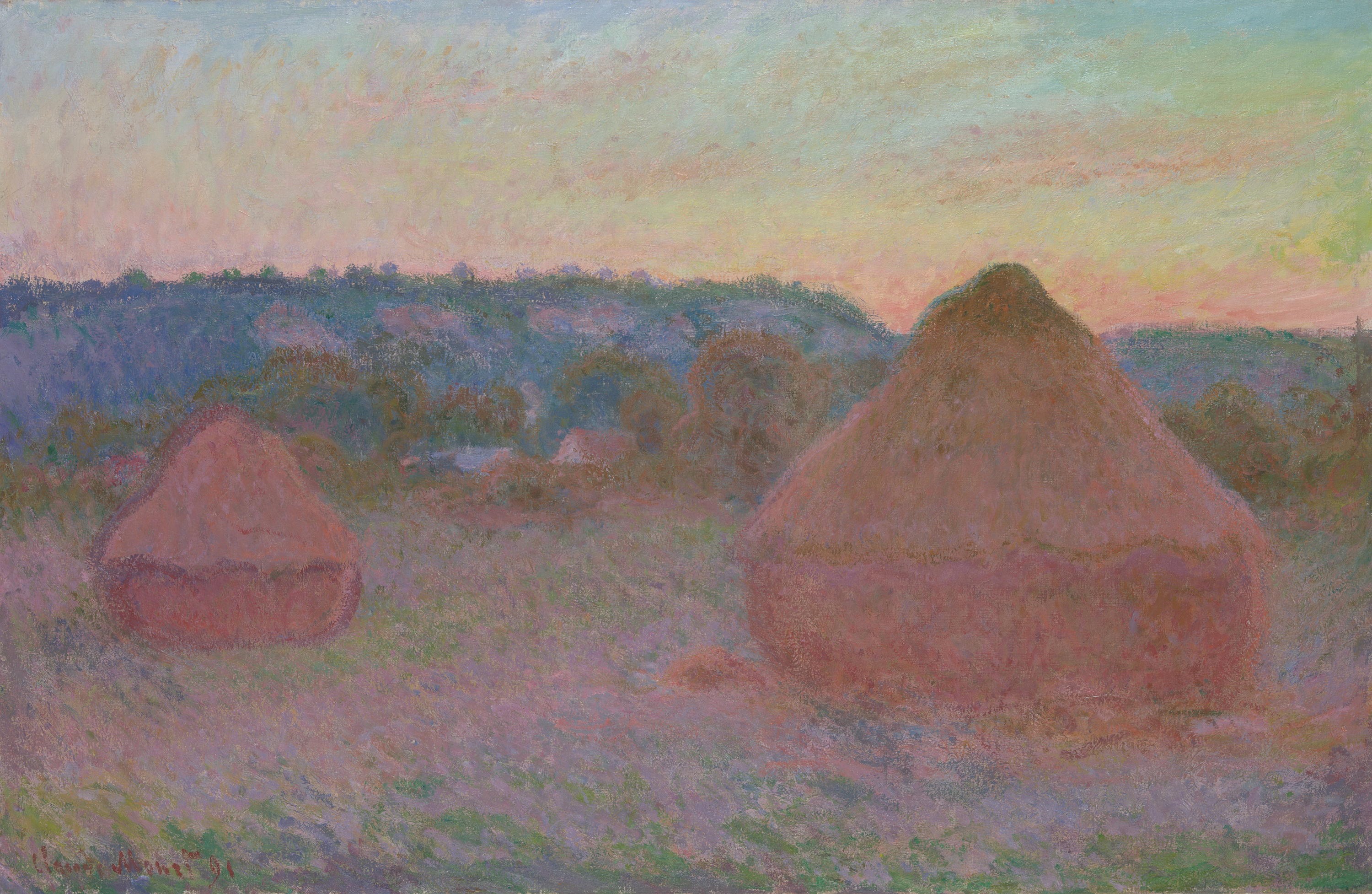
Claude Monet: Stacks of Wheat [End of Day, Autumn] (1890/91)
" … it's not usual, whatever that means."
Each season here carries certain markers which seem to suggest and regulate certain behaviors. We've been experiencing some unseasonal weather this year which has thrown off my usual anticipations and responses. I complained plenty this Spring about the rain which kept me off the scaffolding and away from my repainting project, even though we here have been cautioned to never, never, never complain about rain. This semi-arid region can always, always, always use more moisture and last year saw us limping through on much less than usual. Last summer, too little rain. This summer, a little too much so far. The wheat crop, which likes it hot and dry, has contracted rust this year. Crop dusters buzz around the valley trying to rectify that imbalance before harvest. When I step out onto the back deck at four o'clock in the morning to gauge the day's prospects, if the sky spits at me, I feel moved to surrender right then and perhaps just head back to bed. I expected Seasonal weather but received different instead.
I remain fully capable of adapting, but something's clearly missing whenever I'm forced to fallback into adaptation.
Being
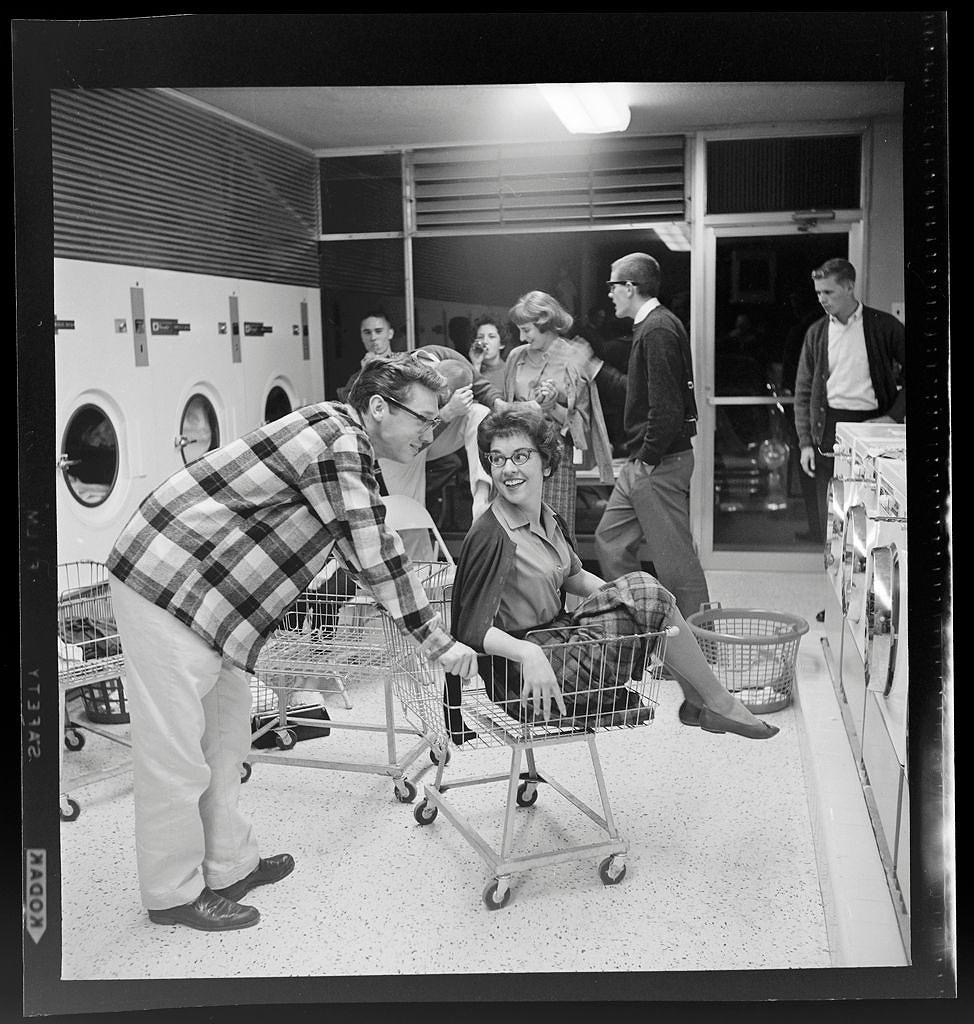
Jack Gould: Untitled (party in laundromat, woman being pushed in cart) (1957)
" … the perfect profession for me."
On these midsummer evenings, I like to sit in the garage with the roll-up door open, and watch. The scene before me, freshly painted siding boards poised on two by fours balanced atop old cat litter tubs, my pop-up paint shoppe, various roses and flowers, seems like a microcosm of my life. The Schooner's parked a little further down the driveway, laurel bush out-growing its space, the mock orange that refuses to bloom spreading out behind. The cats will pass through, stop for quick head scratches, then crawl beneath something and give themselves tongue baths. They'll watch, too.
This feels like the apotheosis of my Being.
Untouchables
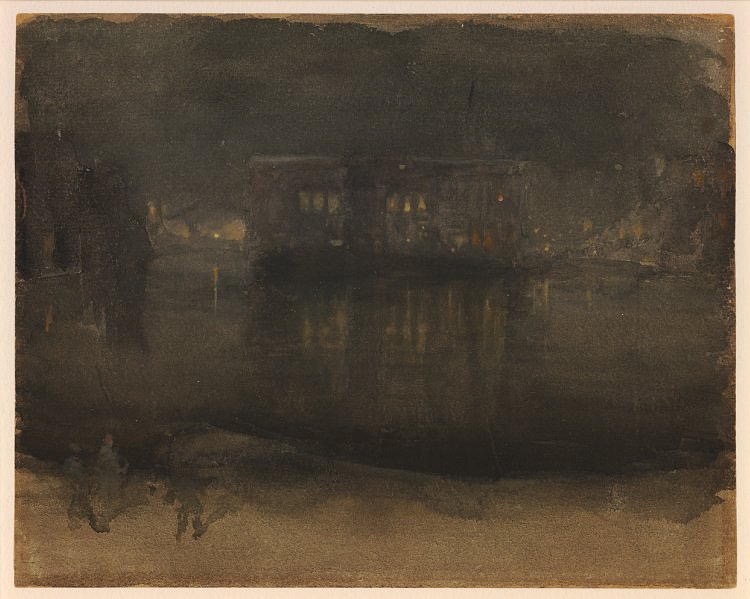
James McNeill Whistler: Amsterdam Nocturne (1883–1884)
"Just imagine how capable I'll one day feel …"
Now that The Muse and I have been back in The Villa for a year and a quarter, I'm noticing an increasing backlog of undone chores. Some appear to have become permanent and threaten to migrate out of Someday Likely To Get Done status into Untouchables, or apparent ones. These I will just consider to be features rather than problems, finished as they sit, however unsightly and indicting. Some will represent me coming to accept my limitations and others, my fundamentally lazy nature. A very few will permanently seem too daunting to ever seriously consider, bridges too far or too big of britches. However they became Untouchables, I will maintain them in that state with most of the dedication I also reserve for actually completing tasks. They will become as much a part of my identity as any actual accomplishment, that spot I can't see I never shave properly, the lucky shoes which will always look scuffed and worn and yet favorites. Idiot children.
I imagine that one day I might maintain a maintenance schedule as if I meant to maintain it.
OutOfTheBlue
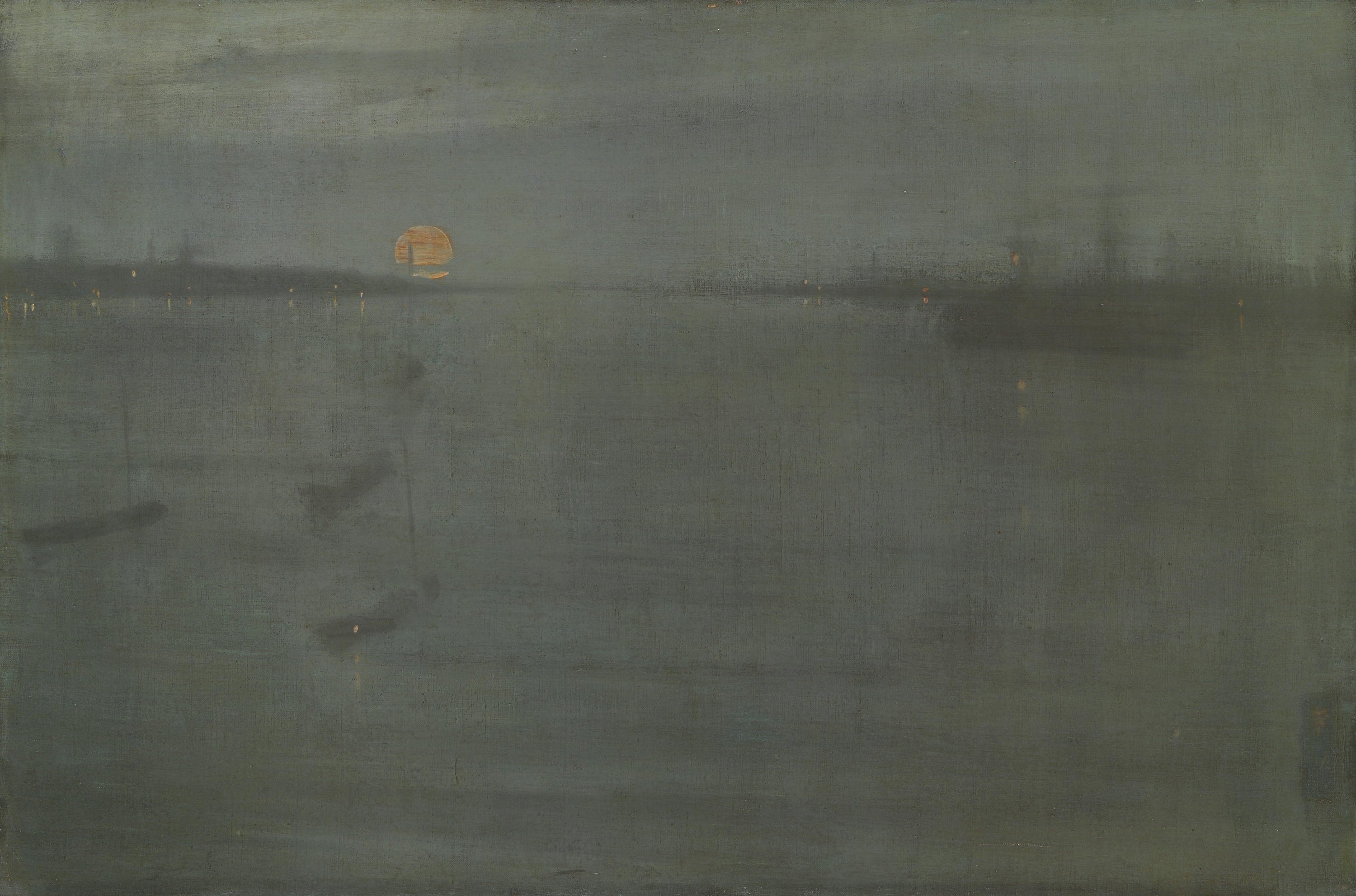
James McNeill Whistler: Nocturne: Blue and Gold—Southampton Water (1872)
" … an old acquaintance, an even older friend."
It should not be news to any of my frequent readers that I sometimes suffer through some blue periods. I can get down on myself and feel downright worthless, then spool into despair territory. Nothing all that scary, just part of any normal trajectory. I personally never trusted anyone who could endlessly keep it bright and sunny, optimistic even in the bleakest times. I preferred the more human leader rather than some statue to virtue, and strived to show that I was not made of stone or anything invulnerable. Still, I despise those days when I cannot find my way. I become as if I were three again, small and overwhelmed, unable to figure out how to play the games surrounding me. I often attempt to sleep through these times under the First, Do No Harm Rule. I'm no doctor, but I figure that sleep might just be the all-around best medicine for discouragement and depression.
Then, something happens. It almost doesn't matter what.
Misplaced
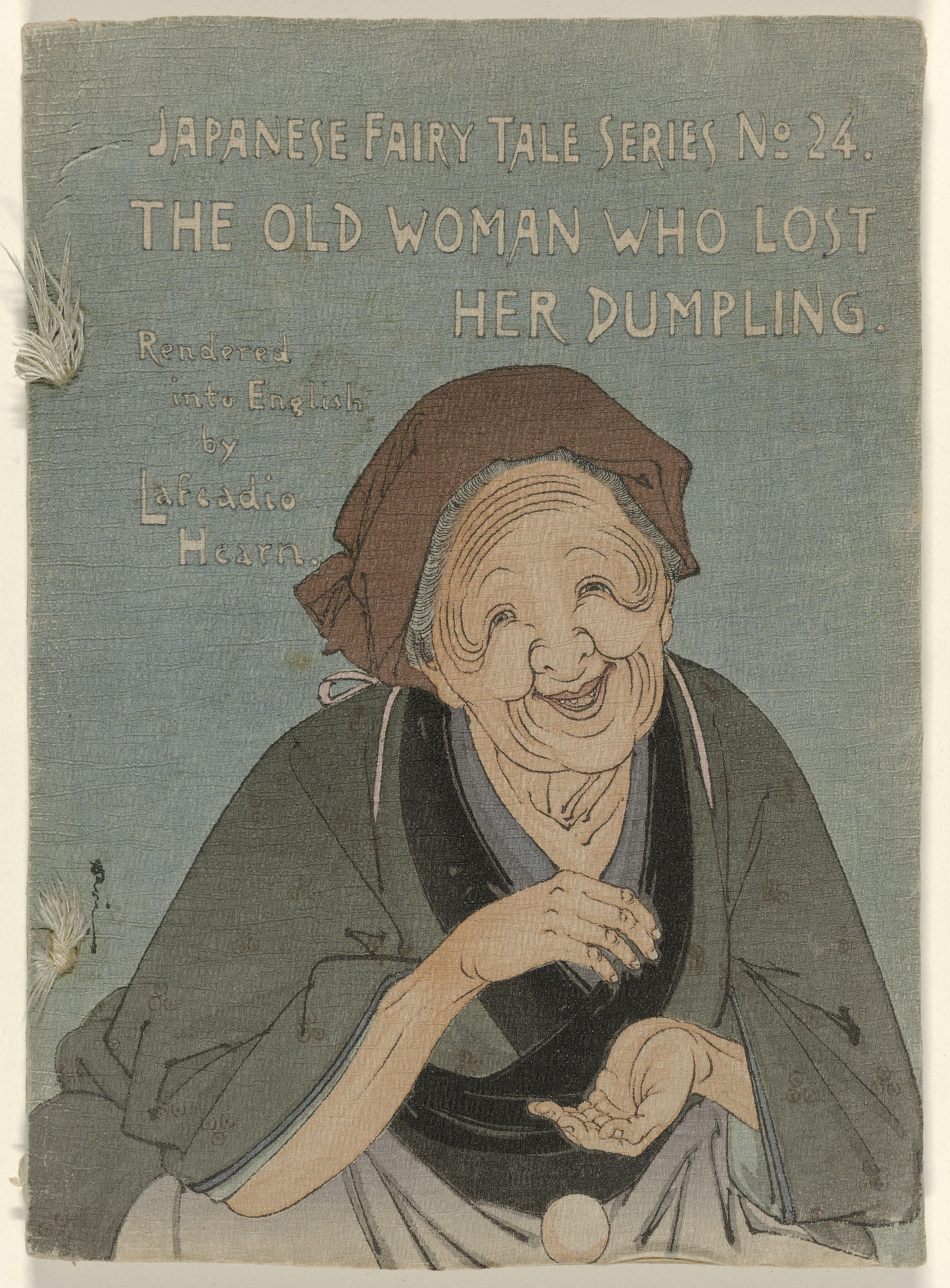
The Old Woman Who Lost Her Dumpling:
attributed used to Suzuki Kason (1902)
"I come to rely upon the understanding of kittens …"
©2022 by David A. Schmaltz - all rights reserved
Pardon me, but I seem to have Misplaced my identity. I clearly remember recently having one, though I can't quite recall when it slipped my grasp. I wonder how long this condition might last, with me an apparition of my former self, or is this the new and improved me I'd so long been aspiring to meet? This one might take some getting used to if, indeed, I could ever get used to this me, this great mystery.
We each seem to stand on a spot, a spot where we seem to belong. Most of us stand there long enough to swear that it belongs to us, our special space, our place. Then we might Misplace that spot. Maybe we're nudged aside or just fail to notice it slipping away until it's too late. Once it's gone, it's lost as sure as any tool we just sat down then could never find again. Lost as certain as the scent of last season's flowers. Lost as certain as the certainties of youth.
A certain confusion should settle in. Where I once just knew, I can no longer quite imagine. Where I once stood ground, I now seem surrounded by insubstantial air. I might have gone anywhere but I seem to have disappeared. I left no trace. I chased after myself until I was no longer clear which direction I was headed. Already lost, I complicated my position. No way back to anywhere from here.
The most curious thing about being might be that it's not constant. Physicists insist that this all resolves to waves, ebbs, flows, pulses, and currents. Things as well as their opposites, with much more dark matter than anything visible. Life has always worked like this, like motion pictures where we mostly don't quite see the tiny spaces also projected between each frame, except sometimes continuity shifts and we're suddenly seeing the spaces instead of the movie, the blanks that always came with the story. Then, it seems as if we've Misplaced something, a key, perhaps, or the story. We were supposed to have remembered something we never quite registered as knowing, being something we always just were before without even trying. Trying then resolves nothing. What manifested without effort cannot, by effort, manifest again.
I swear that almost everything just happens. Our solutions and our intentions and our dedications chase experience, imagining stories that probably never occurred. As long as I can muster a half-decent leaning into, I seem to make progress. It almost seems as if this universe demands no more than compliance. Keep moving and meaning might emerge. Keep standing and vision and perspective might be the reward. Think too much and one might notice their spot Misplaced, some significant unnamable missing. Then this mystery deepens. I come to rely upon the understanding of kittens, who seem to seek me out then, needing some extra attention, which might be the very last thing I have left to give anyone.
Concerting
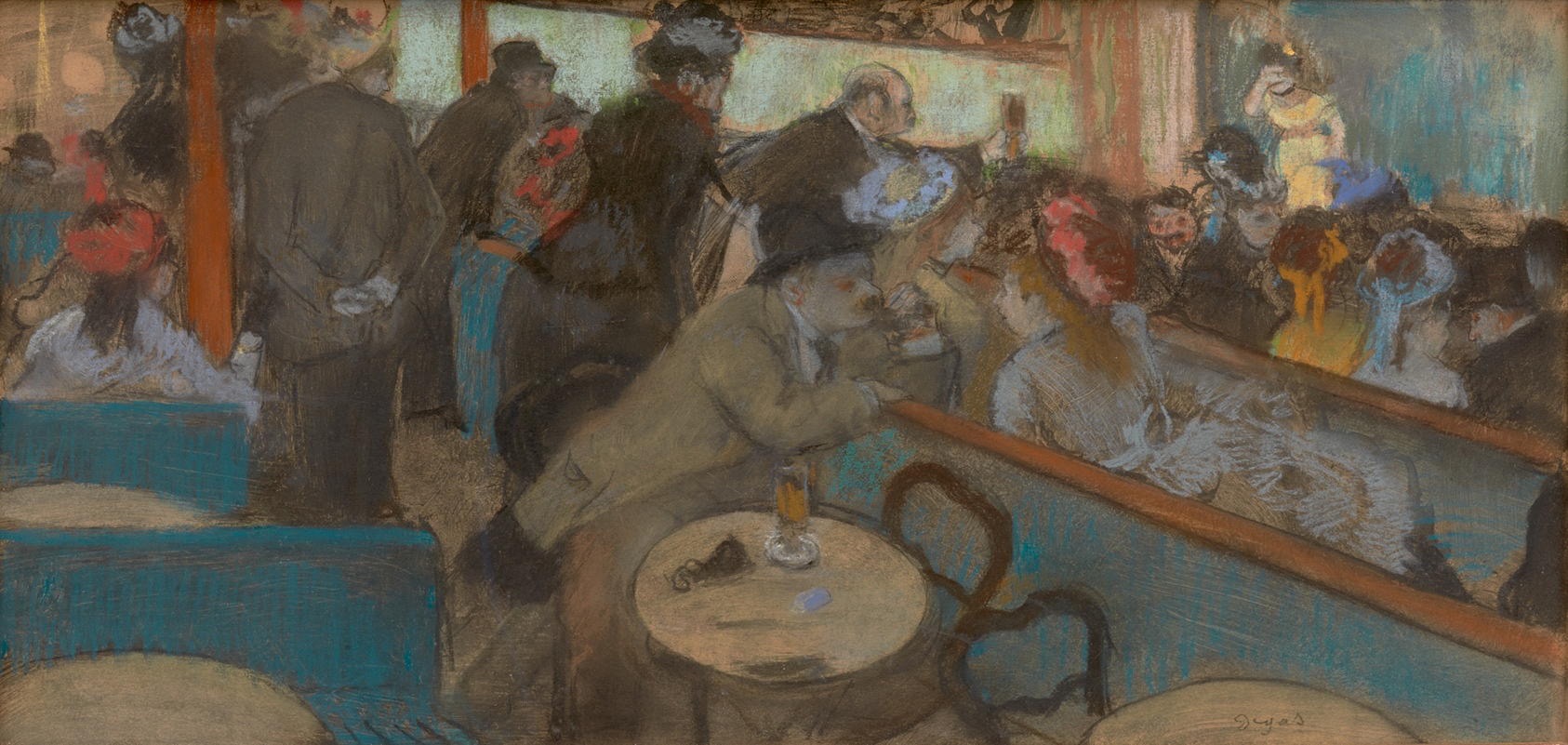
Edgar Degas: Café-Concert (The Spectators) (1876/77)
"I'd packed two pair, two for each ear …"
I avoid attending concerts. Now, of course, because of the Damned Pandemic, but before, due to the fundamentally uncontrolled nature of the performance and the audience. I never took to being herded around as if I were just another sheep in an unruly flock. I also try to avoid landing wherever crowds congregate, the parking hassles, the turnstile troubles, the behaviors I only ever see when there's a crowd surrounding me. I never learned how to behave in such venues, my reticence a reasonable result of simple lack of practice. The last concert The Muse and I attended, I spent the whole evening curled up in the fetal position, ear plugs ineffectively in, trying to avoid the caterwauling coming off the stage. Everyone else seemed delighted. I, perhaps alone in that audience, felt terrified by it; assaulted.
I think it remarkable as I watch other people show up with the right kind of chair, for only certain types of chairs are allowed into the open air arena.
MissingMeals
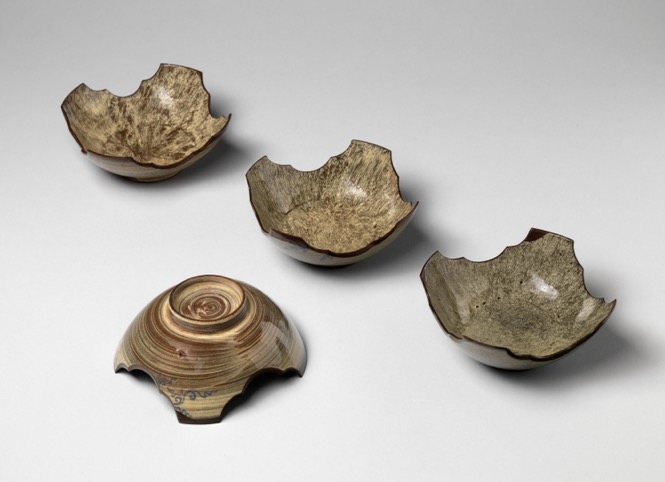
Unknown Japanese: Set of food dishes (mukōzuke)
(early 18th century)
"My work is my reward here …"
I measure engagement by how many meals I miss when working on something. I might just fail to notice when mealtime arrives or I might find myself so focused upon whatever I'm doing that I cannot quite face pulling away, and so meal time just slips by. Other times, I find myself indecisive, unable to imagine anything like a coherent meal arriving. Why bother? Meal breaks sometimes seem like a waste of my day. It's not like I'm in any danger of drying up and blowing away. For me, most meals seem optional. If lunchtime noses past about three-thirty, I'll usually just let it slide, deciding to let supper pick up the slack. Sometimes, I abandon supper, too, usually when I'm just too tuckered to bother. By the following morning, I might regain my appetite or I might find myself focusing in and away again.
Dining out long ago lost its allure.
Fictions

Piero di Cosimo: The Misfortunes of Silenus (circa 1500)
"Hell emerges in the absence of Fictions."
The world was going to Hell that Sunday morning, so The Muse and I decided upon a round-about route, one which might offer us a few hours beyond cell range, beyond what passes for civilization over on the West side of the mountains. We wondered if we might so easily escape the thrall. It might have been that after going to all the trouble to take the route less taken, we'd find a caravan of weary flatlanders also following our plan to escape up and out of the heat and crowds, but we were lucky and the roads were lonely. A few odd stragglers quickly passed us, leaving us to move at our own pace, to find our own cadence.
While the world went to Hell, we ascended into a Heaven of sorts.
Strangering
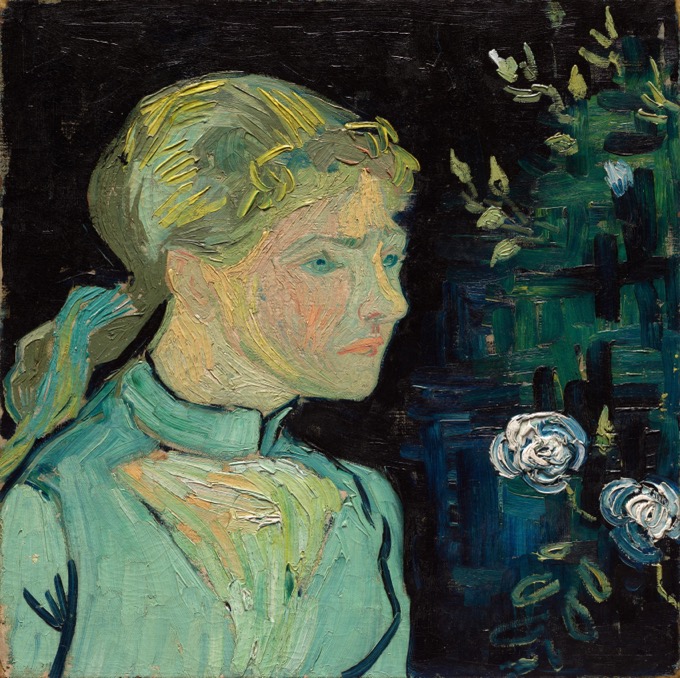
Vincent van Gogh: Adeline Ravoux (1890)
"I regain my attention …"
Other than passing through on the freeway, I'd never even thought to stop to see what might welcome me here, so I arrived without preconceptions, as a genuine stranger. This city could have been anywhere. I had no emotional attachments here. The waterfront attracted my eye, but I could not recall, if, indeed, I ever knew, the name of the bay. The city looked worn but worked over, as if considerable effort had been applied to prevent it from simply becoming derelict, with mixed results. This was clearly nobody's Disneyland. Its rough edges seemed prominent. I had never wondered about the history here, how it might have managed to turn out this way. I would be Strangering here within this mystery.
I much prefer to walk when Strangering, for driving moves me too quickly for me to see very much.
Hoteling
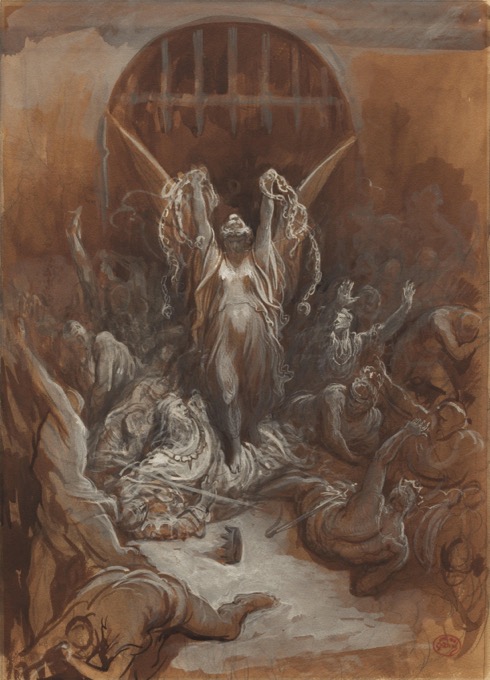
Gustave Doré: Liberty (c. 1865–75)
" … we still hold the instinct to survive … hospitality."
After two and a quarter years of housebound isolation, I find myself in a hotel room this weekend. I was once a frequent guest, traveling for business. One year, I managed to stay in more than one hotel room per week on average, and I stayed in a few of those rooms for more than a week, so I must have really been on the move that year. I became accustomed to the patterns and rhythms of modern Hoteling, which seem so different from the Grand Hotel tradition. No longer does one use the lobby as an extended sitting room, for instance, taking to an overstuffed chair to read or simply people watch. Modern hotel lobbies seem reserved only for transitions, for checking in and checking out and nothing else. They usually feature little furniture other than a front desk and a concierge stand. Everything's self service.
Hoteling's a kind of camping experience.
DashingOff

Fan Qi 樊圻: Album of Miscellaneous Subjects, Leaf 4 山水花鳥圖冊 (early 1650s)
"We all eventually become the genius of ourselves …"
My friend Franklin reported that he'd participated in some online gathering that garnered him more clients than any other single event in his career, over a hundred. He went on to complain that he'd been invited to participate late in the cycle and so had not prepared his presentation as carefully as he most certainly would otherwise have. He's usually more careful than that, painstakingly preparing, often, it seems, almost asymptotically, as in preparing almost to the point of never actually achieving 'prepared.' This time, though, starved of sufficient time, he hacked out a quick almost good enough contribution and was fortunate to garner more paying clients than ever before from a single presentation.
Had he had adequate time, there's really no telling how many more clients he might have found.
Suddenlied
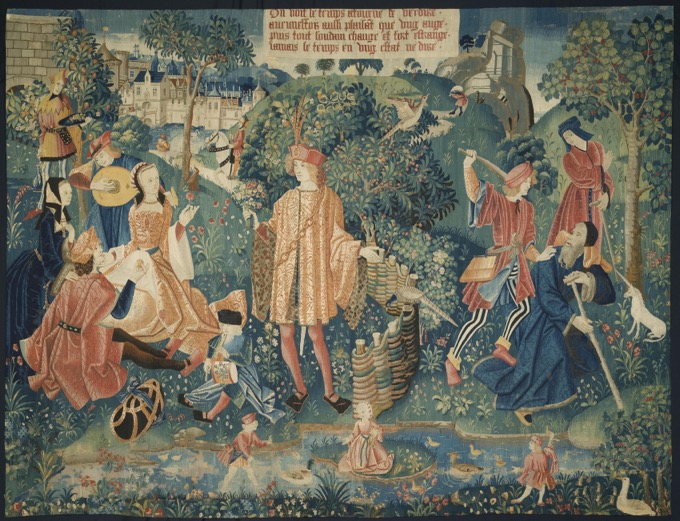
France, Lyon(?), early 16th century: Time (From Chateau de Chaumont Set) (1512–15)
"… usually expecting the unexpected …"
Occasionally, I'll decide to write about a topic only to discover that I'd already written a piece with that same title. As you doubtless noticed, I make up a fair number of my story titles by fiddling with otherwise serviceable words, trying to better fit them to my purpose. My blog software keeps me honest by disallowing duplicate titles, complicating my life if I inadvertently try to slip one by, requiring some messy searching and deleting to correct the oversight. This morning, I innocently attempted to write a story about Suddenlies, only to discover that I'd already covered that topic in a post from five years ago. I considered just reporting that story under the Againing banner, given that I've chosen repeating as my overriding notion this quarter. Then I decided that the very fact that this title came up twice might suggest that I'm dealing with a universal experience, a pattern notable for its subtle repetition, that I had just then been Suddenlied again.
As I said in the earlier story, things tend to continue unchanged until some suddenly appears.
Scaredy
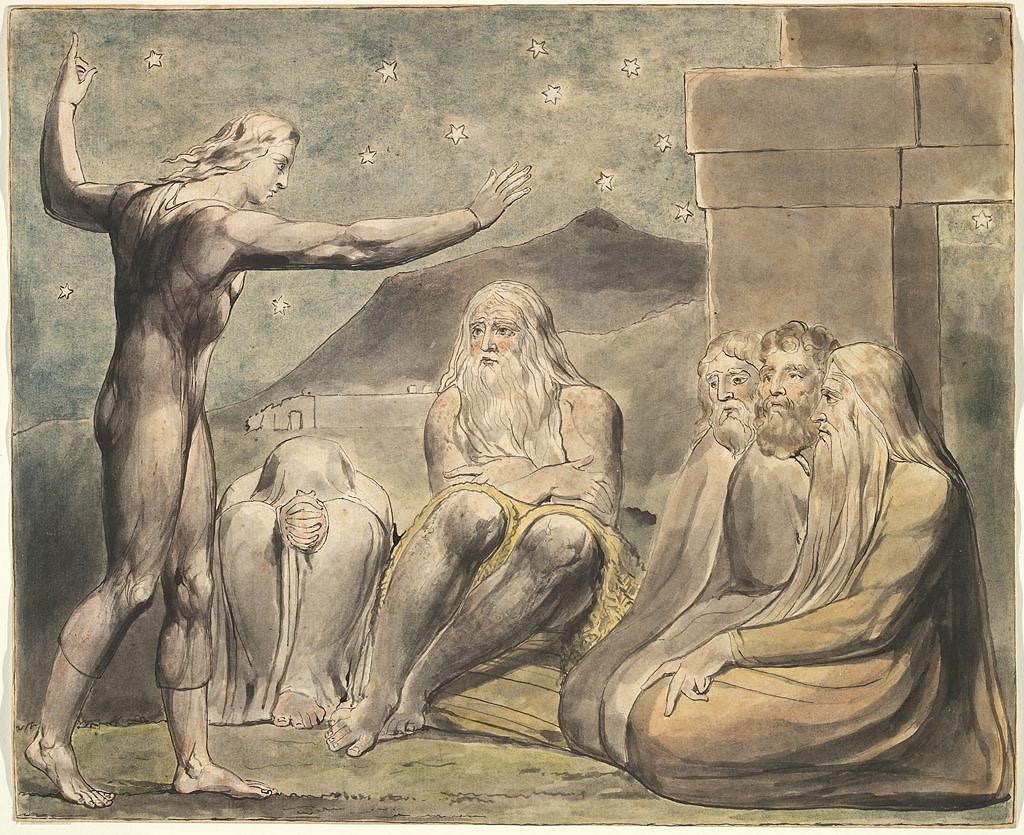
William Blake: The Book of Job: Pl. 12,
I am Young and ye are very Old wherefore I was afraid (1825)
" … some days I even manage to muster an appearance …"
I often feel afraid. It never takes much. The prospect of engaging in even the smallest activity can raise the hairs on the back of my neck, rendering me frozen for a spell. The serial insult of mounting the scaffolding some days drives me into an almost comatose state where I just cannot function. The Muse asks me if I'm alright, and I am alright, just cowering from another phantom. I eventually manage to face whatever dread presented itself and evaporate it by merely moving into it. Once I begin, whatever surface tension prevented my entry seems to disappear and I'm free to go about my activity, certain only that I've sidestepped calamity for then and that it might well return again tomorrow. I slink from place to place, mustering up either courage or foolhardiness in turn, never especially brave or foolish.
When I agreed to serve as a delegate to the state convention, I figured that I'd just attend virtually since the organizers in the party had touted that they'd designed a convention which would not discriminate against those unwilling to mingle inside a superspreader event.
Againing
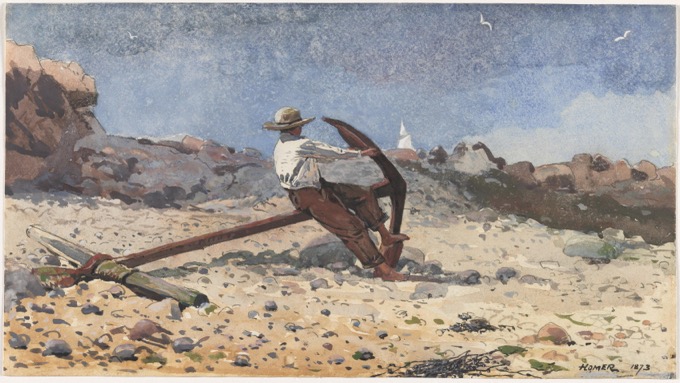
Winslow Homer: Boy with Anchor (1873)
" … that must be my manner of living."
For the eighteen hundred and twenty-sixth time in an almost unbroken chain, I sit down this morning to write yet another missive. I hold one intention prominent, the very same one I've held for each of the preceding mornings. I intend this one to be different than all of the others. A different title, a different focus, at least a slightly different perspective. Some insist that each of my postings, each little chapter, sums to pretty much precisely the same thing and that, while not exactly nothing, isn't ever very tightly focused, either. None of them convincingly concludes yet each seems to be up to something. I've explained before that I intend to project here a manner of living, not explaining how to live or even how to live better, but rather merely how it seems to be that I go about my living. I've previously established that I do not hold myself to be in any way an exemplar, an example of how one ought to go about living, going so far as to insist in one collection of stories just how Clueless I've always been. My most prominent purpose seems to be exposition.
That said, I also write my stories to remind myself what it is that I'm doing.


